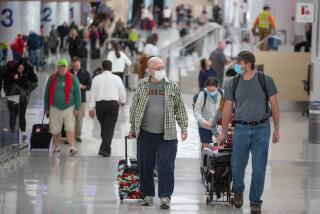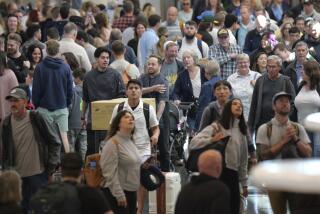Harvey causes airlines to delay or cancel more than 12,000 flights
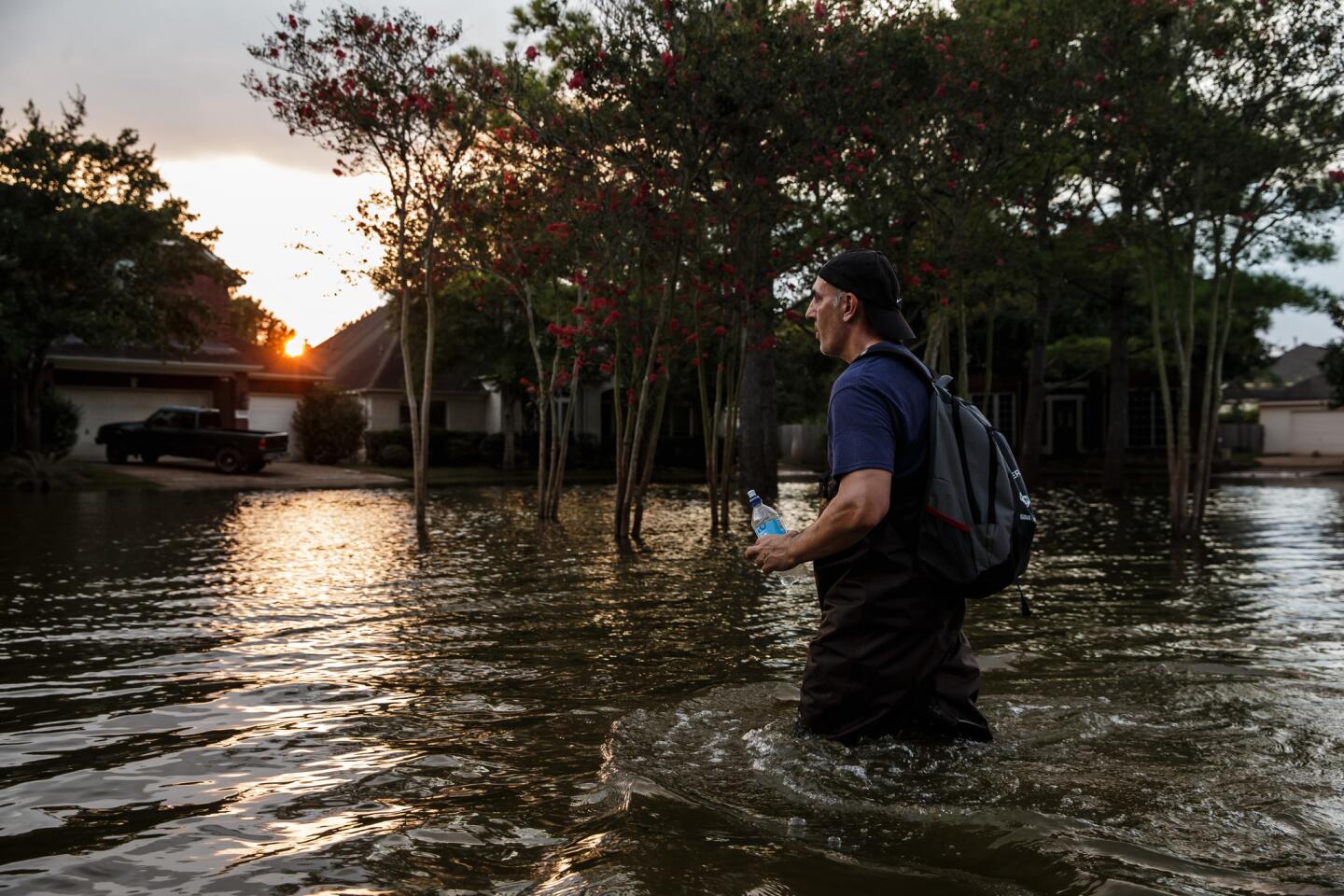
Samir Novruzov wades through water to get to a vehicle after spending the day clearing out his flooded home in Katy, Texas.
(Marcus Yam / Los Angeles Times)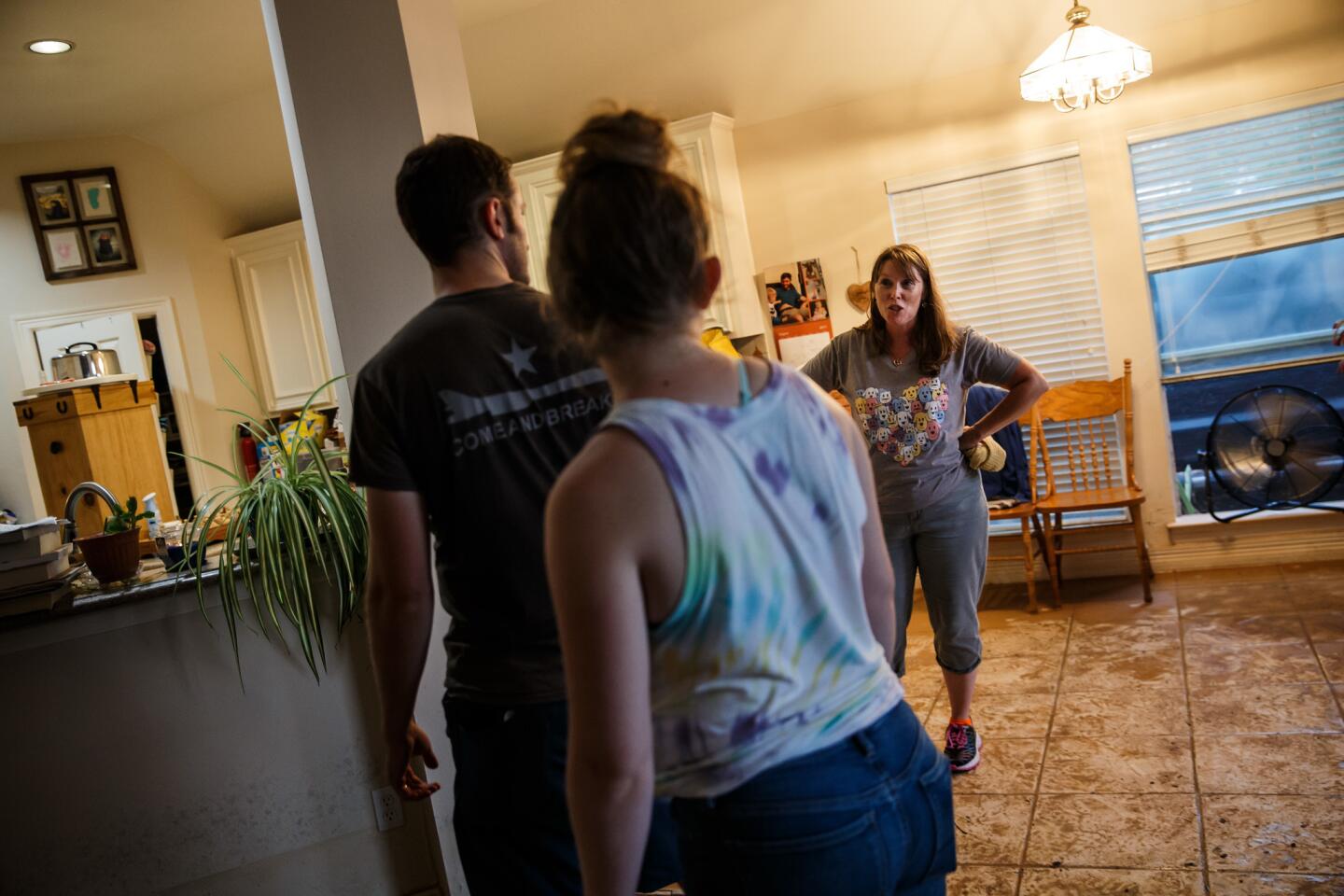
Melissa Teague, right, instructs her children Andrew and Emily as they clear out their flooded home in Katy, Texas, on Monday.
(Marcus Yam / Los Angeles Times)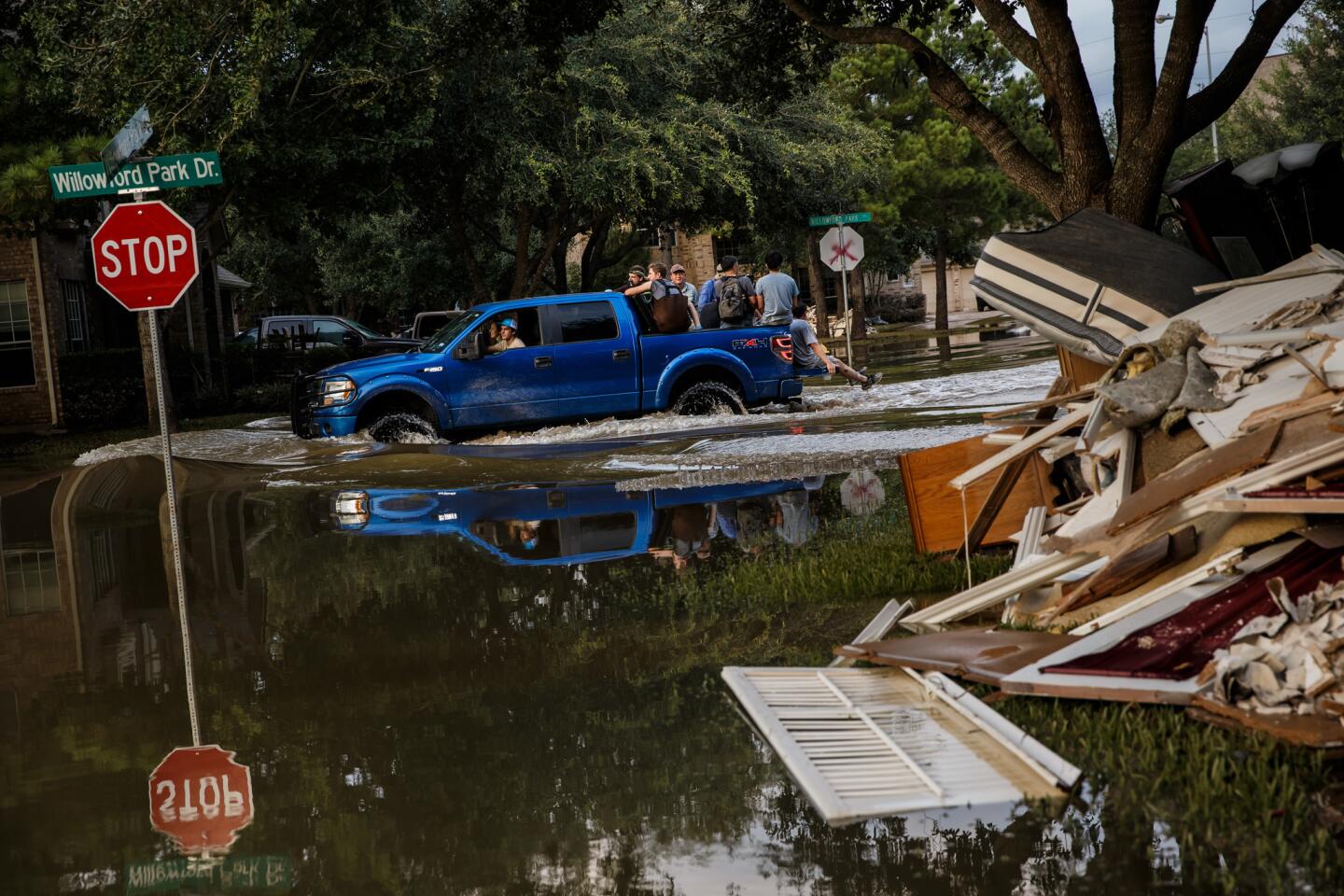
People ride through floodwaters in Katy, Texas.
(Marcus Yam / Los Angeles Times)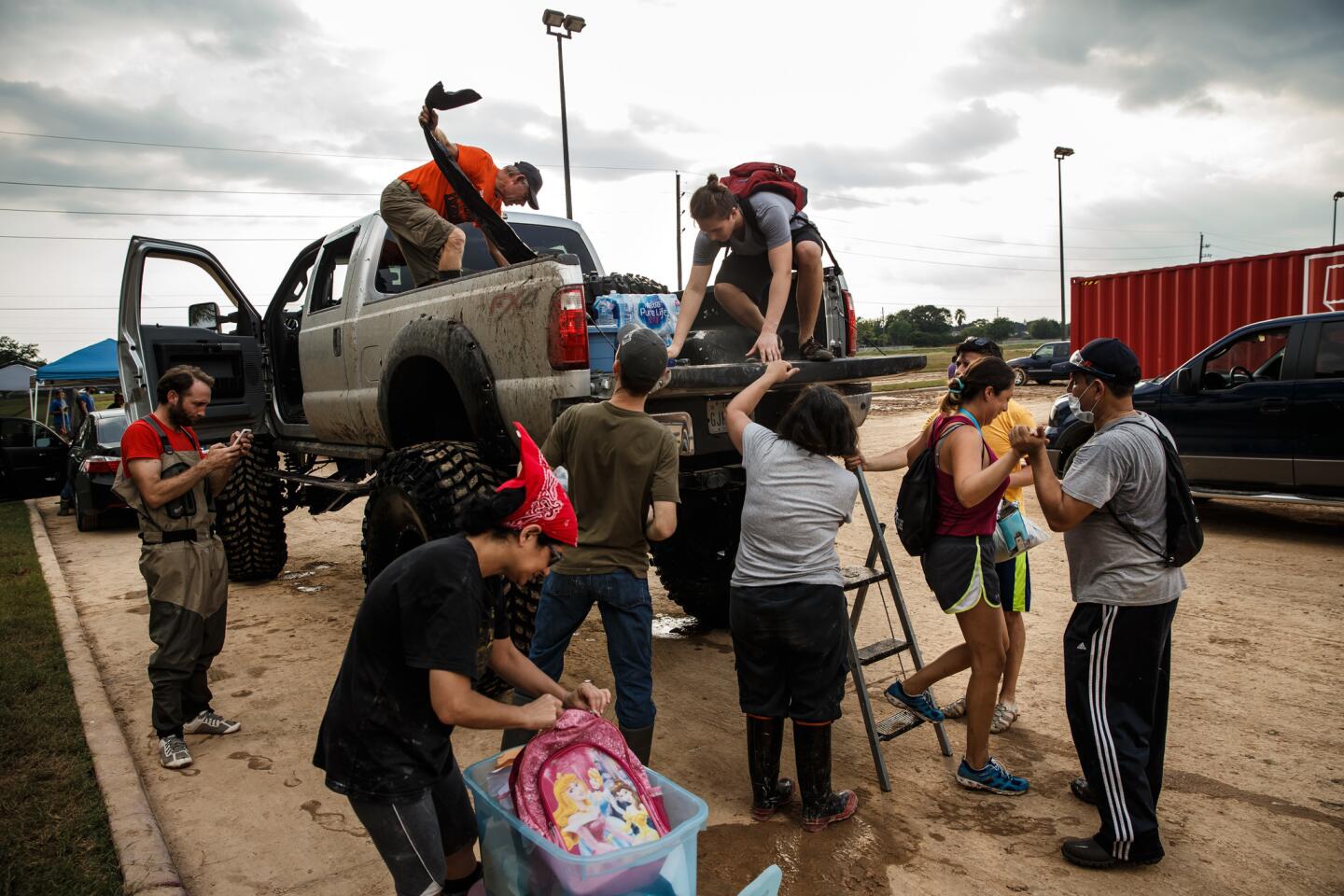
People hop off Chris Ginter’s truck as he helps ferry residents around Katy, Texas.
(Marcus Yam / Los Angeles Times)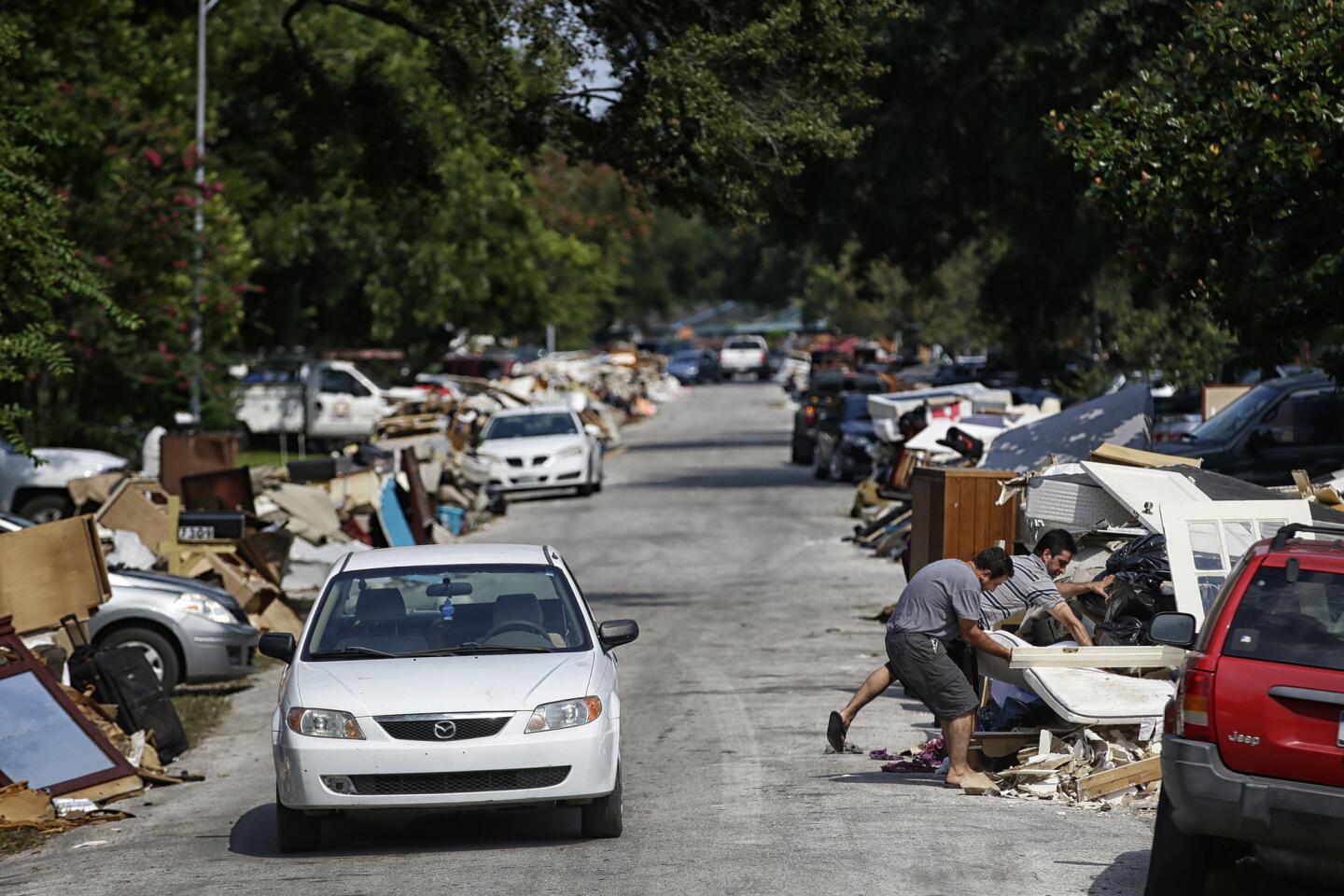
Two men collect a disposed mattress as residents in the Trinity/Houston Garden area of northeast Houston gut their flooded homes.
(Robert Gauthier / Los Angeles Times)
Wayne Christopher, center, weeps as his wife, Helen, looks on during a Sunday service at First United Methodist Church in Dickinson, Texas.
(Marcus Yam / Los Angeles Times)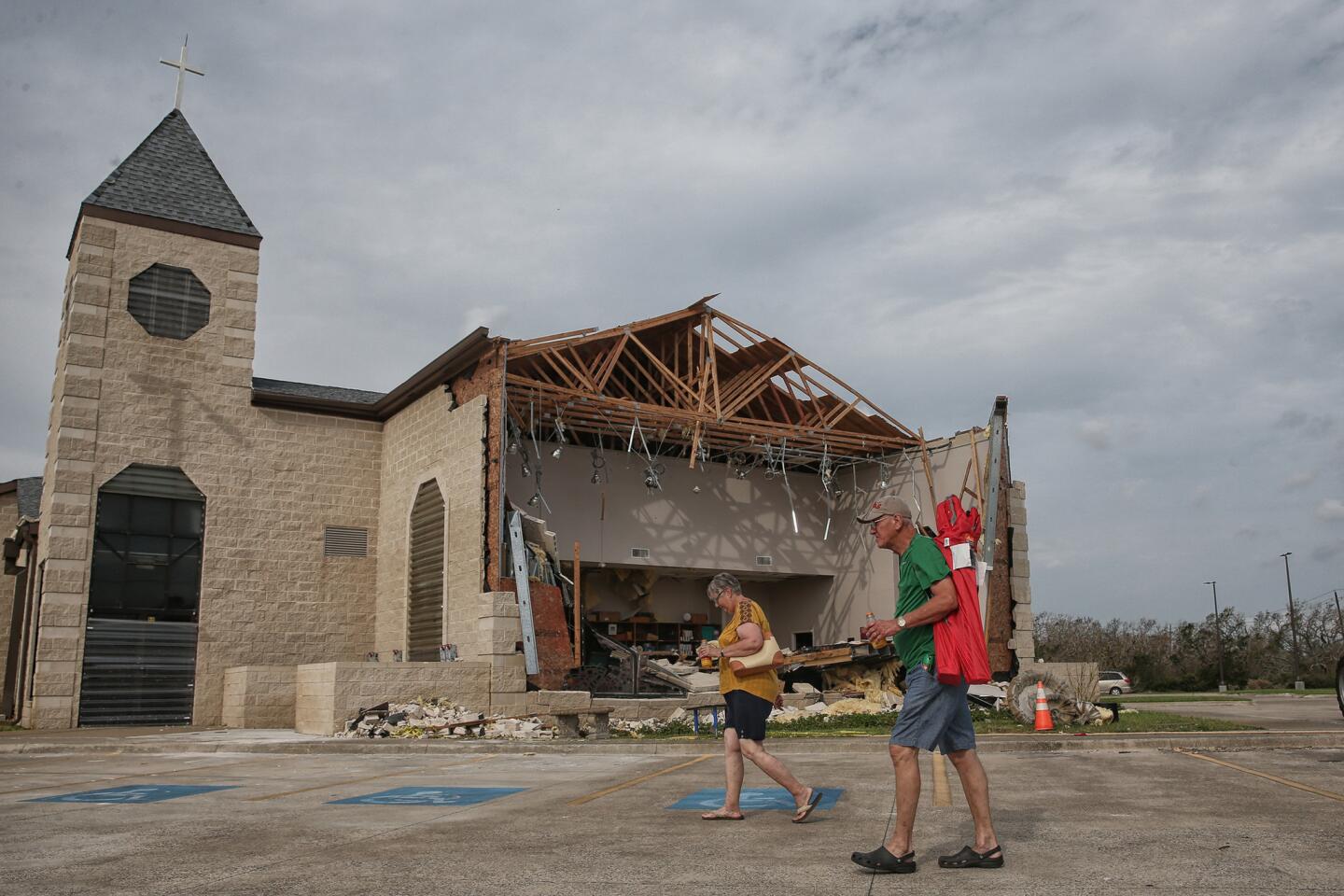
Hurricane Harvey severely damaged the First Baptist Church in Rockport, Texas. Worshipers on Sunday brought their own chairs to take part in an outdoor service.
(Robert Gauthier / Los Angeles Times)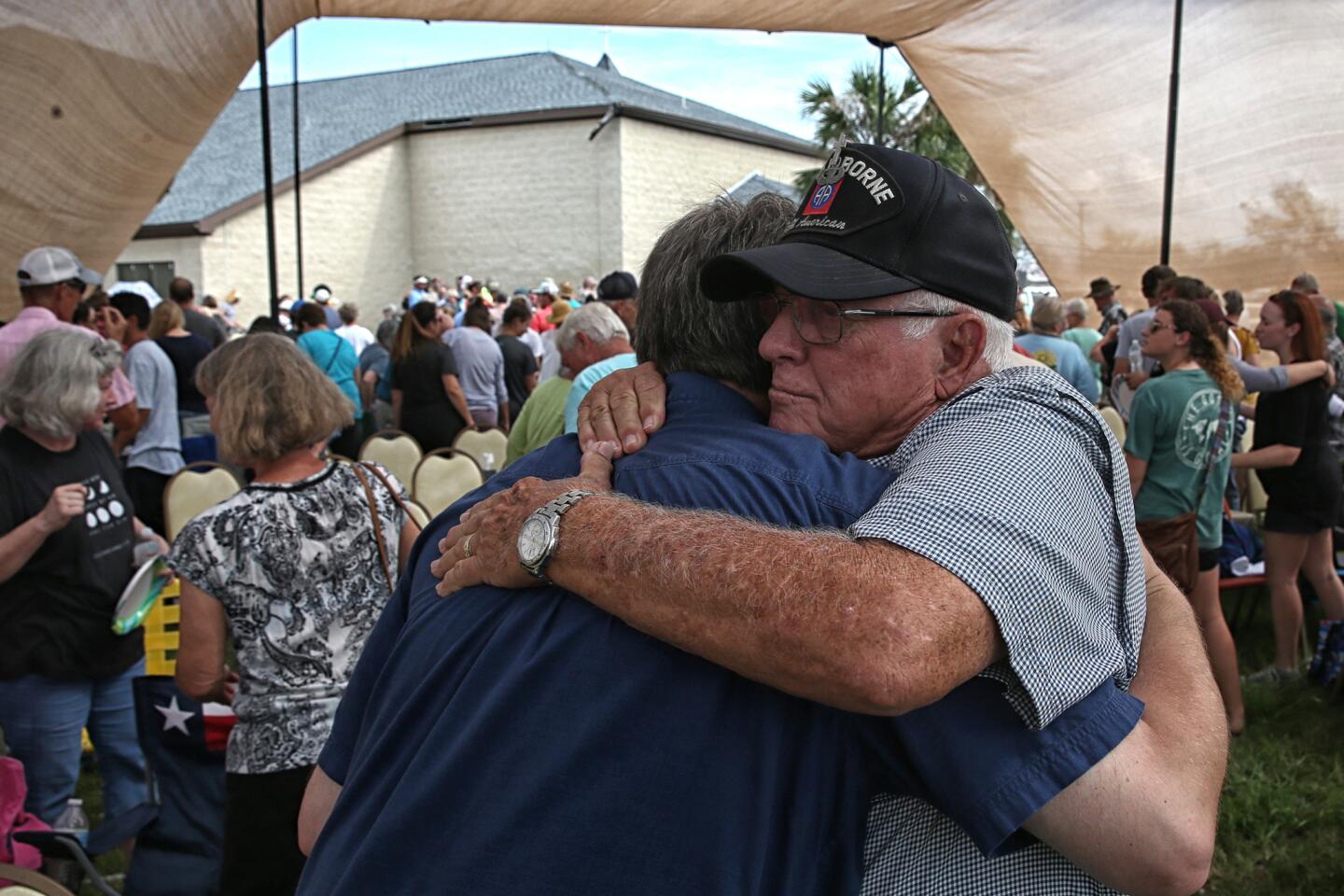
Ken Garrett, right, hugs Pastor Jordan Mims after they both delivered prayers on the grounds of the First Baptist Church in Rockport, Texas.
(Robert Gauthier / Los Angeles Times)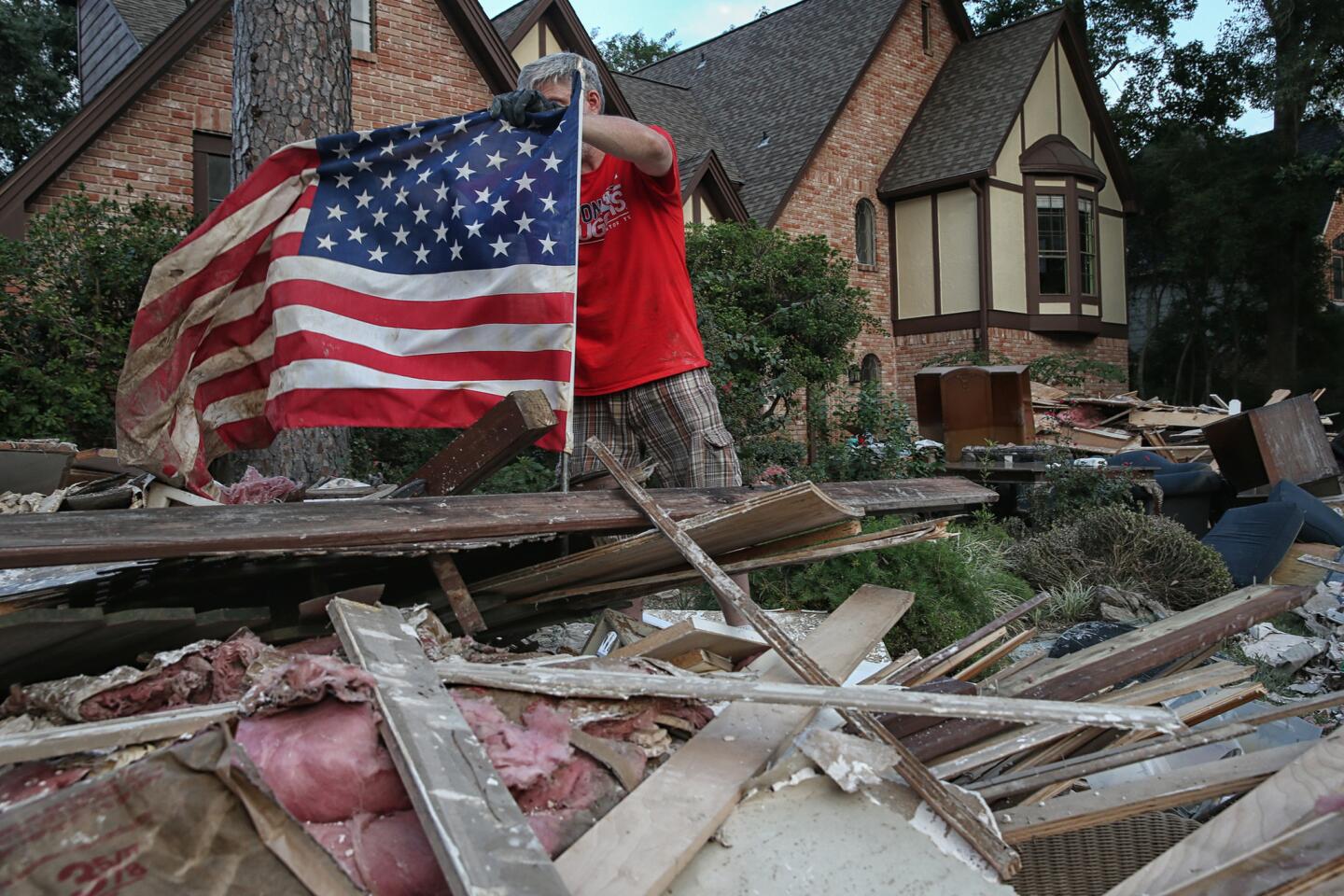
University of Houston law professor Johnny Buckles props up an American flag on the debris pile from his flood-damaged home in the Kingwood area of north Houston.
(Robert Gauthier / Los Angeles Times)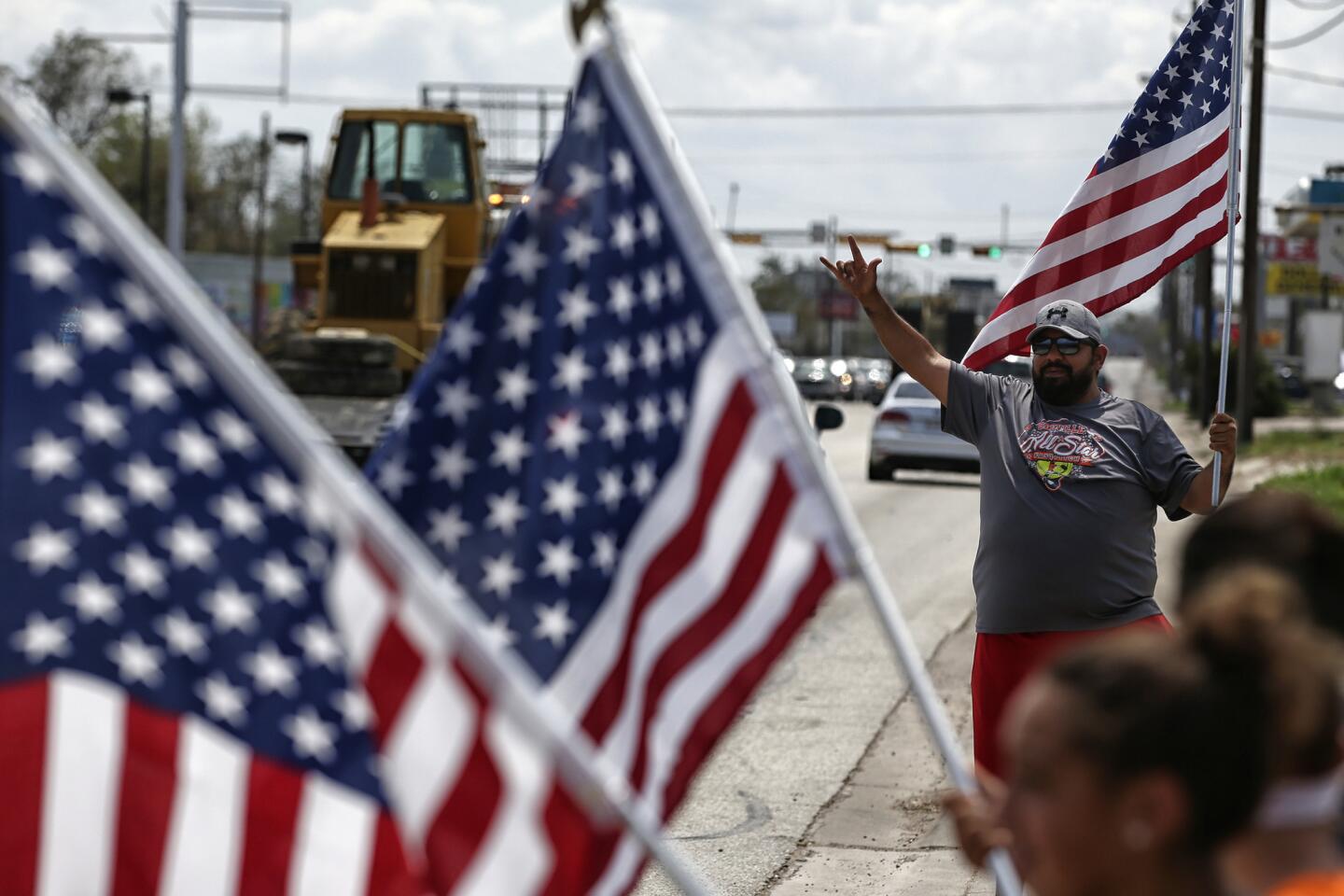
Jose Esquivel flags down motorists to visit a parking lot full of donated clothes, supples, water and brisket in Refugio, Texas.
(Robert Gauthier / Los Angeles Times)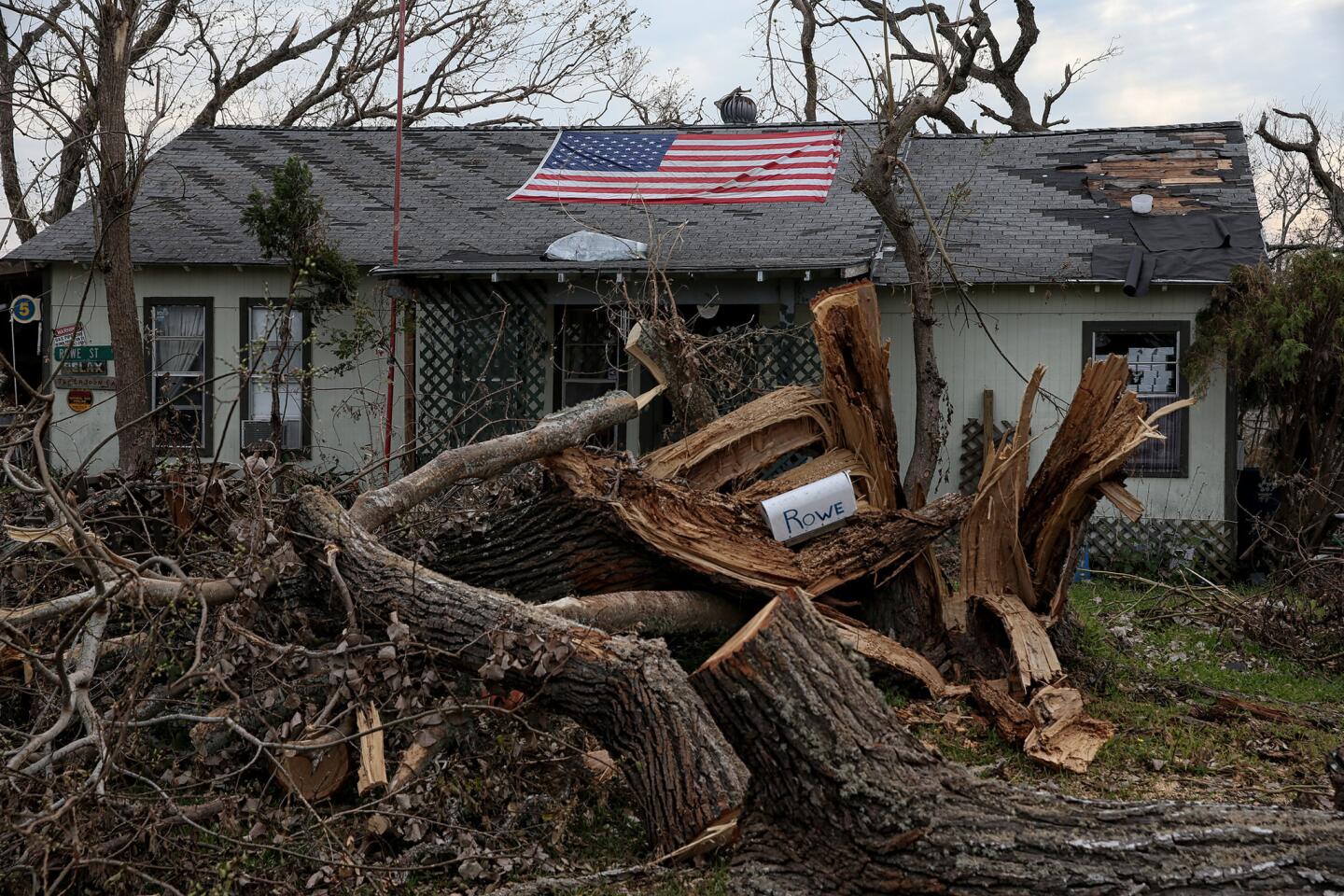
Despite heavy damage and no electricity, a homeowner displays his patriotism while clean up and recovery efforts continue in his devastated neighborhood of Rockport.
(Robert Gauthier / Los Angeles Times)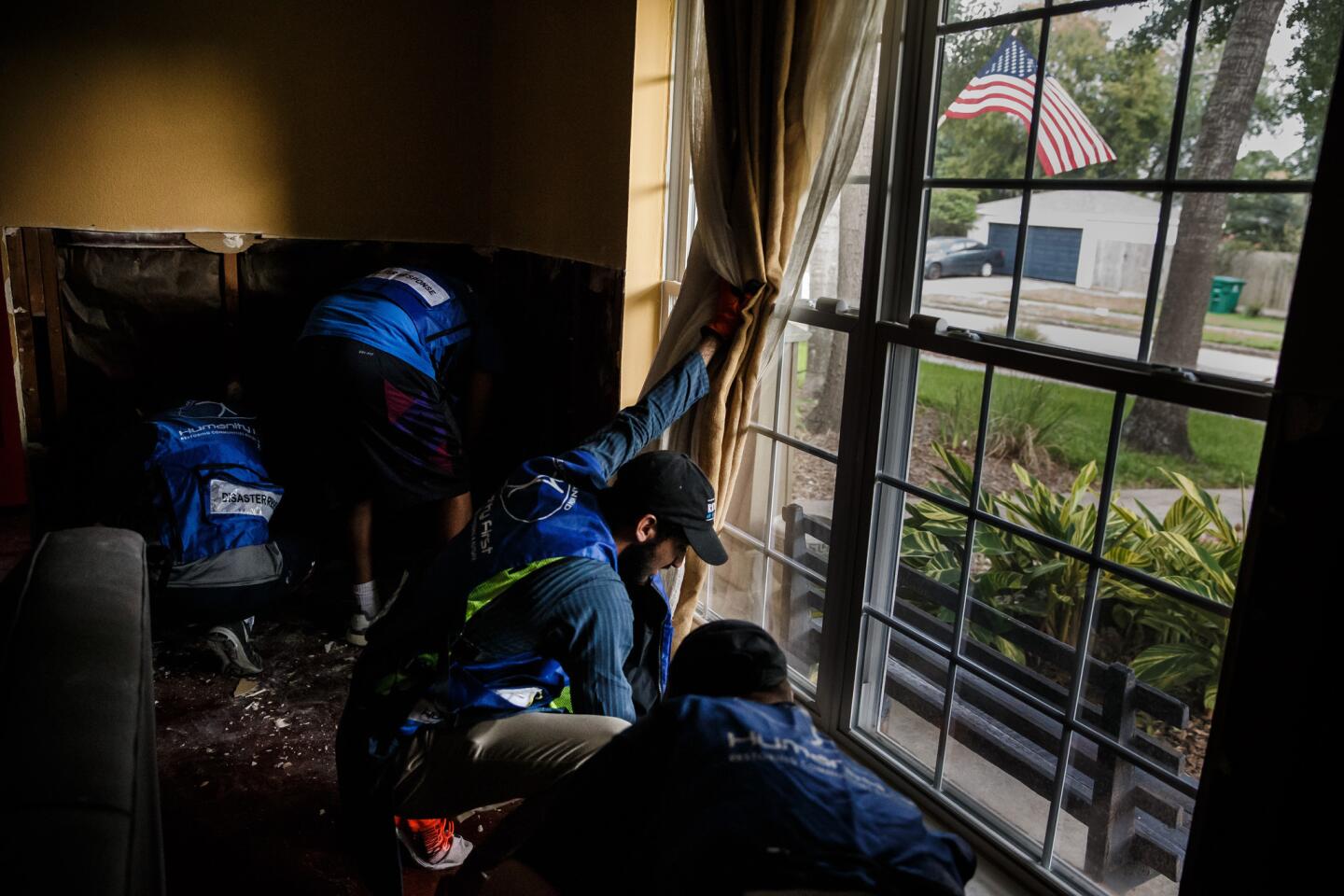
Volunteers from the Ahmadiyya Muslim Youth Association, Yusuf Seager, from left, Rahib Ahmed, Rahman Nasir, and Khalil Nasir help tear out drywall damaged by floodwater in the Westbury neighborhood in Houston.
(Marcus Yam / Los Angeles Times)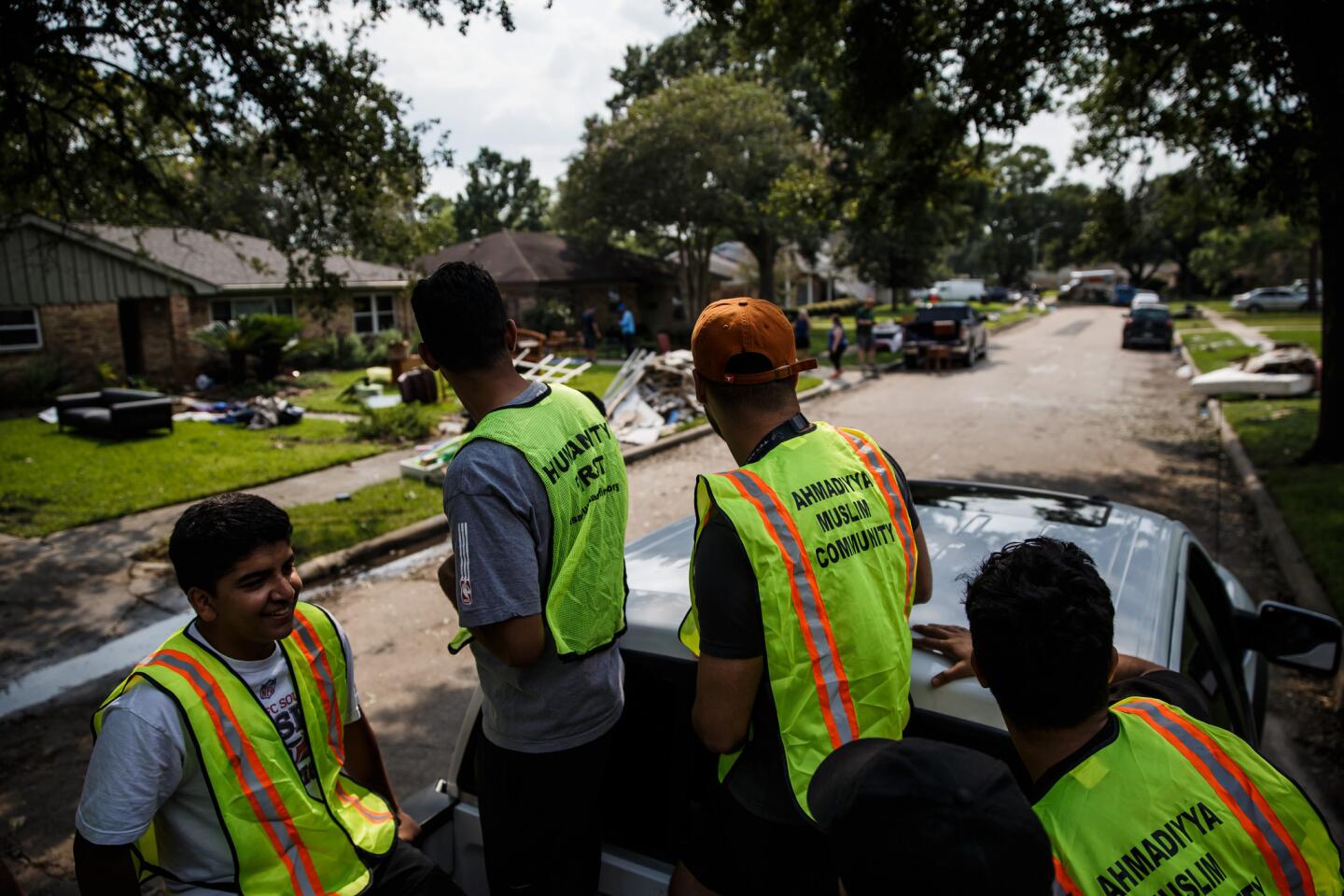
Volunteers from the Ahmadiyya Muslim Youth Association help residents of the Westbury neighborhood in Houston clear debris from their homes. It is also the Islamic holiday of Eid-ul-Adha. (Marcus Yam / Los Angeles Times)
(Marcus Yam / Los Angeles Times)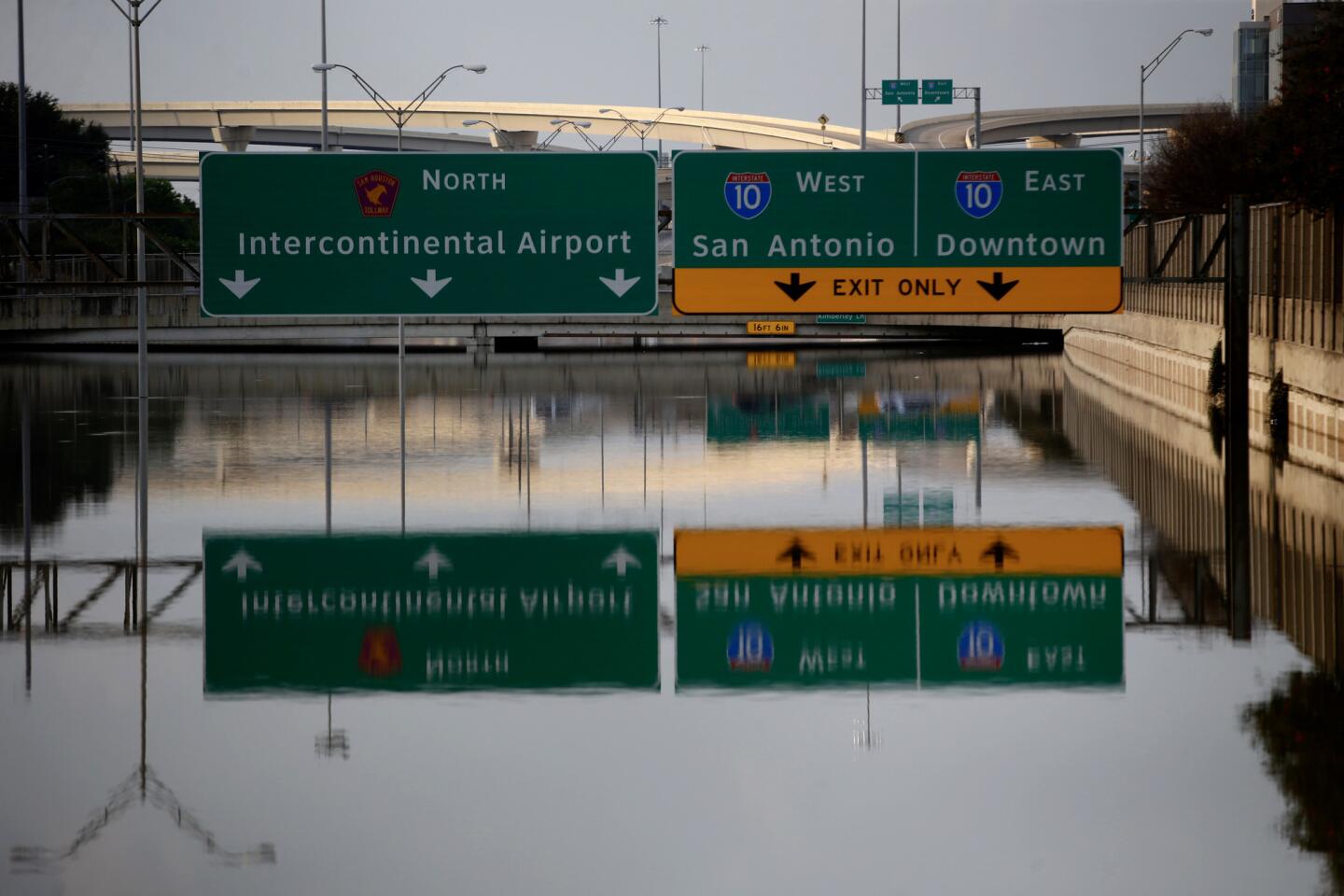
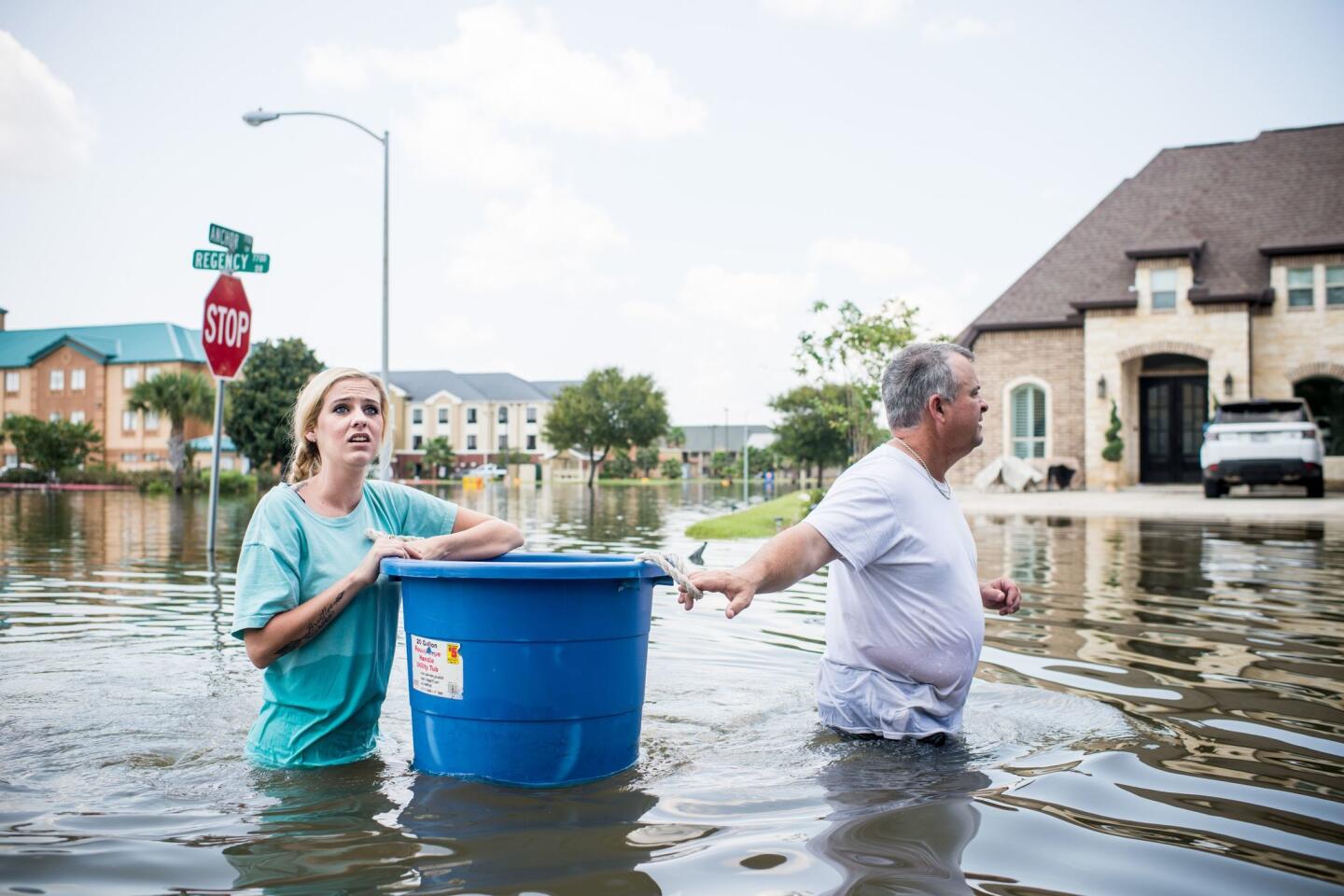
Jenna Fountain and her father Kevin carry a bucket down Regency Drive to try to recover items from their flooded home in Port Arthur, Texas on Thursday.
(Emily Kask / AFP / Getty Images)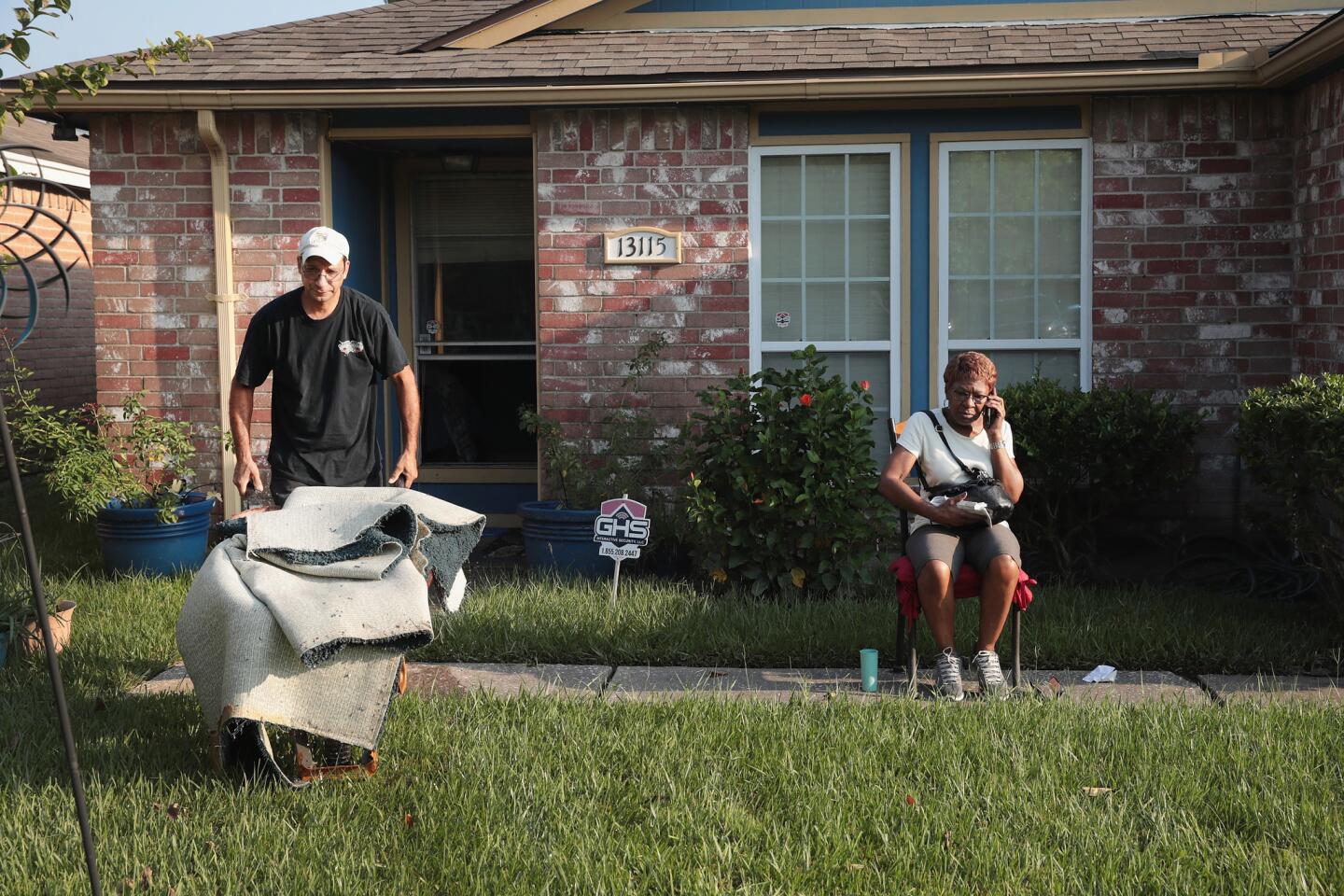
Lillie Roberts talks with family members as contractor Jerry Garza begins the process of repairing her Houston home on Friday.
(Scott Olson / Getty Images)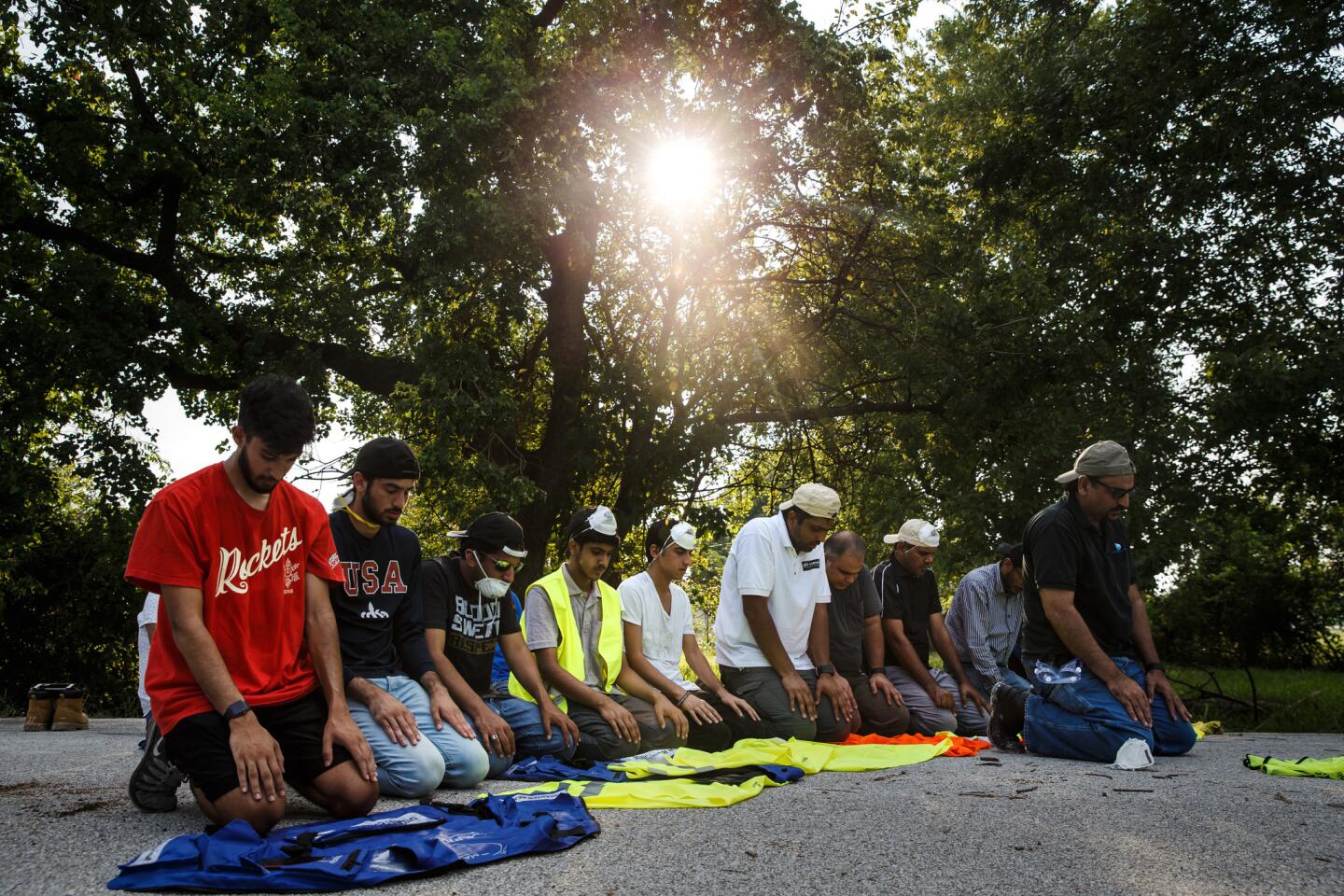
Volunteers from the Ahmadiyya Muslim Youth Association to perform holy prayer as they help local residents in the Kashmere Gardens area of Houston clean out their flooded homes.
(Marcus Yam / Los Angeles Times)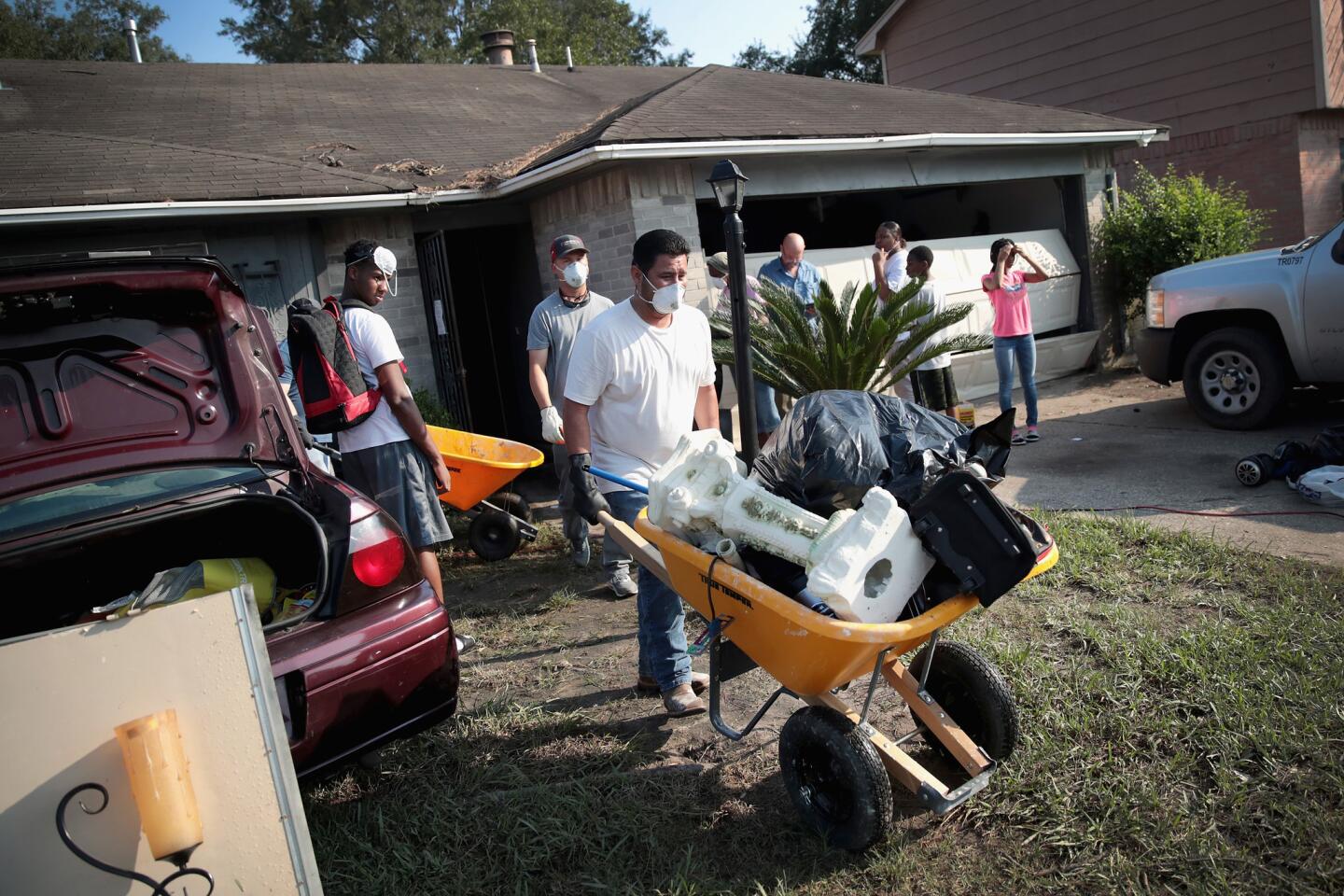
Volunteers assist Cornell Beasley with repairs to his damaged home in Houston on Friday.
(Scott Olson / Getty Images)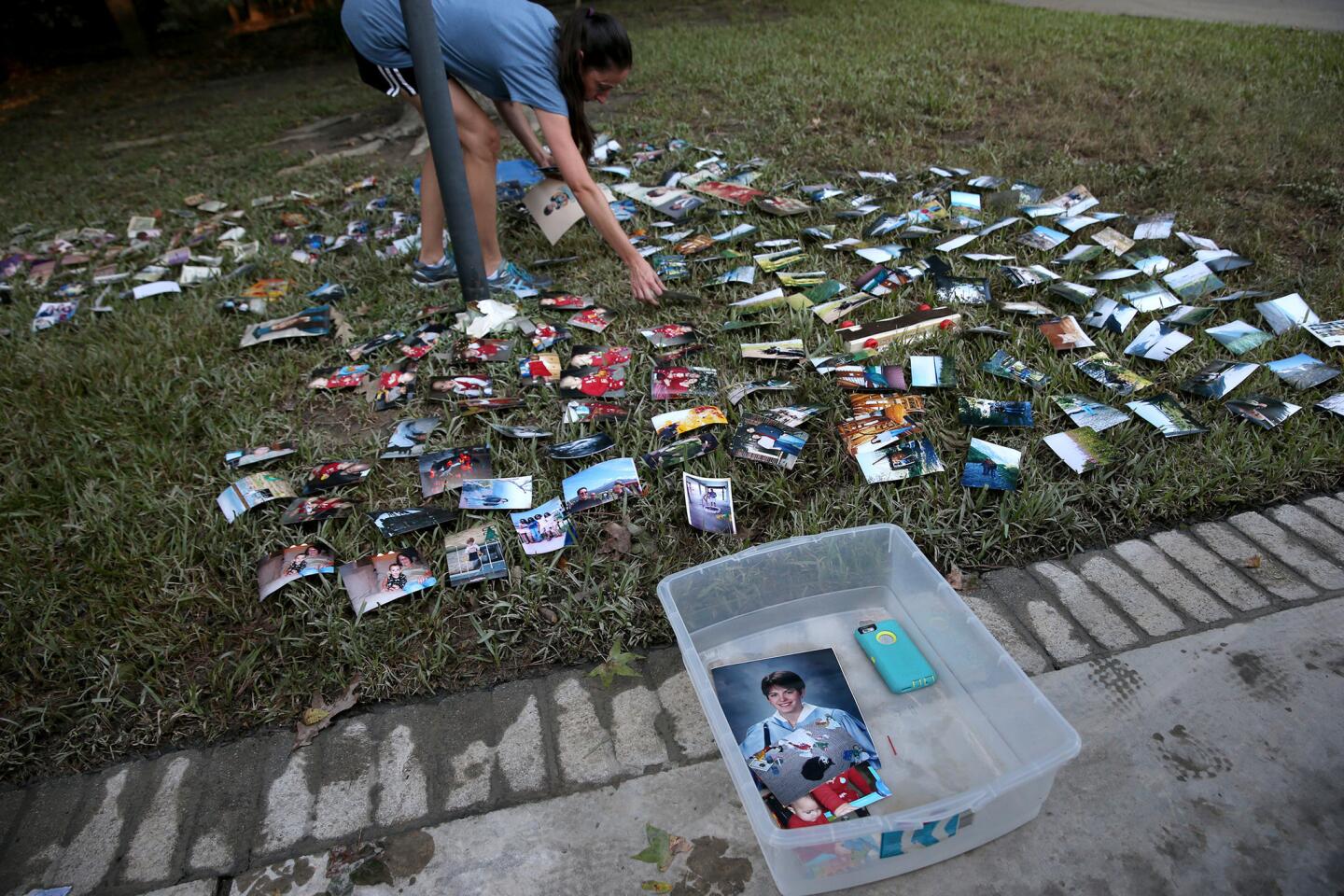
Katie Estridge organizes hundreds of soaked family photographs on the front lawn of her father’s home in northeast Houston.
(Robert Gauthier / Los Angeles Times)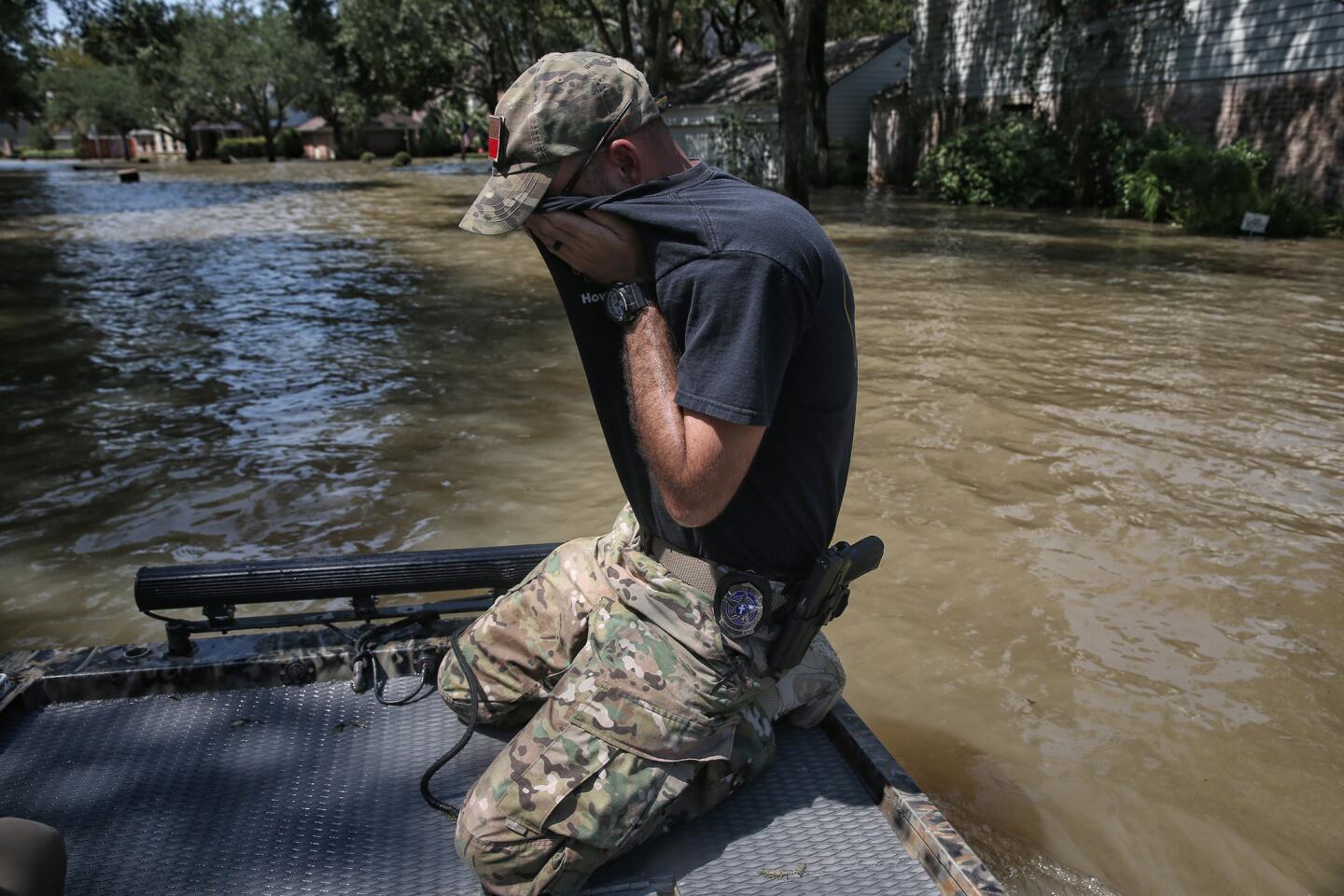
Wes Higgins wipes sweat from his face after spending five days patrolling flooded Houston neighborhoods in his boat. Higgins, from Knott, Texas, organized a volunteer team of 10 boats to help Houston residents.
(Robert Gauthier / Los Angeles Times)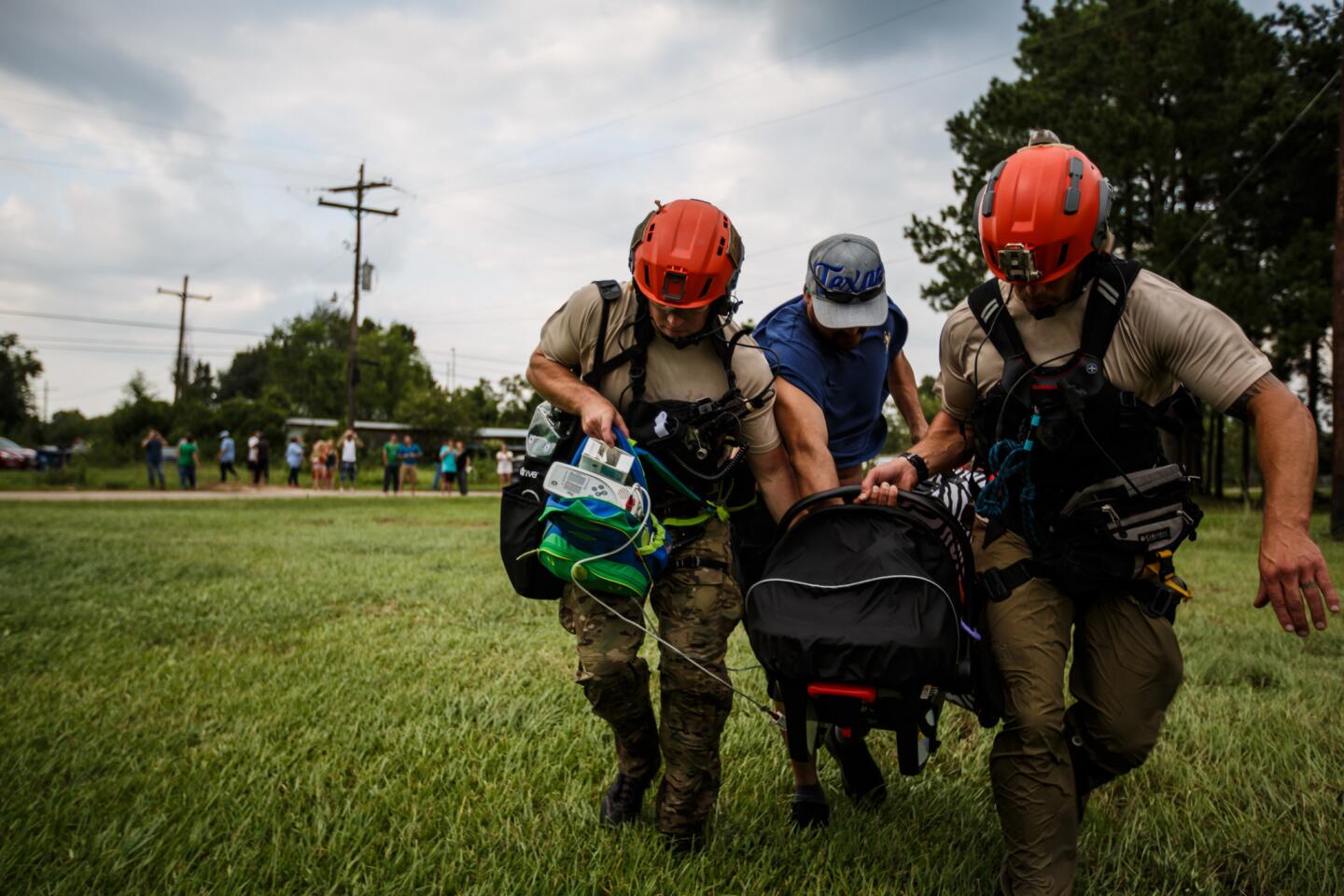
Members of the California Air National Guard 129th Rescue Wing, Senior Airman George McKenzie, left, and Master Sgt. Adam Vanhaaster, right, help a man carry his infant, who has a serious medical condition, to a hospital in Orange, Texas.
(Marcus Yam / Los Angeles Times)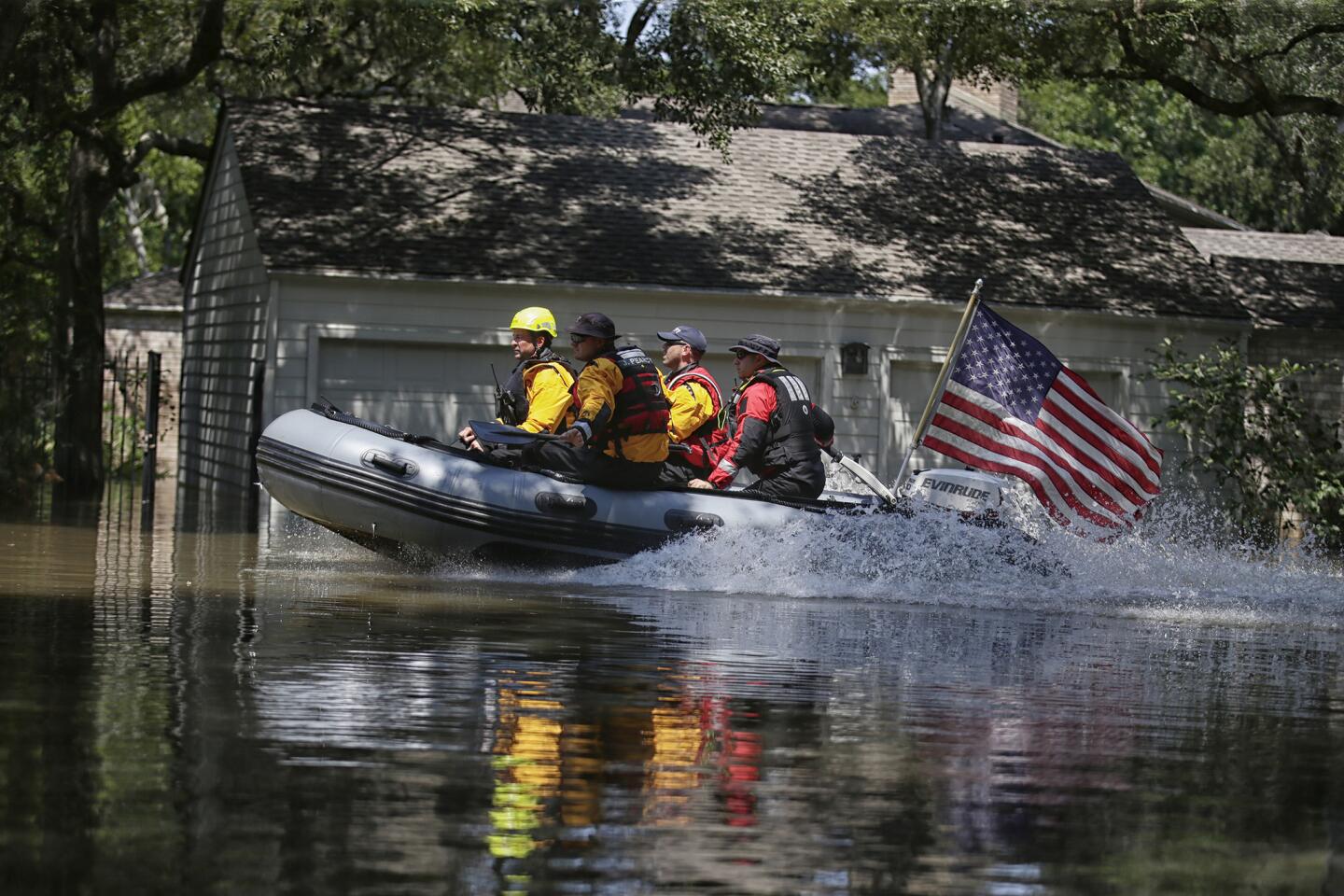
A search-and-rescue crew speeds along Maple Rock Drive in west Houston looking for flood victims.
(Robert Gauthier / Los Angeles Times)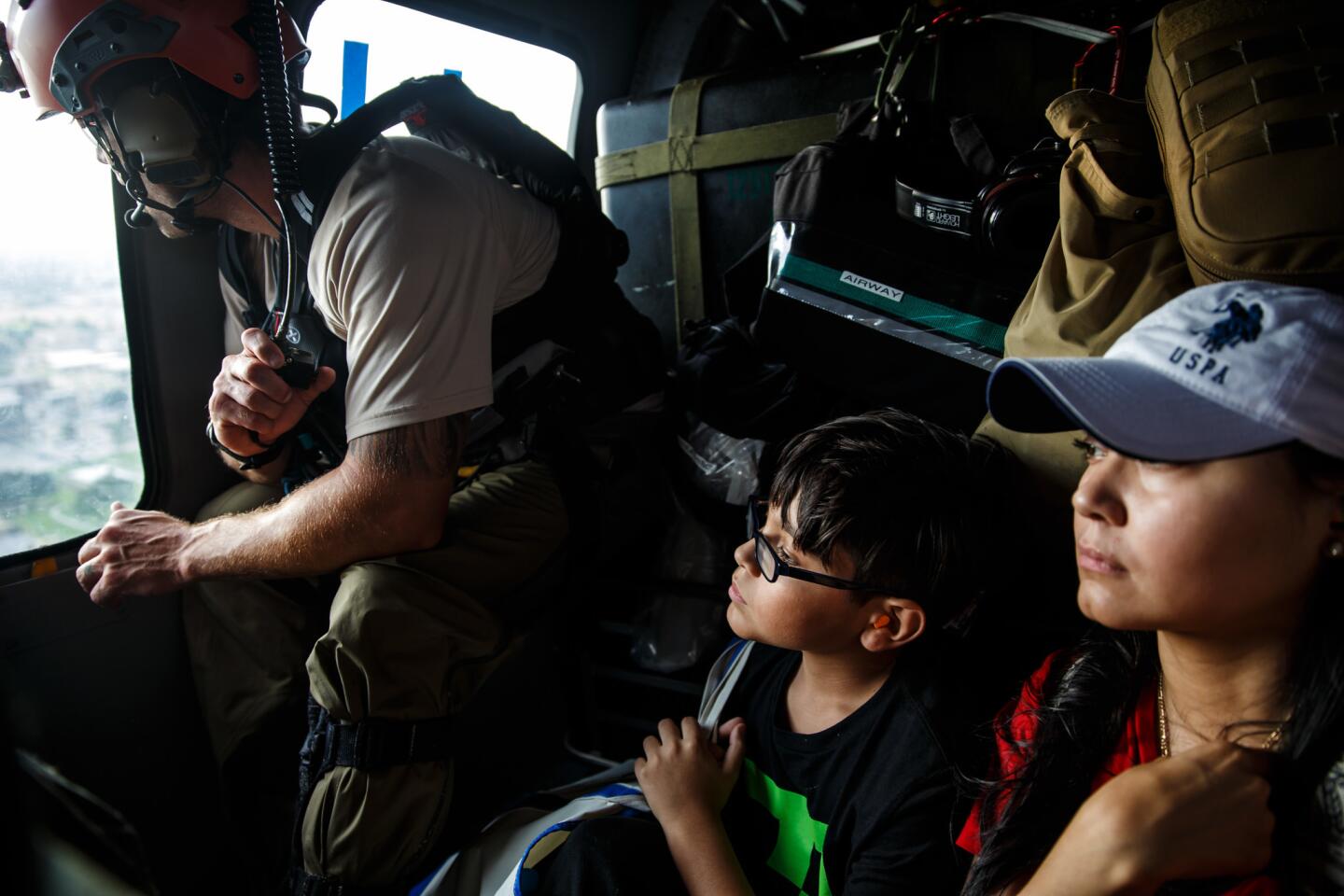
A woman and a child are among those rescued by California Air National Guardsmen in Lumberton, north of Beaumont.
(Marcus Yam / Los Angeles Times)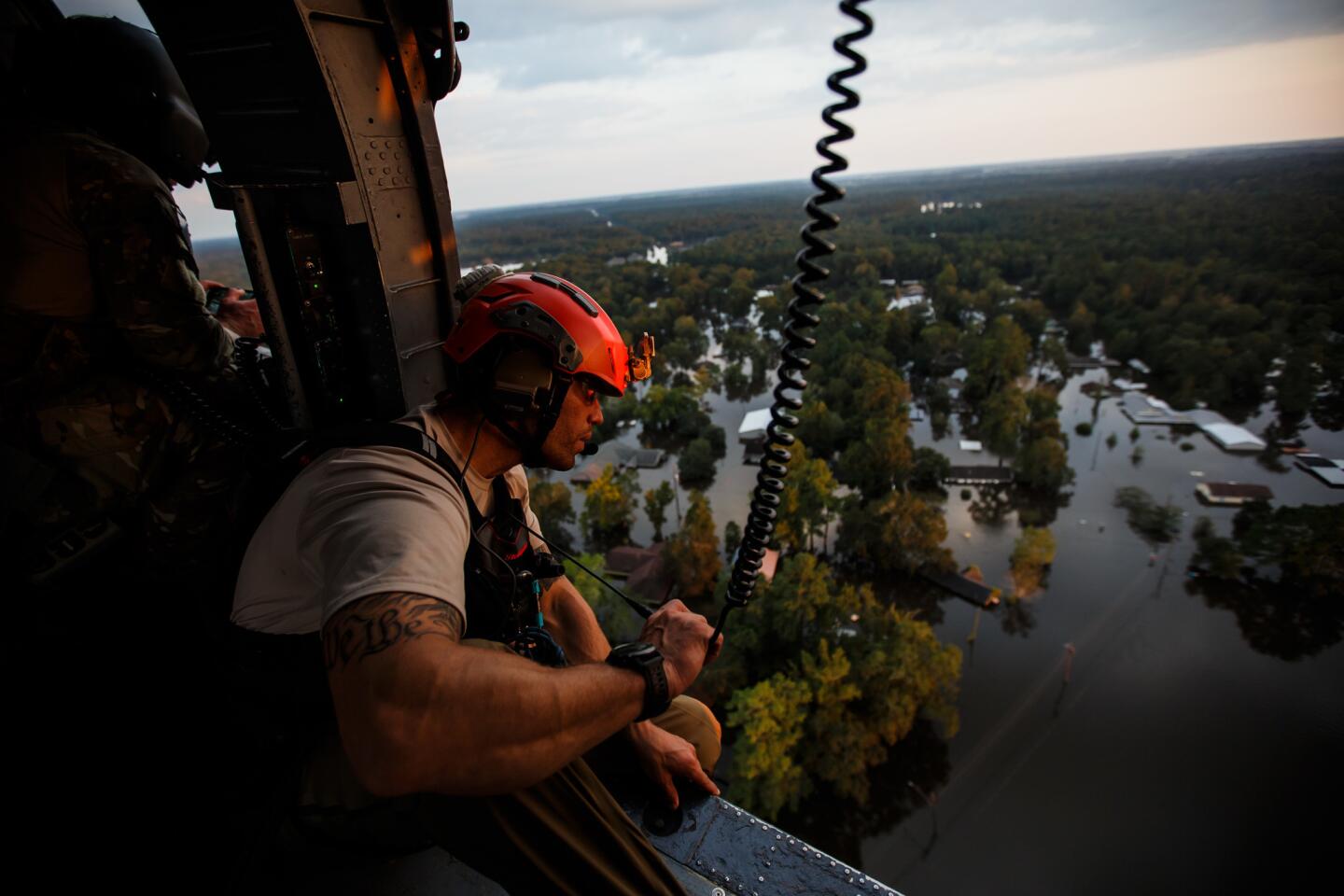
California Air National Guard 129th Rescue Wing’s Master Sgt. Adam Vanhaaster searches for people in need of help near Lumberton.
(Marcus Yam / Los Angeles Times)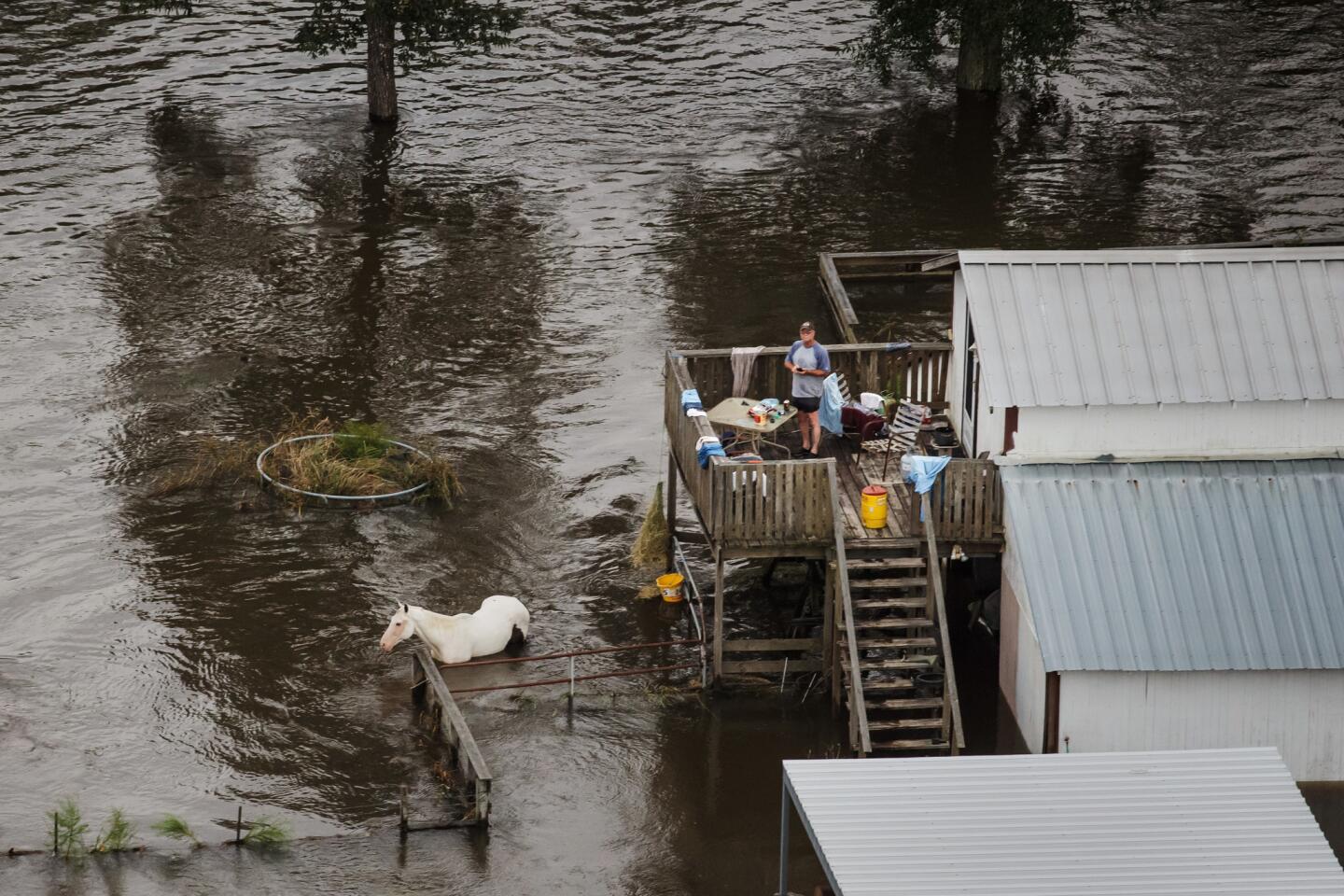
A man prepares his dinner at home near Lumberton.
(Marcus Yam / Los Angeles Times)
Boys sit on a damaged railroad track near Lumberton.
(Marcus Yam / Los Angeles Times)
A woman waves to a California Air National Guard helicopter from her neighborhood near Lumberton.
(Marcus Yam / Los Angeles Times)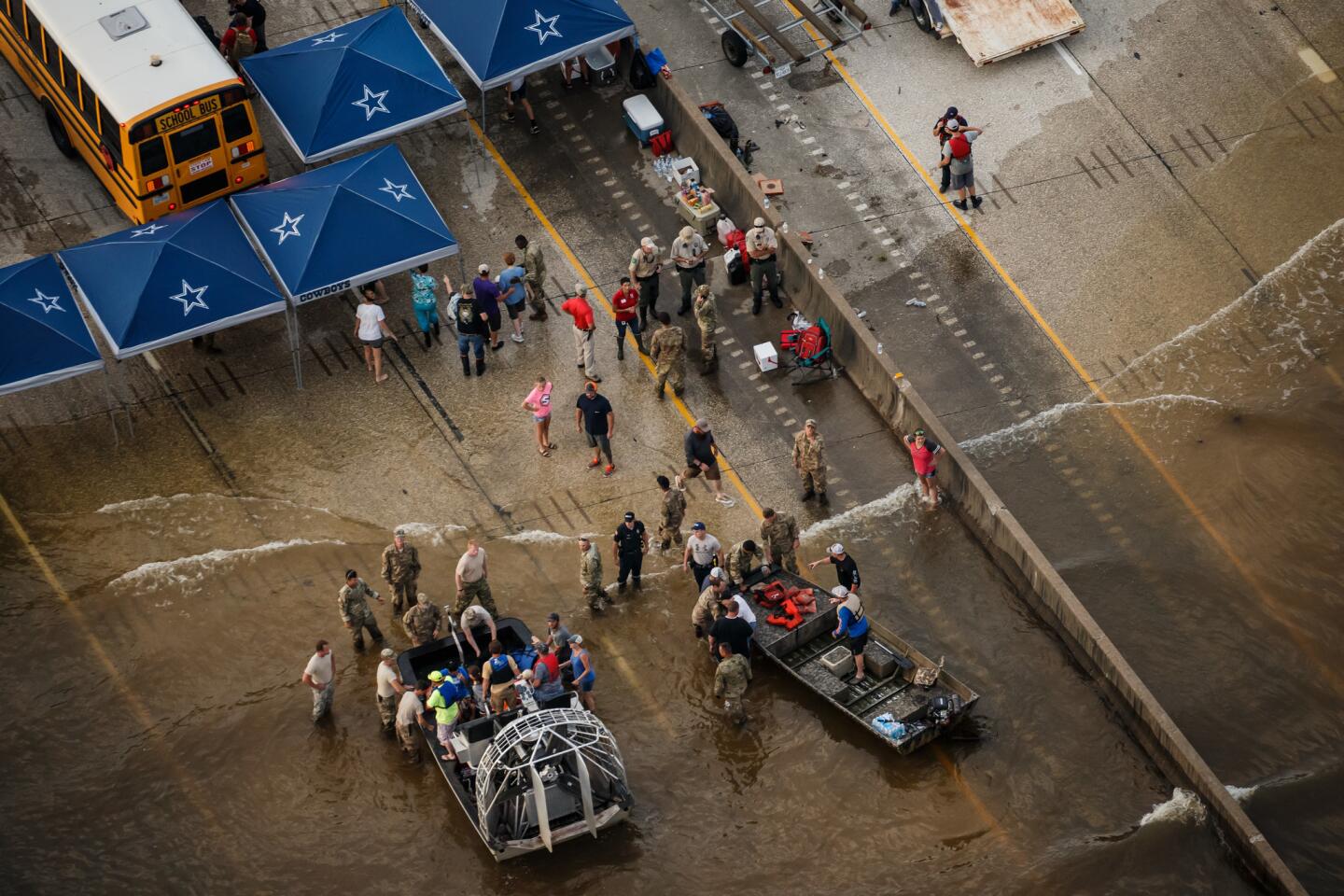
A drop-off point for boat rescues in Lumberton.
(Marcus Yam / Los Angeles Times)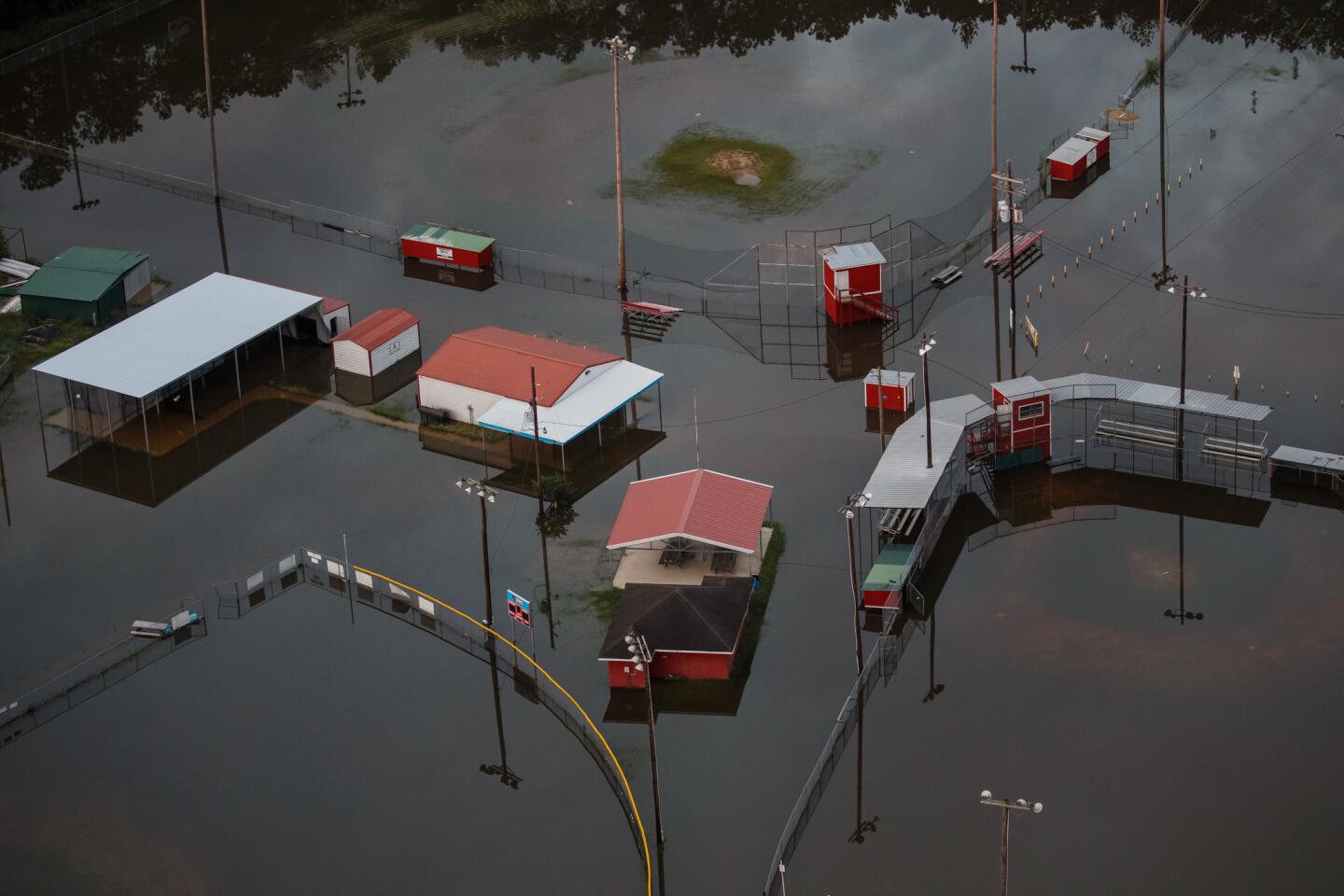
Baseball fields in Lumberton are inundated.
(Marcus Yam / Los Angeles Times)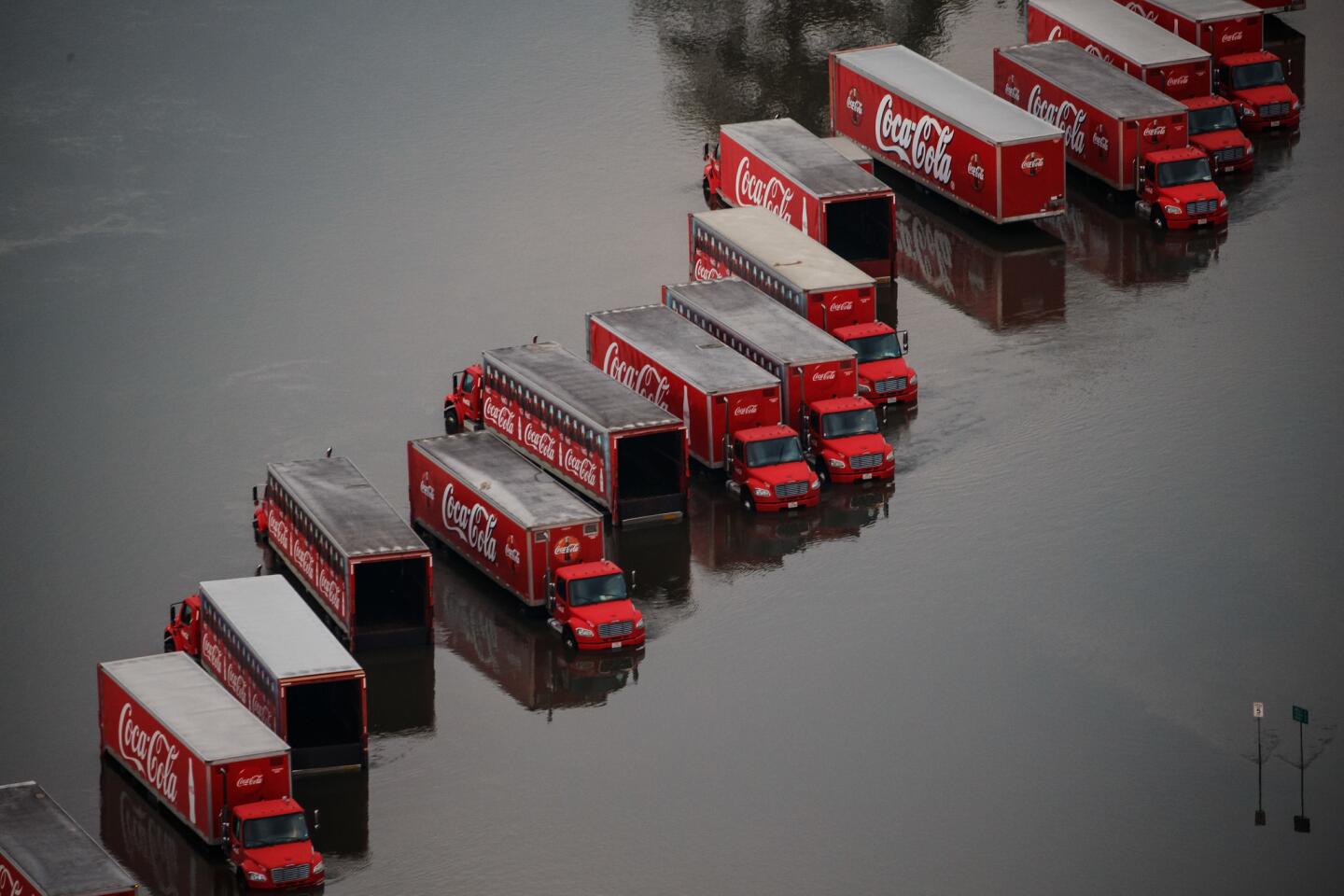
Coca-Cola delivery trucks are trapped by floodwater in Lumberton, Texas.
(Marcus Yam / Los Angeles Times)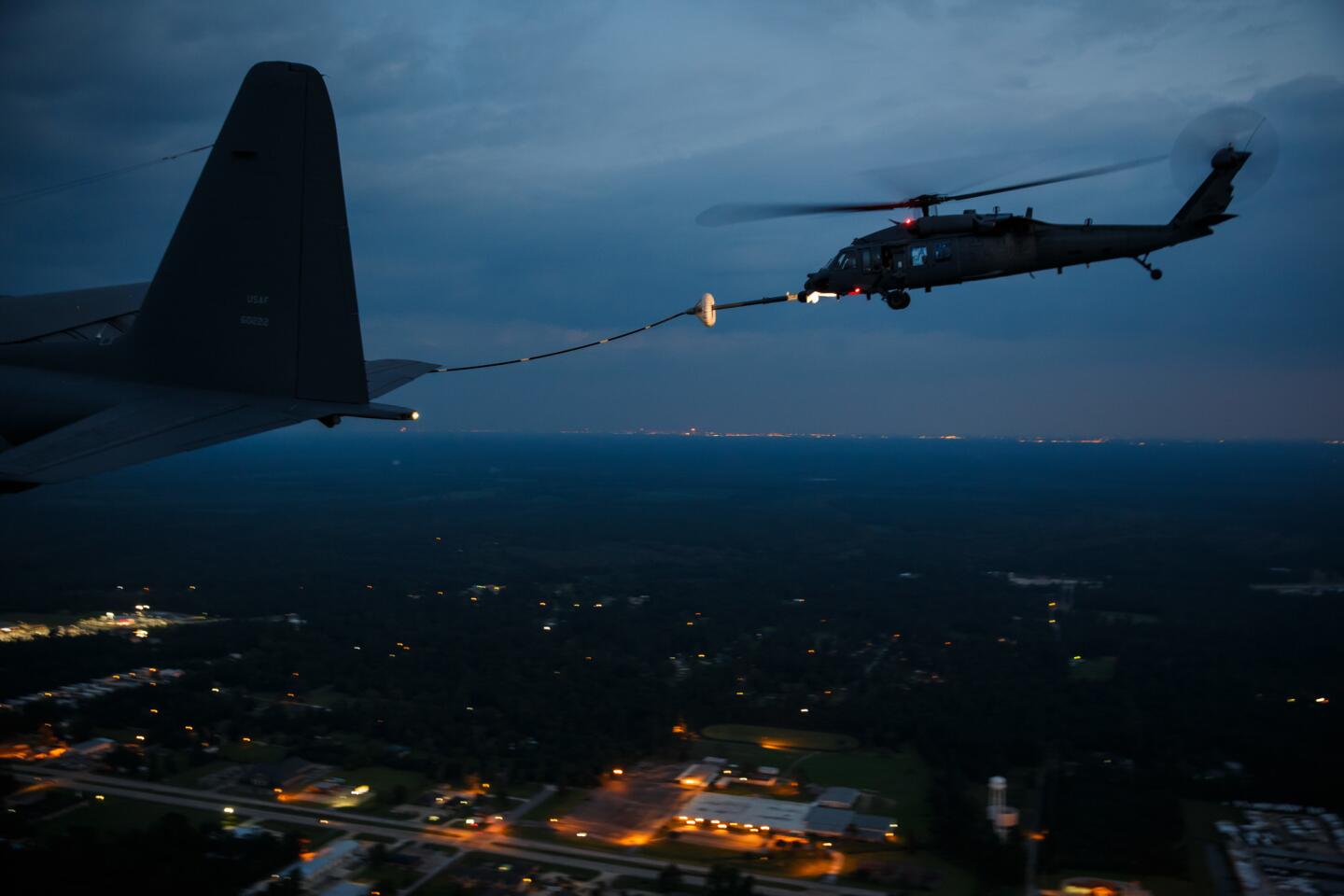
A military search and rescue helicopter refuels mid-flight before resuming nighttime missions over areas flooded in the aftermath of Tropical Storm Harvey.
(Marcus Yam / Los Angeles Times)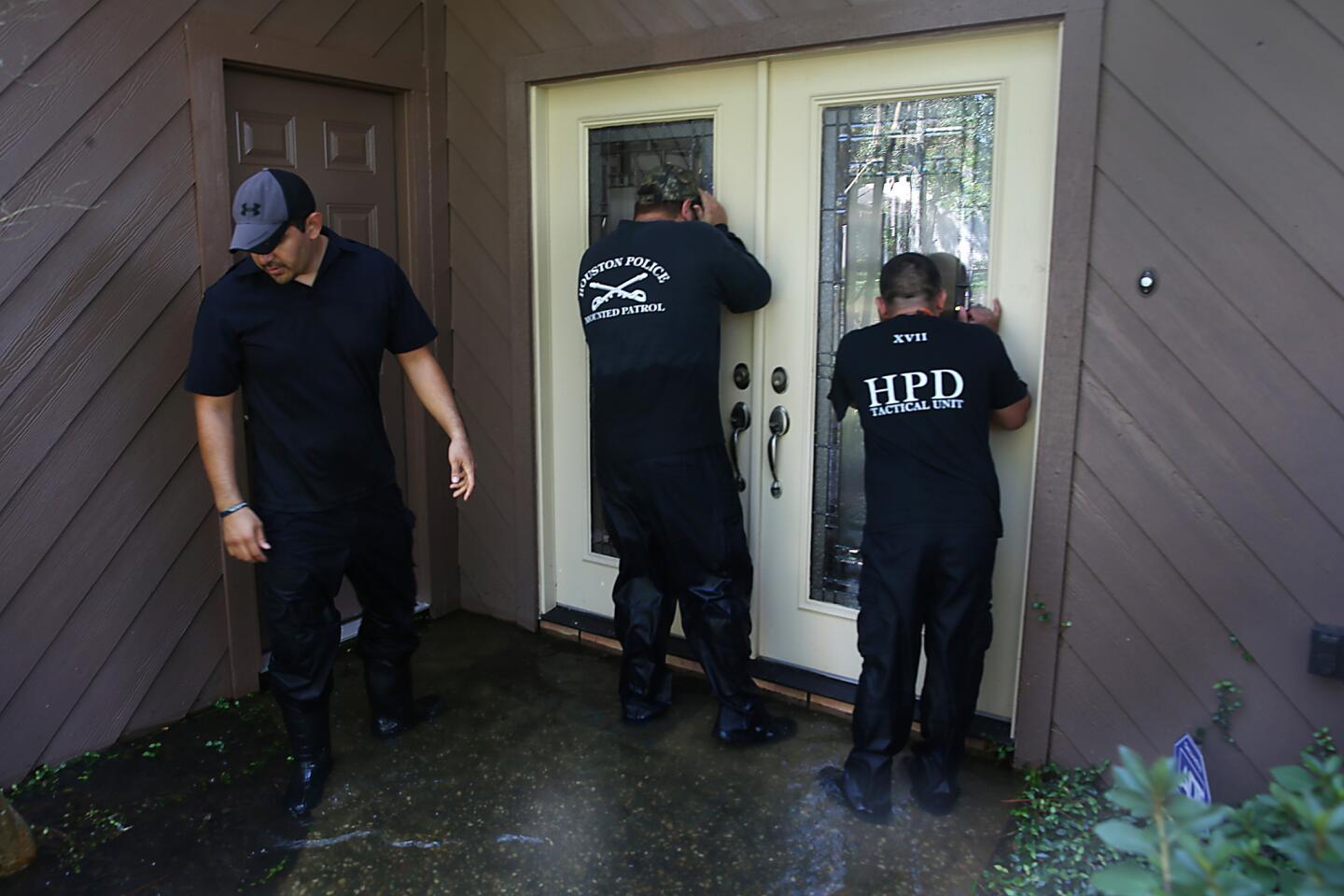
Houston police search a flooded home after hearing that an elderly couple lived there. The house was empty. Police later learned the couple had safely evacuated.
(Robert Gauthier / Los Angeles Times)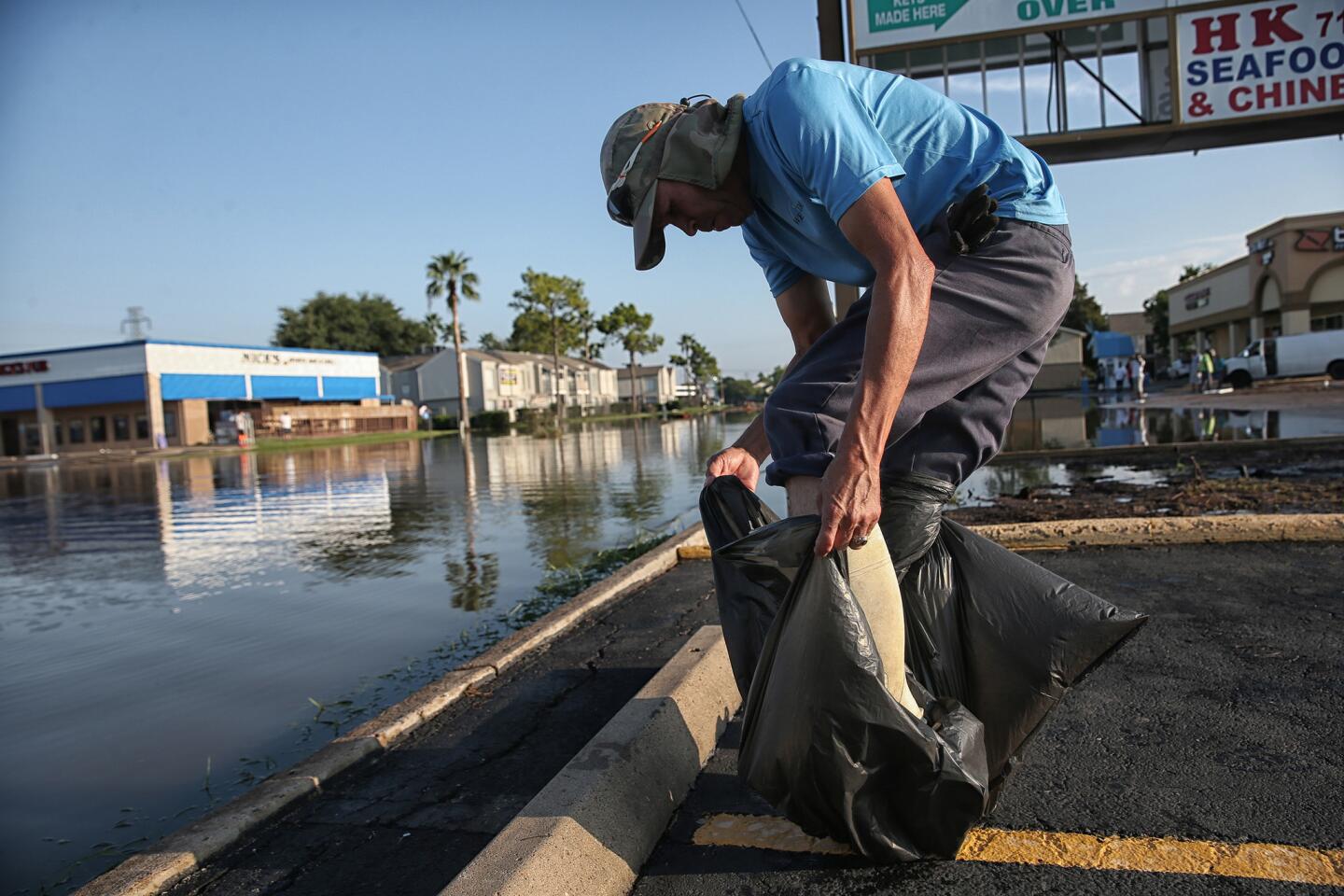
West Houston resident Pedro Albiso uses trash bags to protect his shoes and pants as he prepares to cross a flooded street.
(Robert Gauthier / Los Angeles Times)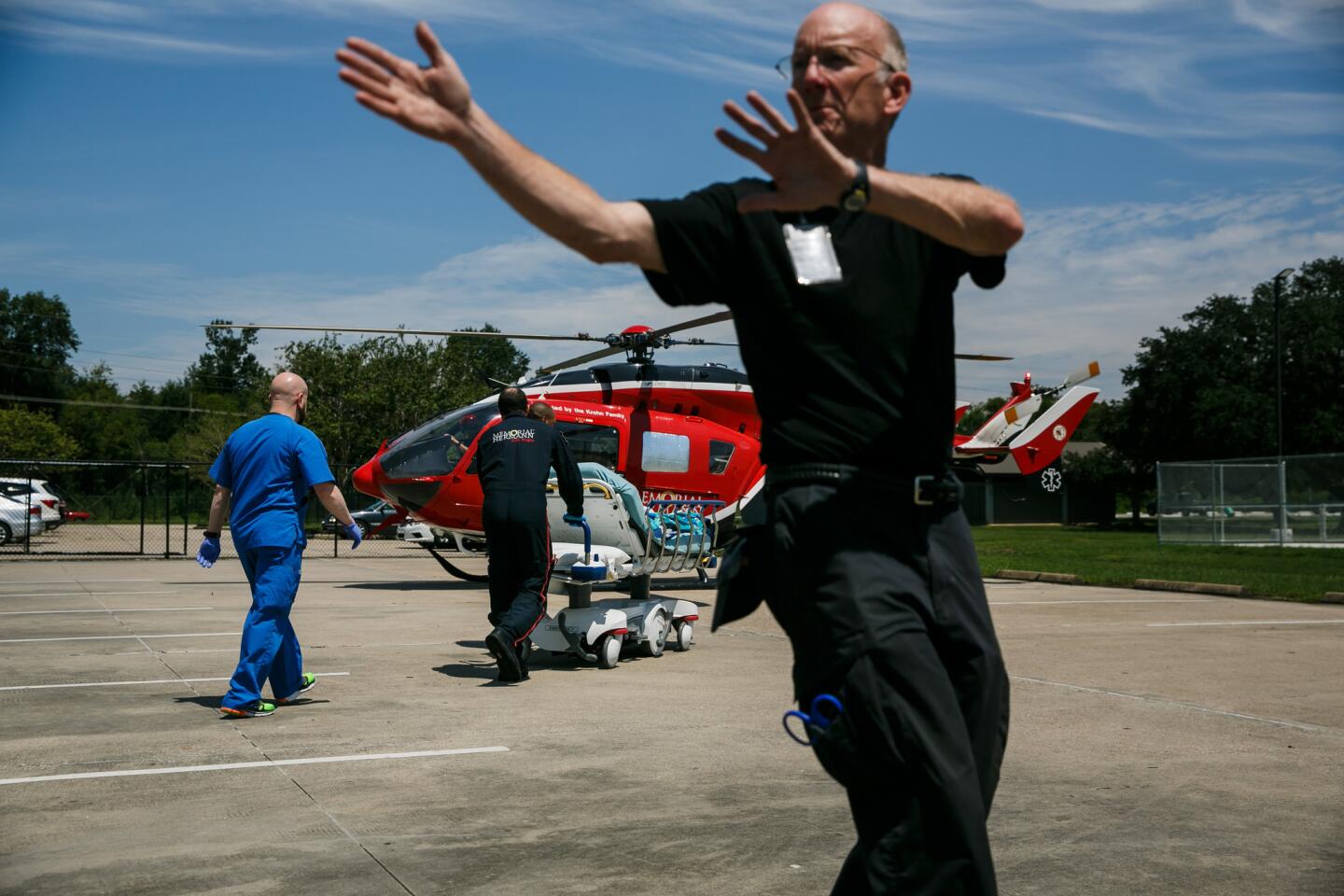
Patients are evacuated from Baptist Hospitals of Southeast Texas after the city of Beaumont lost its water supply.
(Marcus Yam / Los Angeles Times)
Fatima Flores, 12, gets her hair done by cousins Shelly Flores, 7, left, and Ashley Flores, 7, as their family takes shelter at Max Bowl, a bowling alley in Port Arthur, Texas.
(Marcus Yam / Los Angeles Times)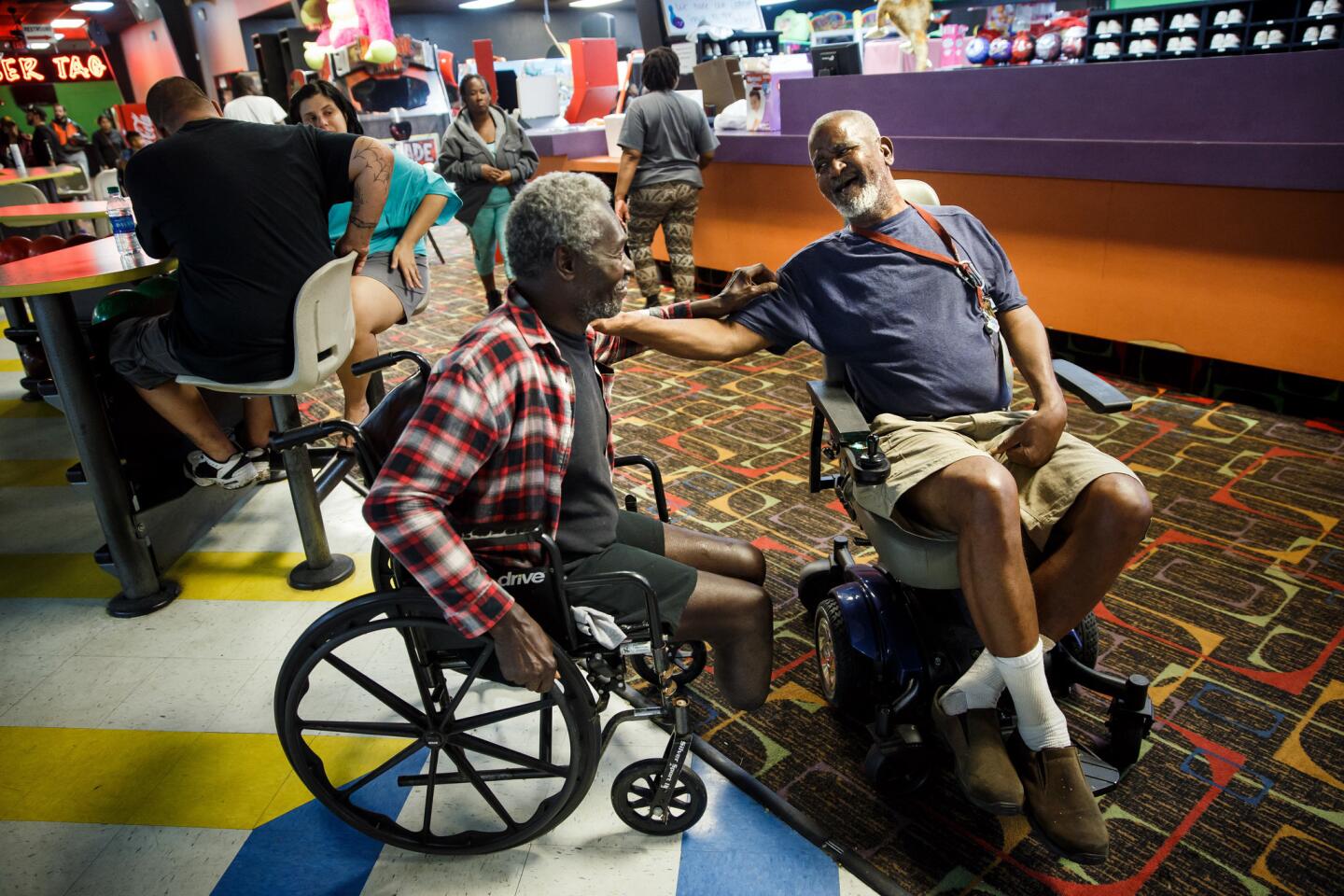
James Benoit, left, and George Clipton sought refuge at Max Bowl in Port Arthur, Texas.
(Marcus Yam / Los Angeles Times)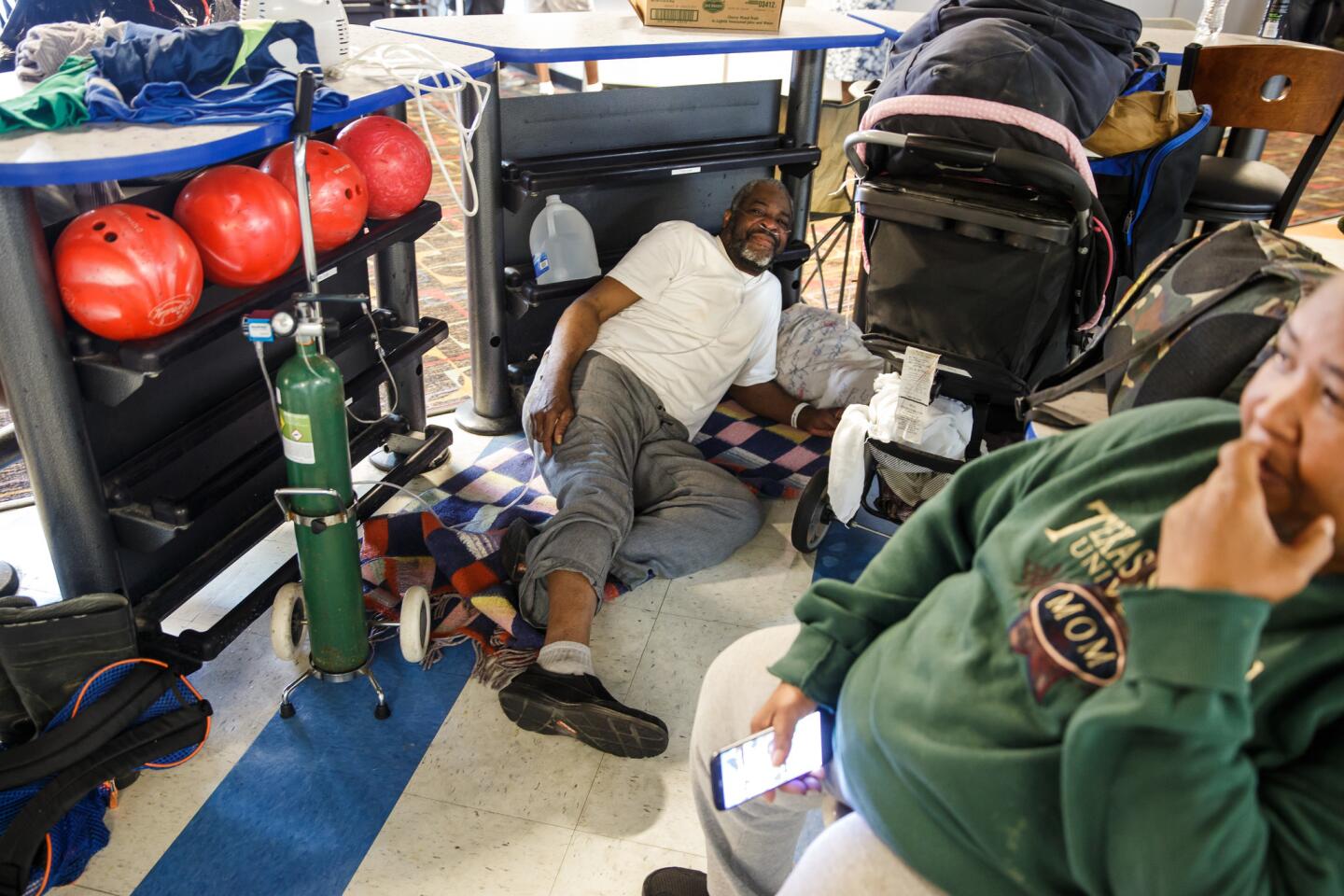
June Ayrow spent the night with his oxygen tanks underneath a table at Max Bowl in Port Arthur, Texas.
(Marcus Yam / Los Angeles Times)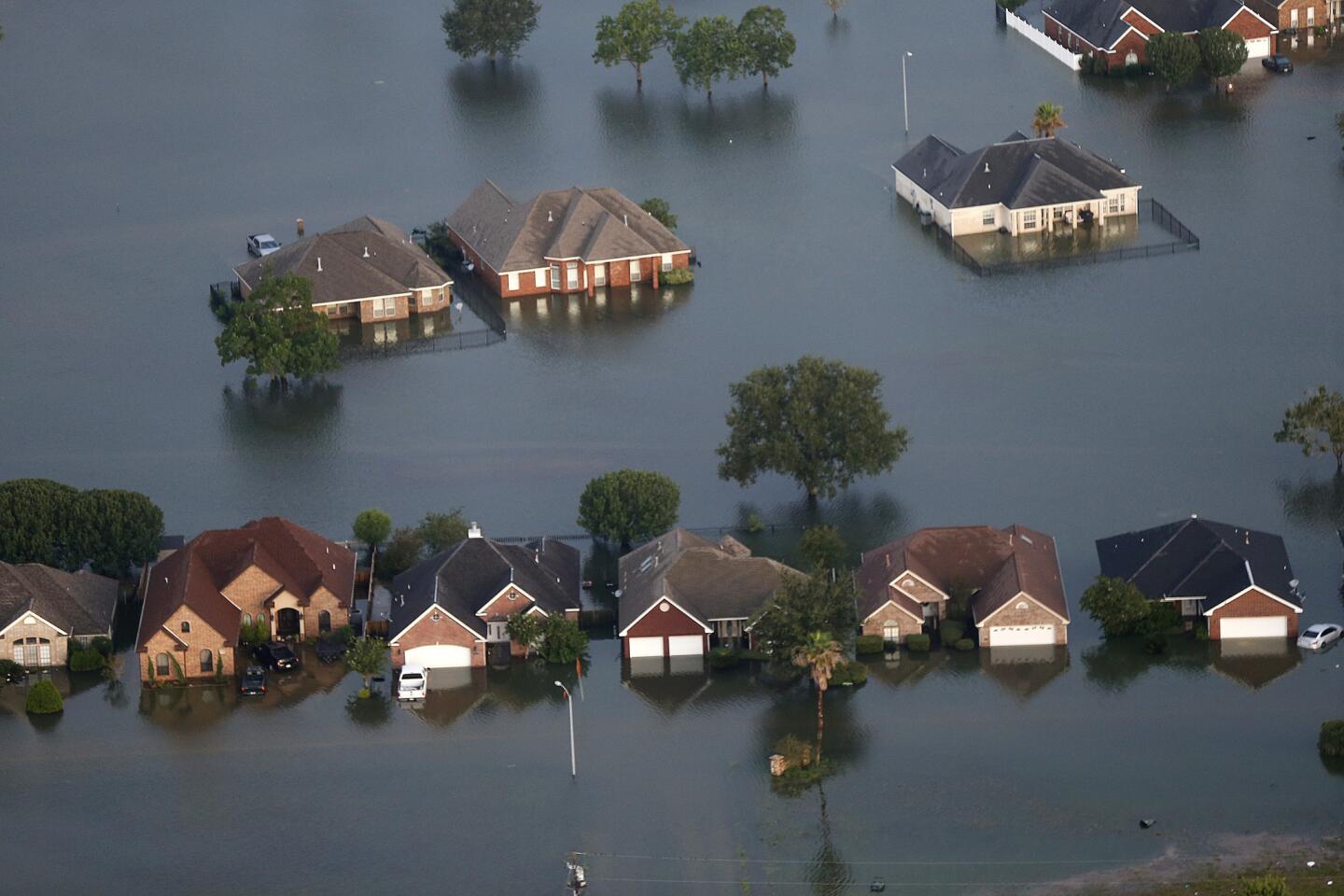
Floodwaters surround homes Thursday in Port Arthur, Texas.
(Gerald Herbert / Associated Press)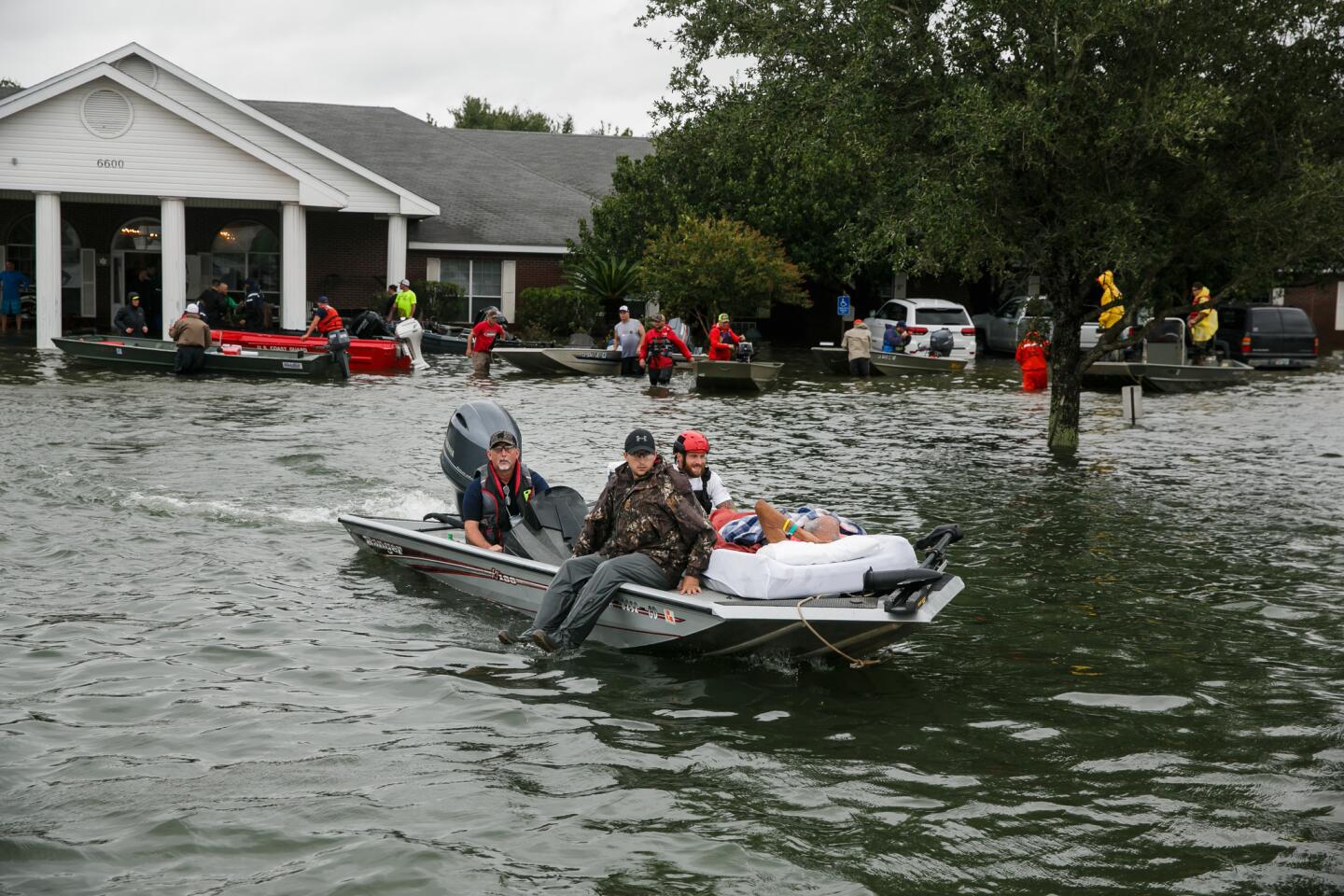
Volunteers rescue patients from the Cypress Glen nursing home where floodwaters trapped dozens of elderly patients in Port Arthur, Texas on Wednesday.
(Marcus Yam / Los Angeles Times)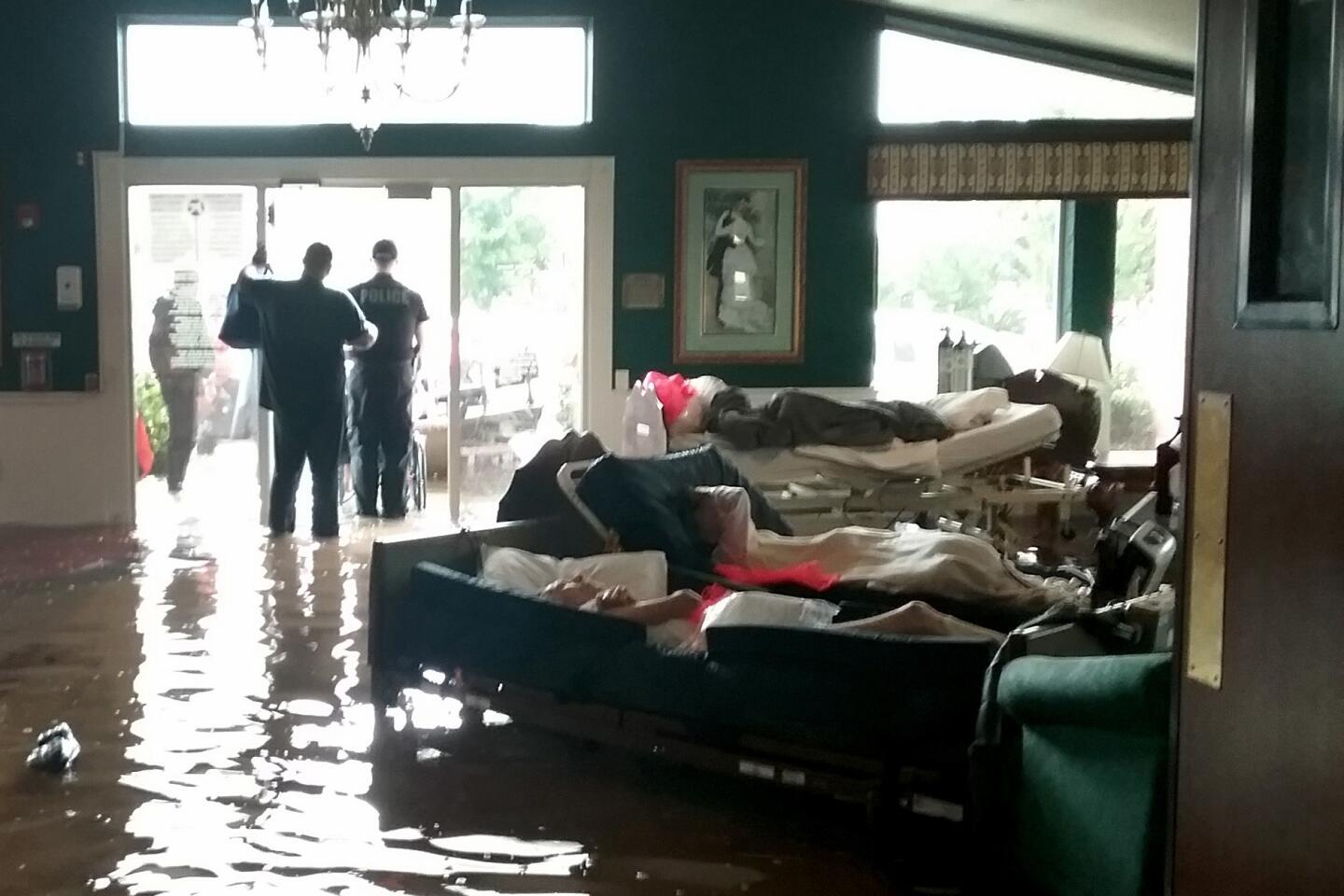
Residents lie on sofas as they wait to be evacuated from the Cypress Glen senior care facility in Port Arthur, Texas, which was inundated with floodwaters from Tropical Storm Harvey on Wednesday.
(Matt Pearce / Los Angeles Times)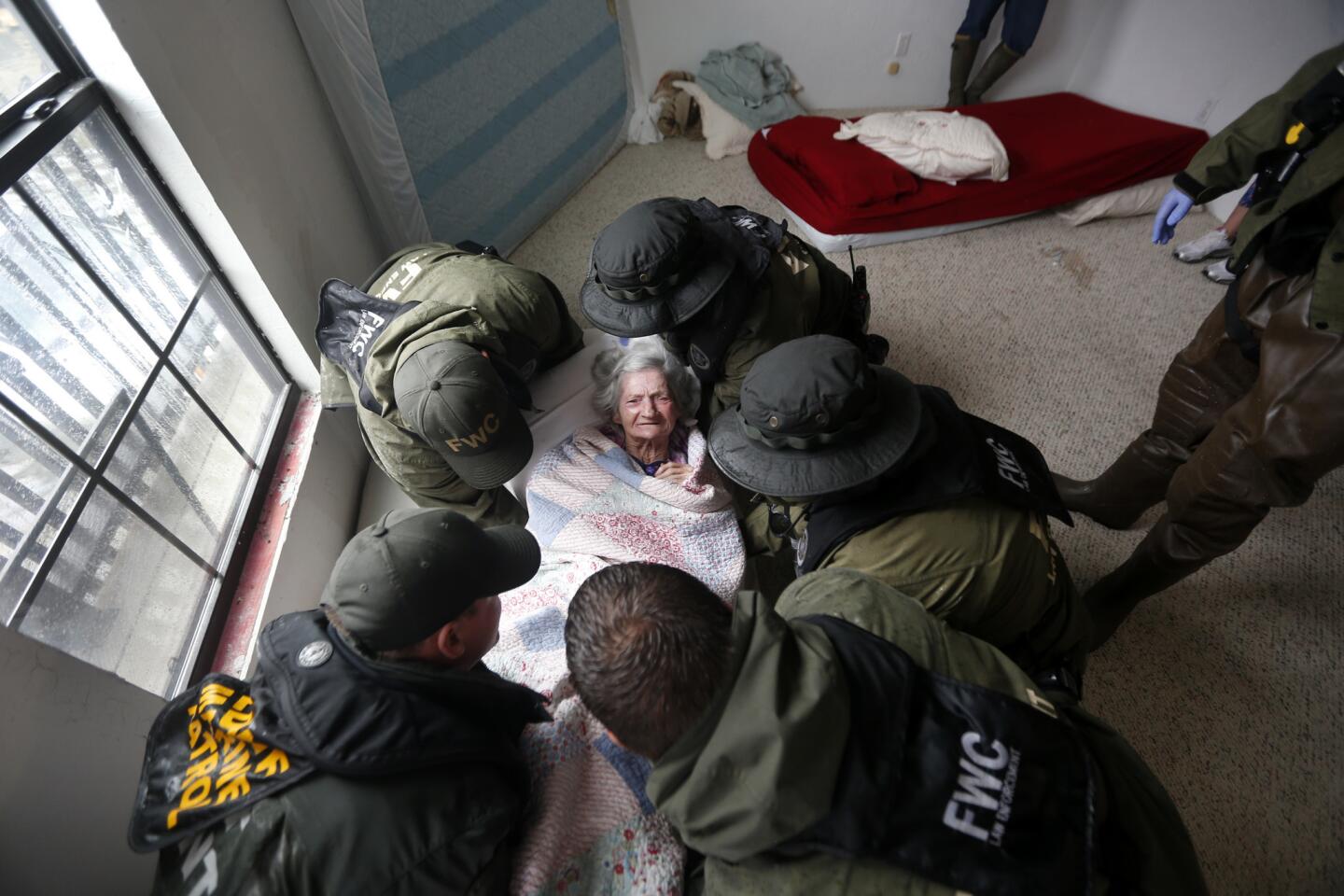
Emergency crews help rescue elderly residents from the Golden Years Assisted Living home in Orange, Texas, on Wednesday.
(Gerald Herbert / Associated Press)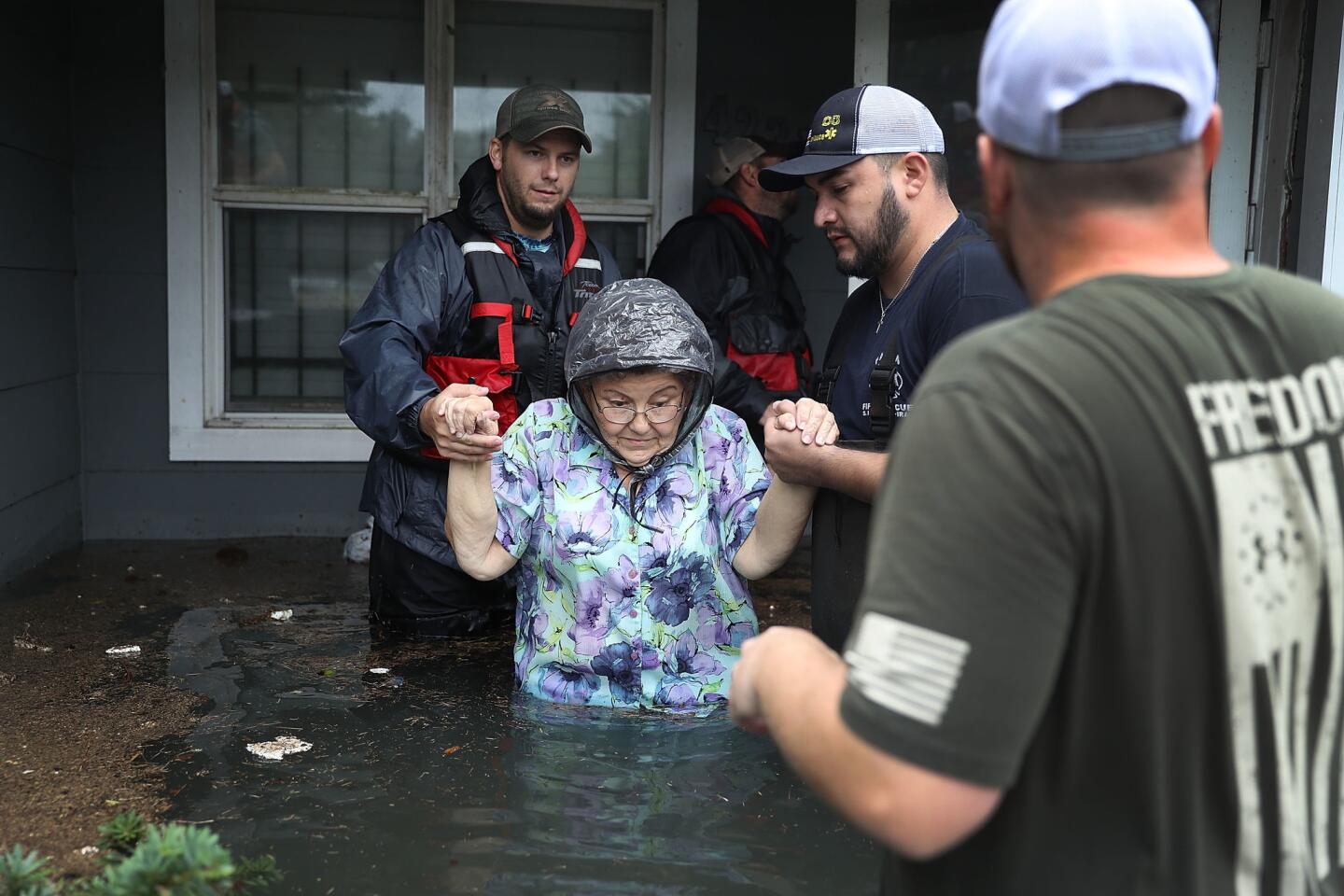
Rescuer workers help a woman from her flooded home n Port Arthur, Texas.
(Joe Raedle / Getty Images)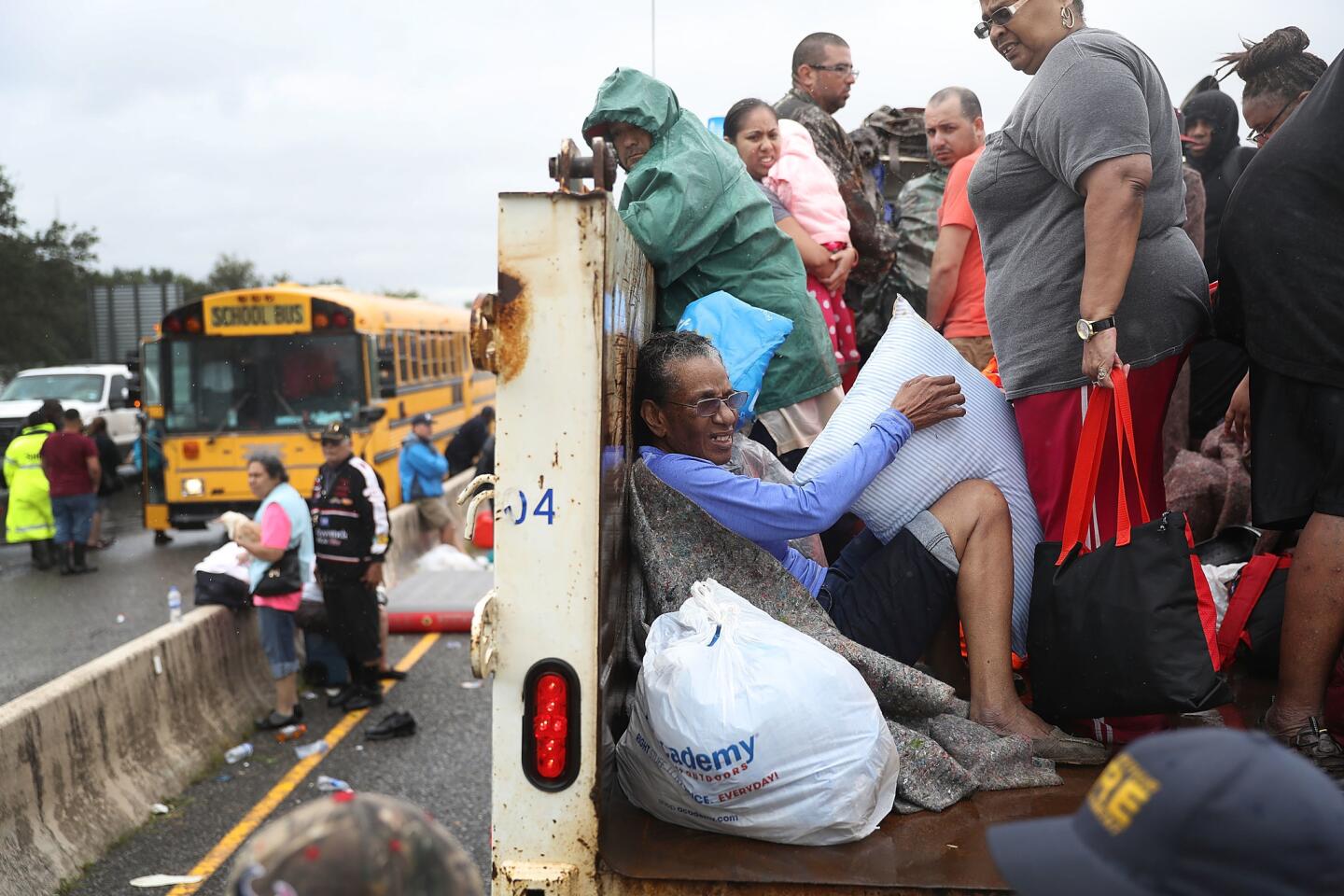
Evacuees ride on a truck after they were driven from their homes by the flooding in Port Arthur, Texas.
(Joe Raedle / Getty Images)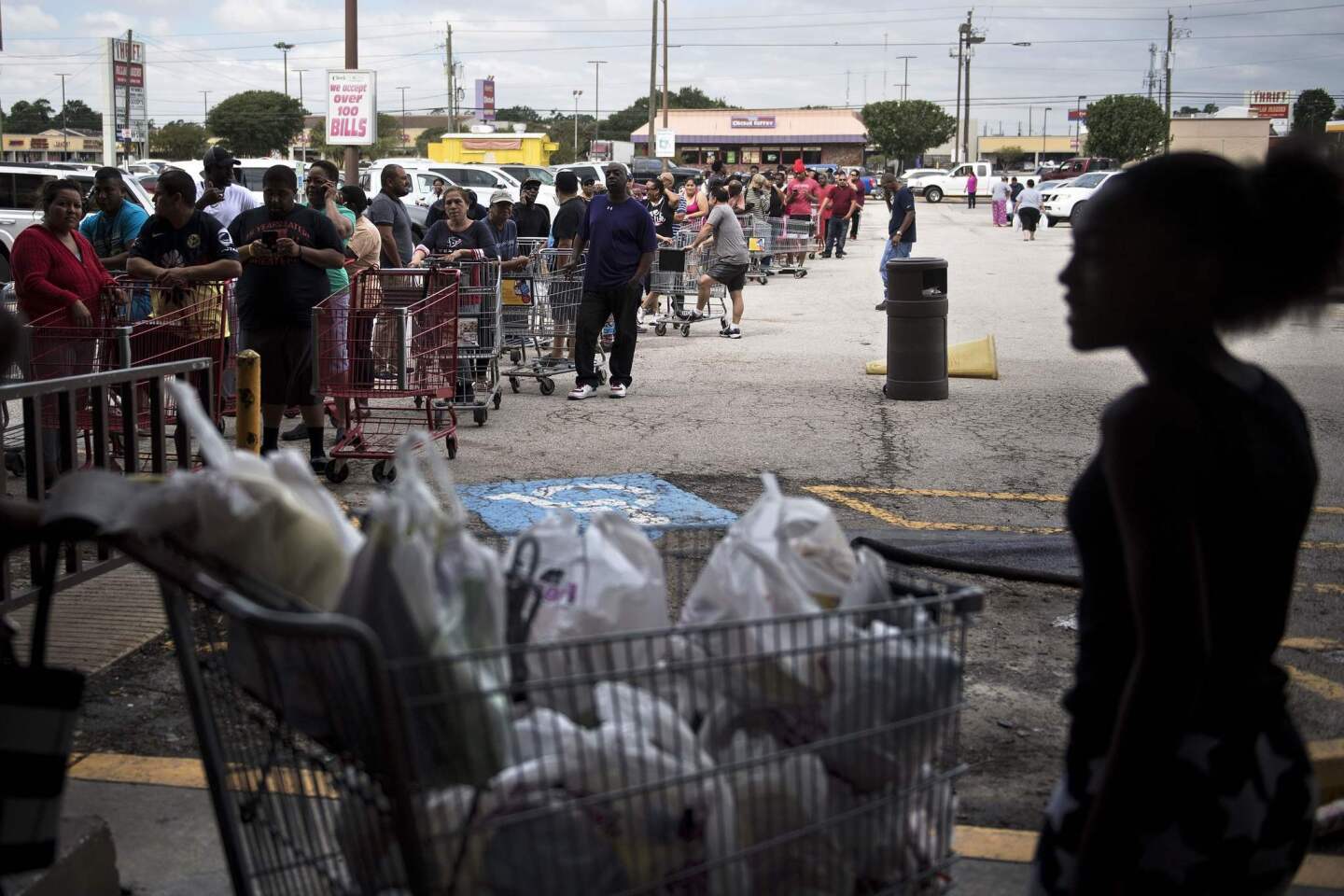
People wait in line to buy groceries at a Food Town during the aftermath of Tropical Storm Harvey.
(Brendan Smialowski / AFP/Getty Images)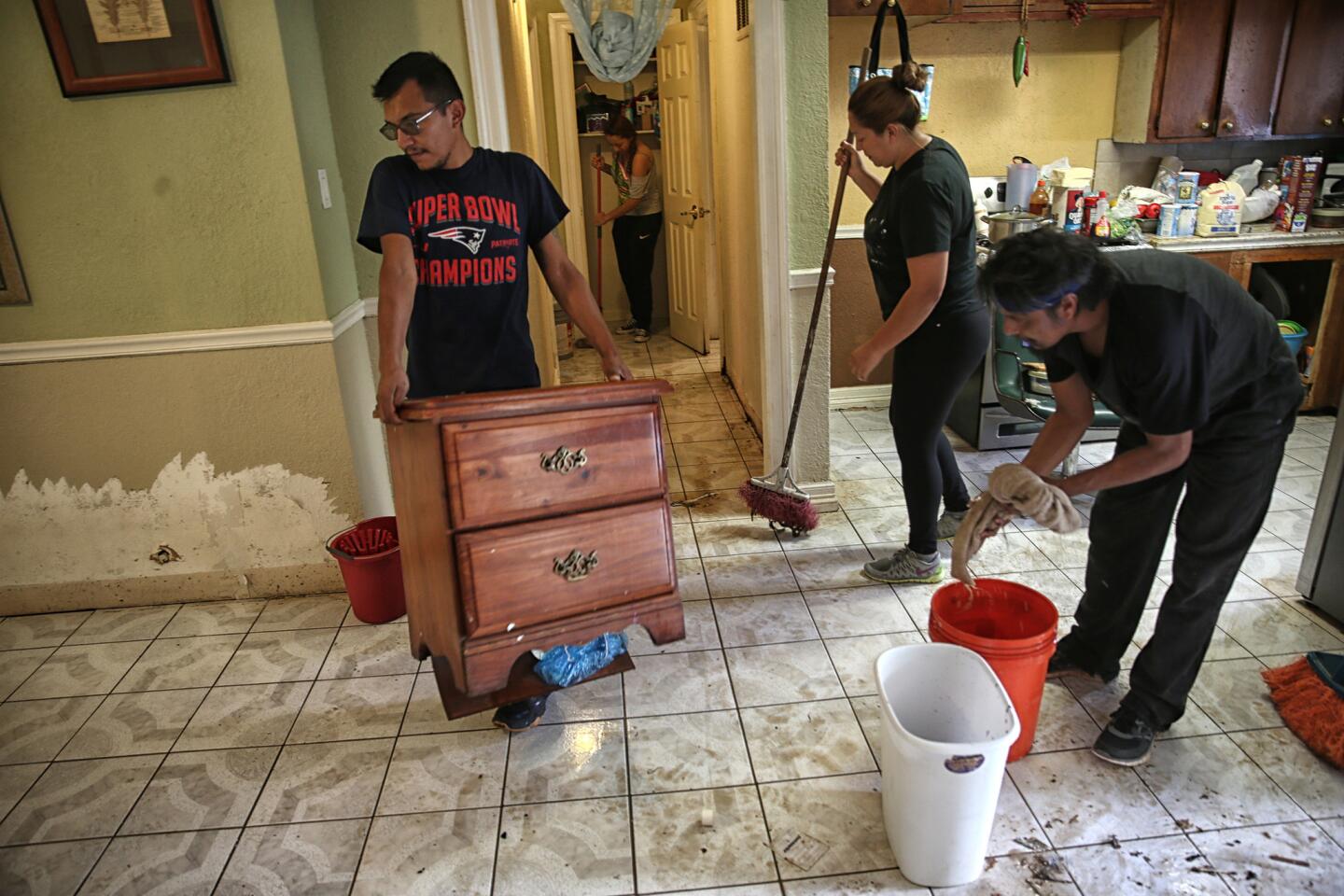
Juan Figueroa removes damaged furniture from his mother’s northeast Houston home where residents begin rebuilding from the devastating effects of the storm.
(Robert Gauthier / Los Angeles Times)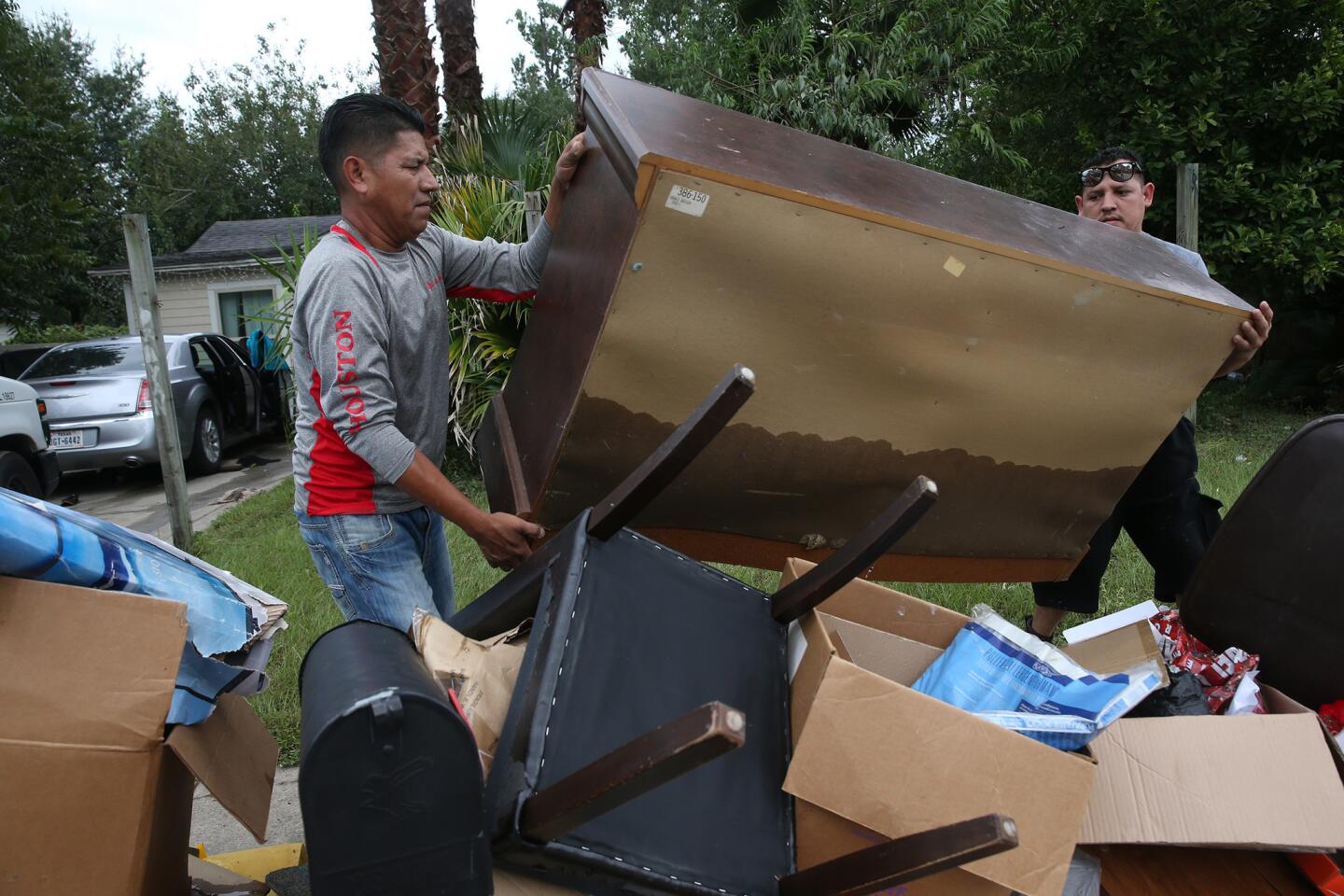
Rafael Minor, left, and Miguel Ramirez remove the contents from a flooded home in northeast Houston on Wednesday.
(Robert Gauthier / Los Angeles Times)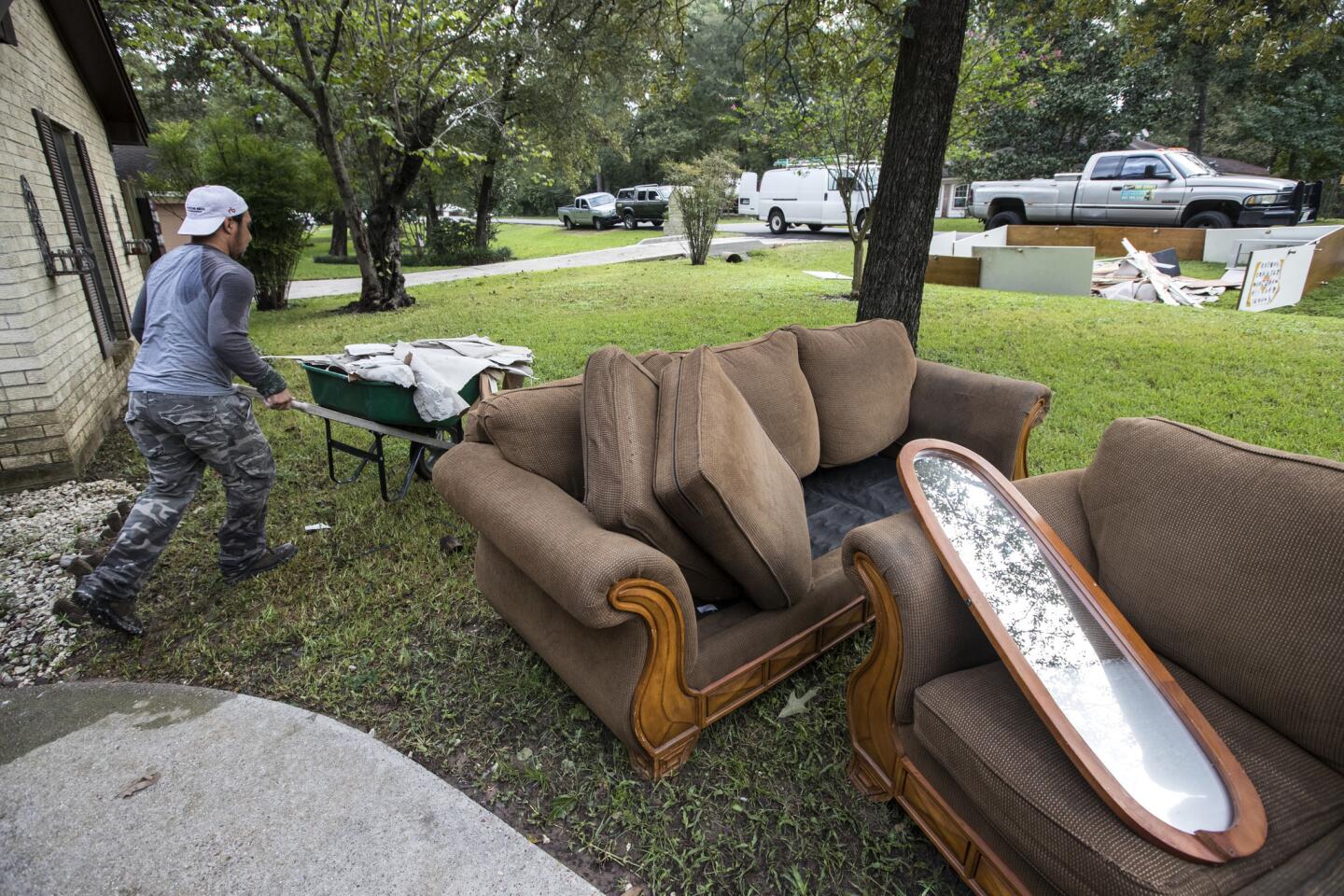
A construction crew cleans out a home that was flooded by Tropical Storm Harvey in Spring, Texas.
(Brett Coomer / Associated Press)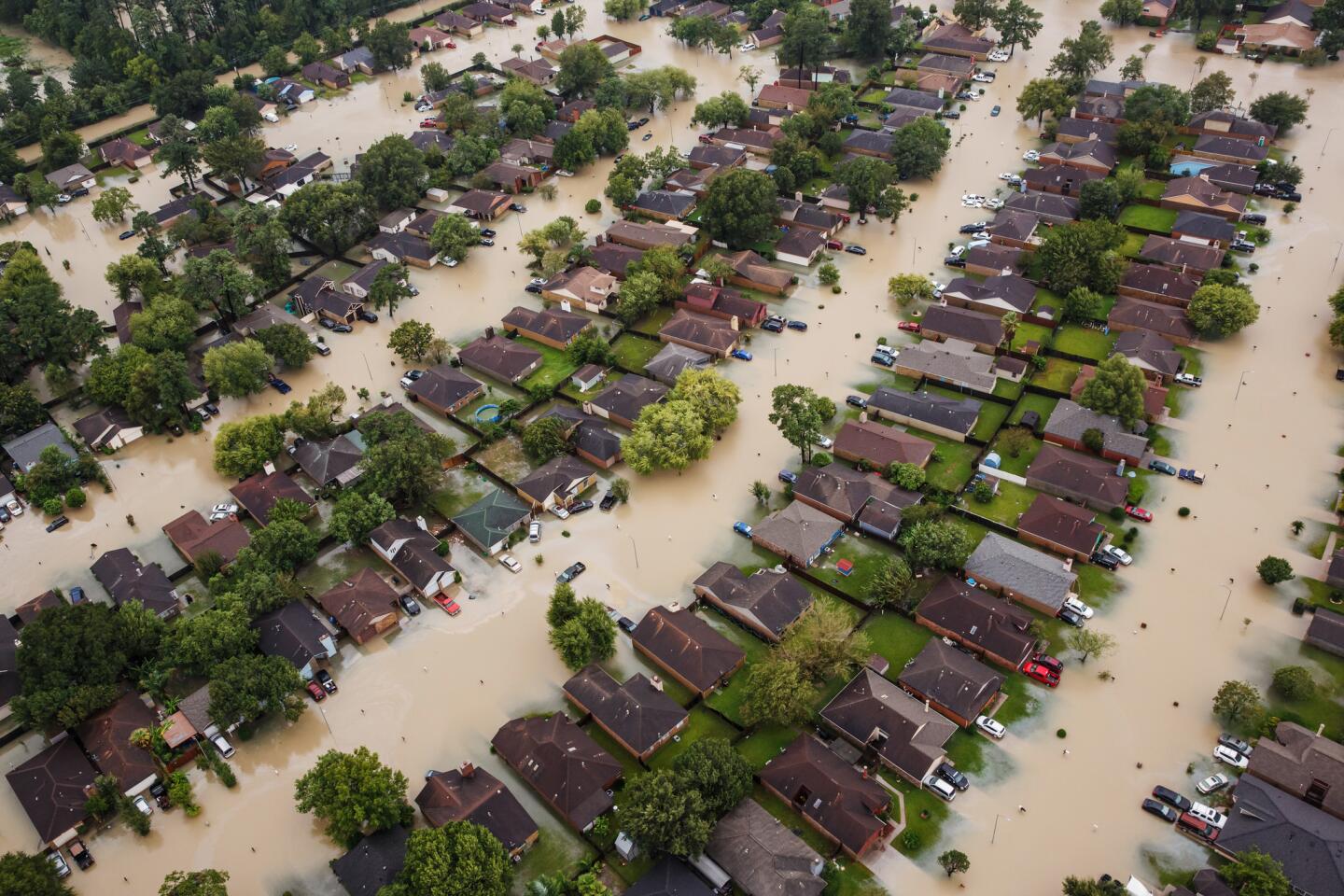
A flooded residential neighborhood near Interstate 10 in Houston, Texas.
(Marcus Yam / Los Angeles Times)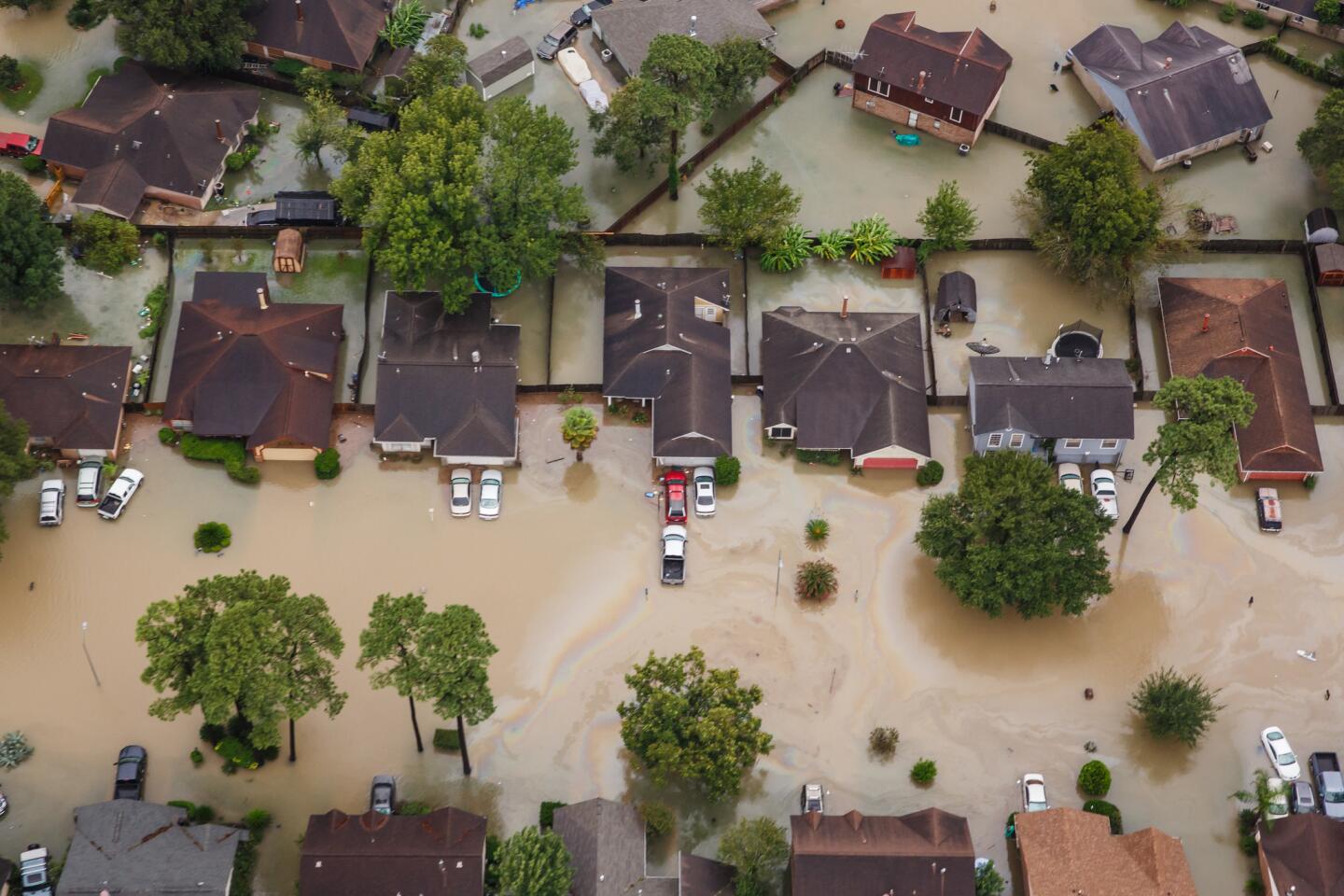
A flooded residential neighborhood near Interstate 10 in Houston, Texas.
(Marcus Yam / Los Angeles Times)
People come out to view the flooded areas near their homes in Houston, Texas.
(Marcus Yam / Los Angeles Times)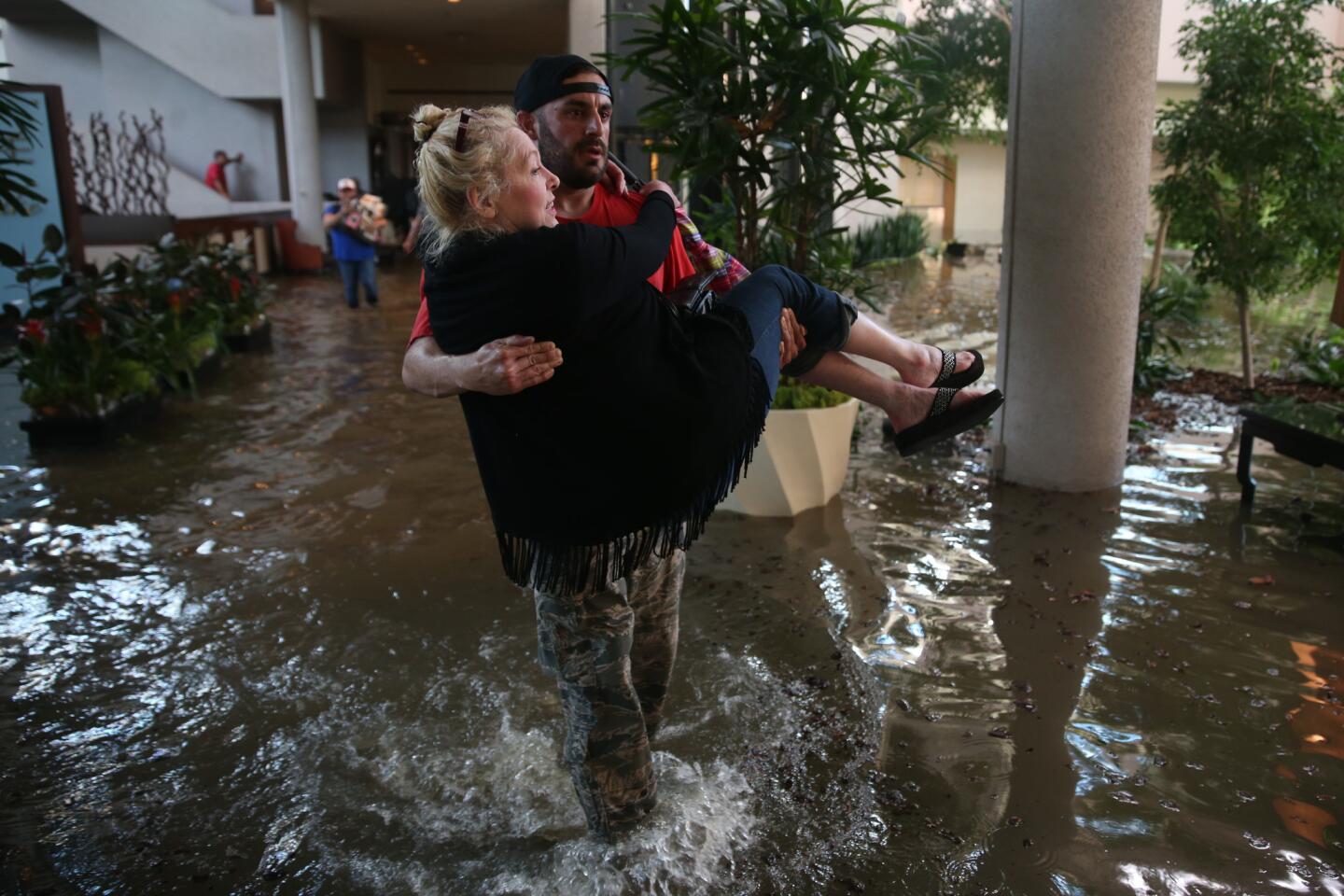
CaroLine Kirkpatrick of Salt Lake City, Utah, is evacuated from the Omni Hotel by rescue worker Adam Caballero in Addicks, a suburb of Houston, Texas.
(Robert Gauthier / Los Angeles Times)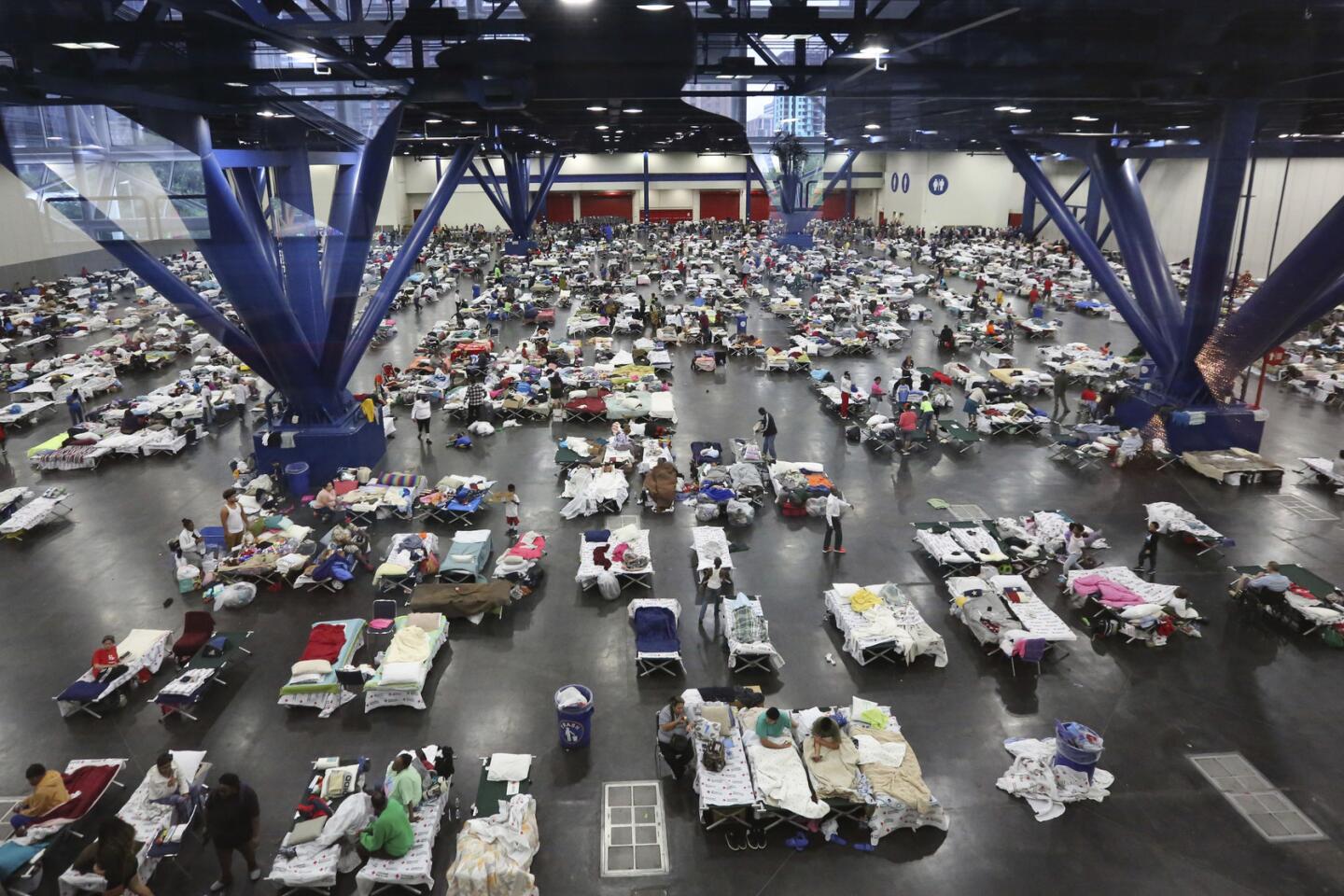
People displaced by flooding fill the shelter at the George R. Brown Convention Center in downtown Houston.
(LM Otero / Associated Press)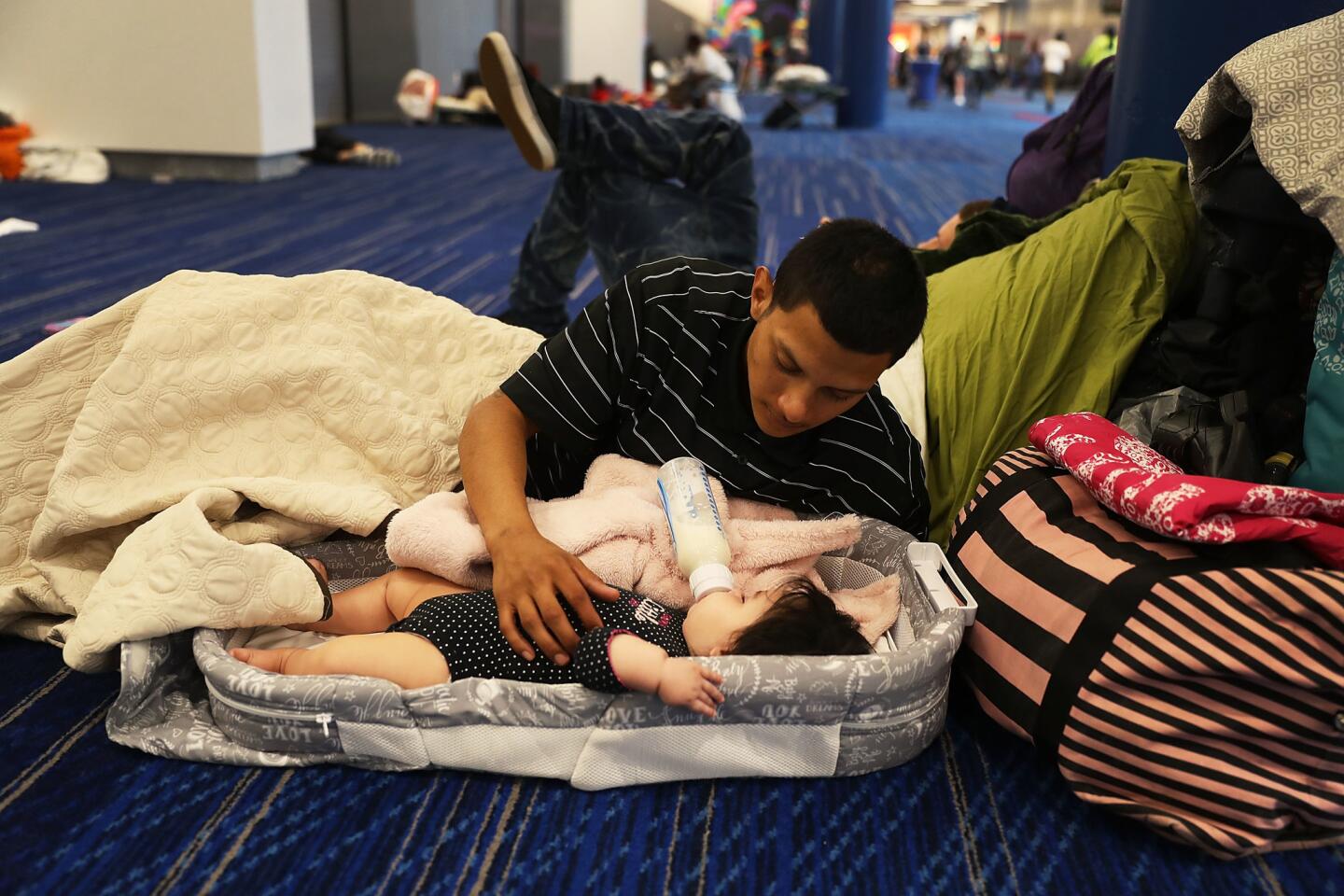
Mark Ocosta and his baby, Aubrey, take shelter at the George R. Brown Convention Center.
(Joe Raedle / Getty Images)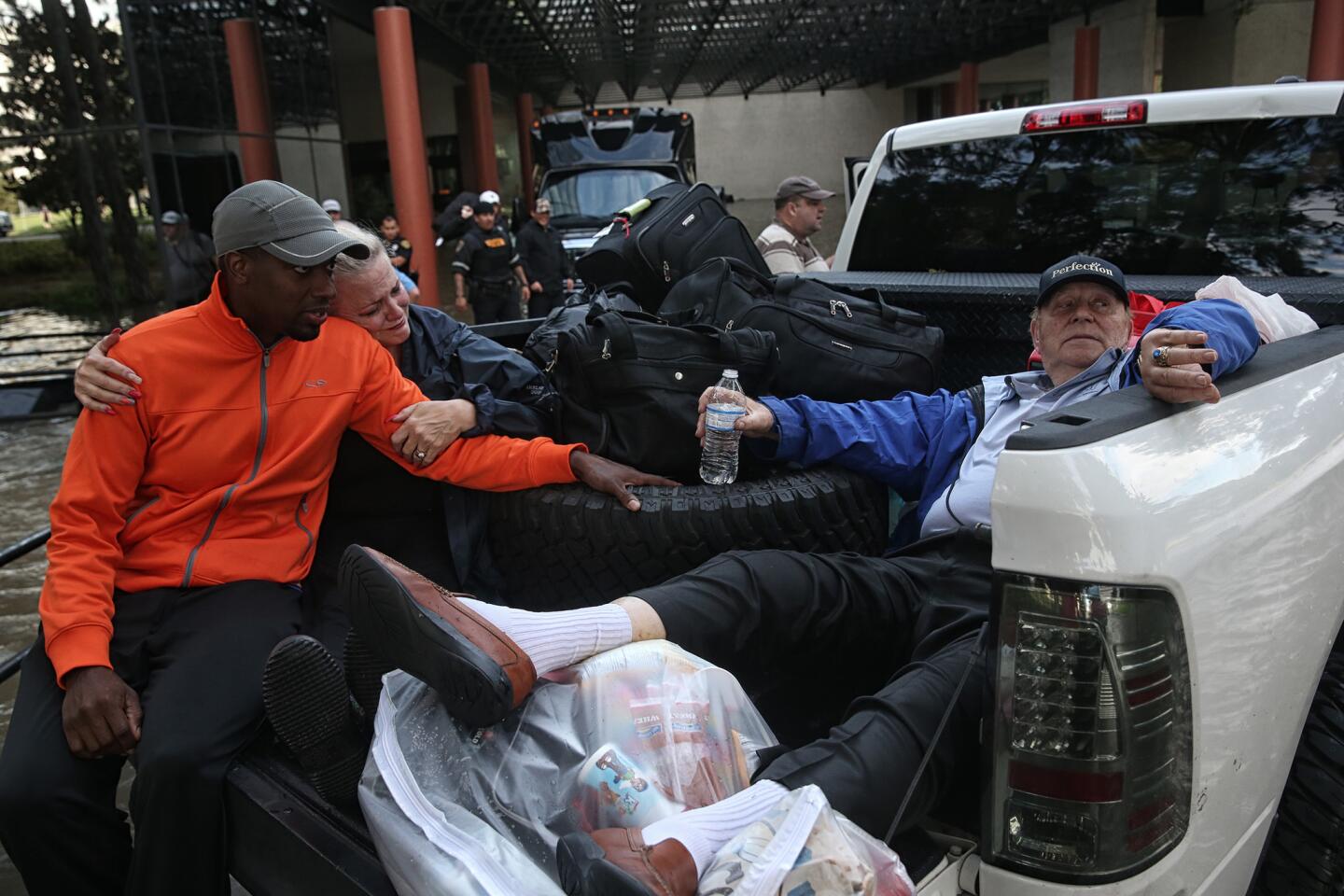
Frantzy Thenor receives an embrace from a fellow evacuee after he helped her leave from the flooded Omni Hotel, in the Addicks area of Houston, Texas.
(Robert Gauthier / Los Angeles Times)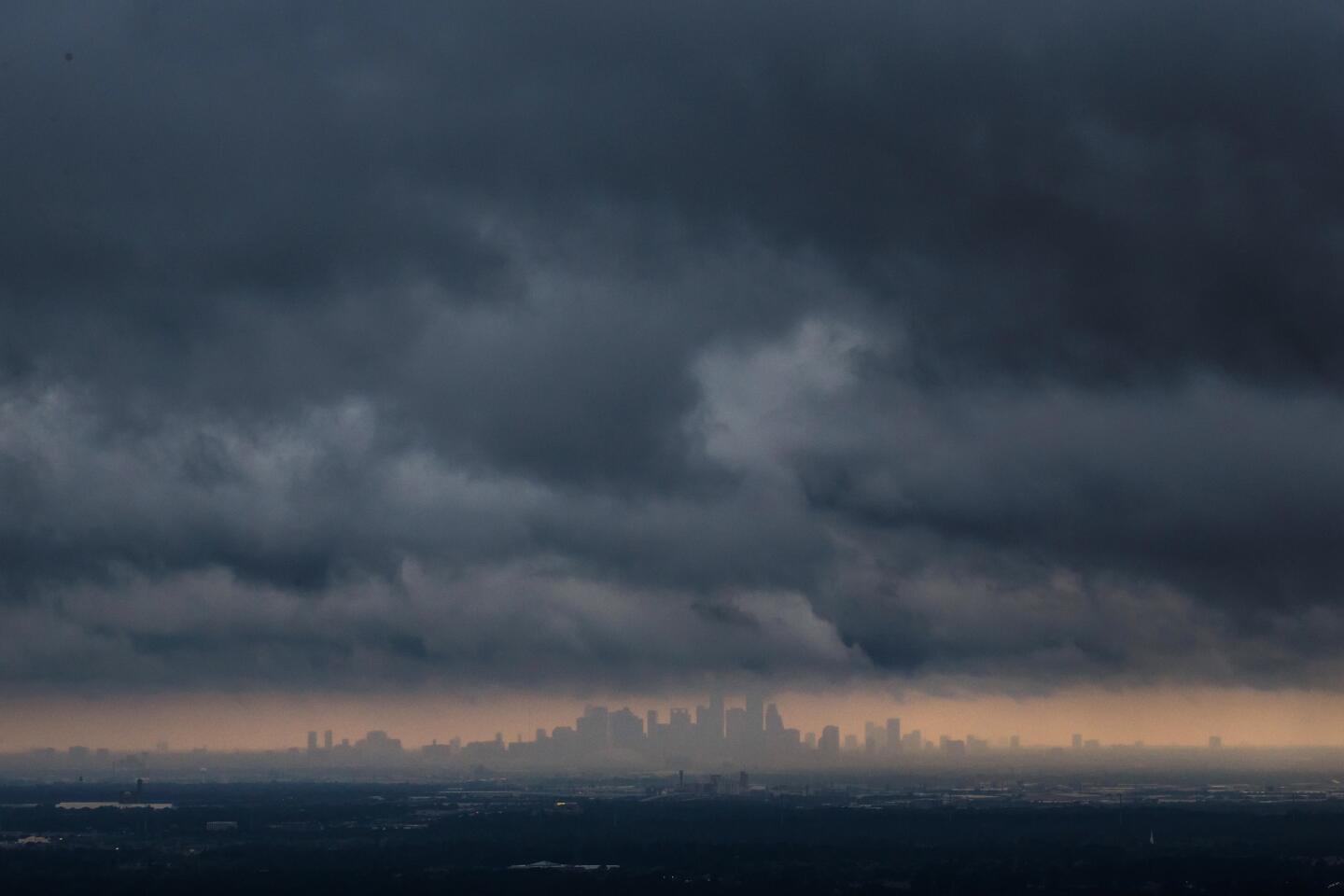
Storm clouds over Houston skyline.
(Marcus Yam / Los Angeles Times)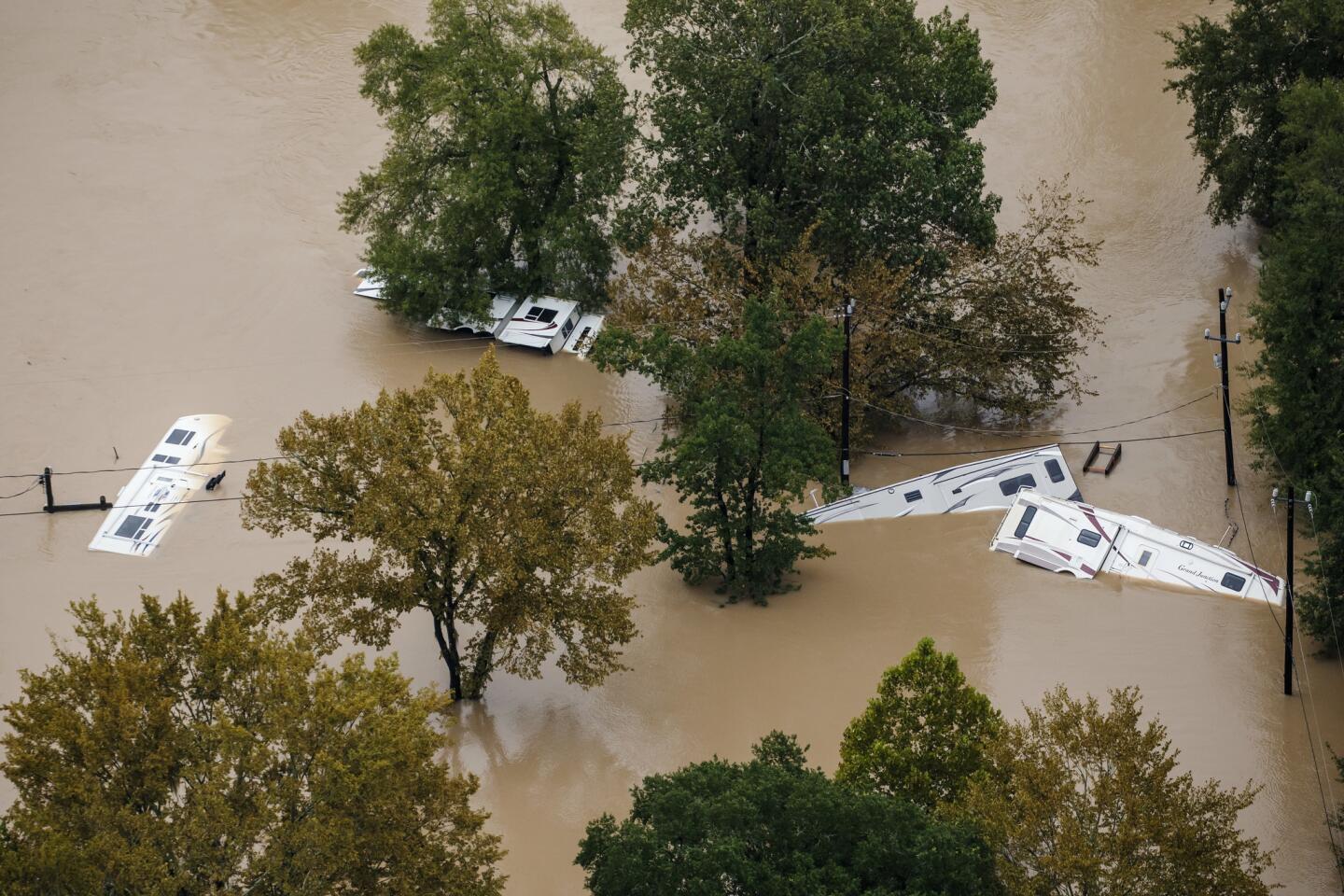
Recreational vehicles sit on their sides in flood water in Houston, Texas.
(Marcus Yam / Los Angeles Times)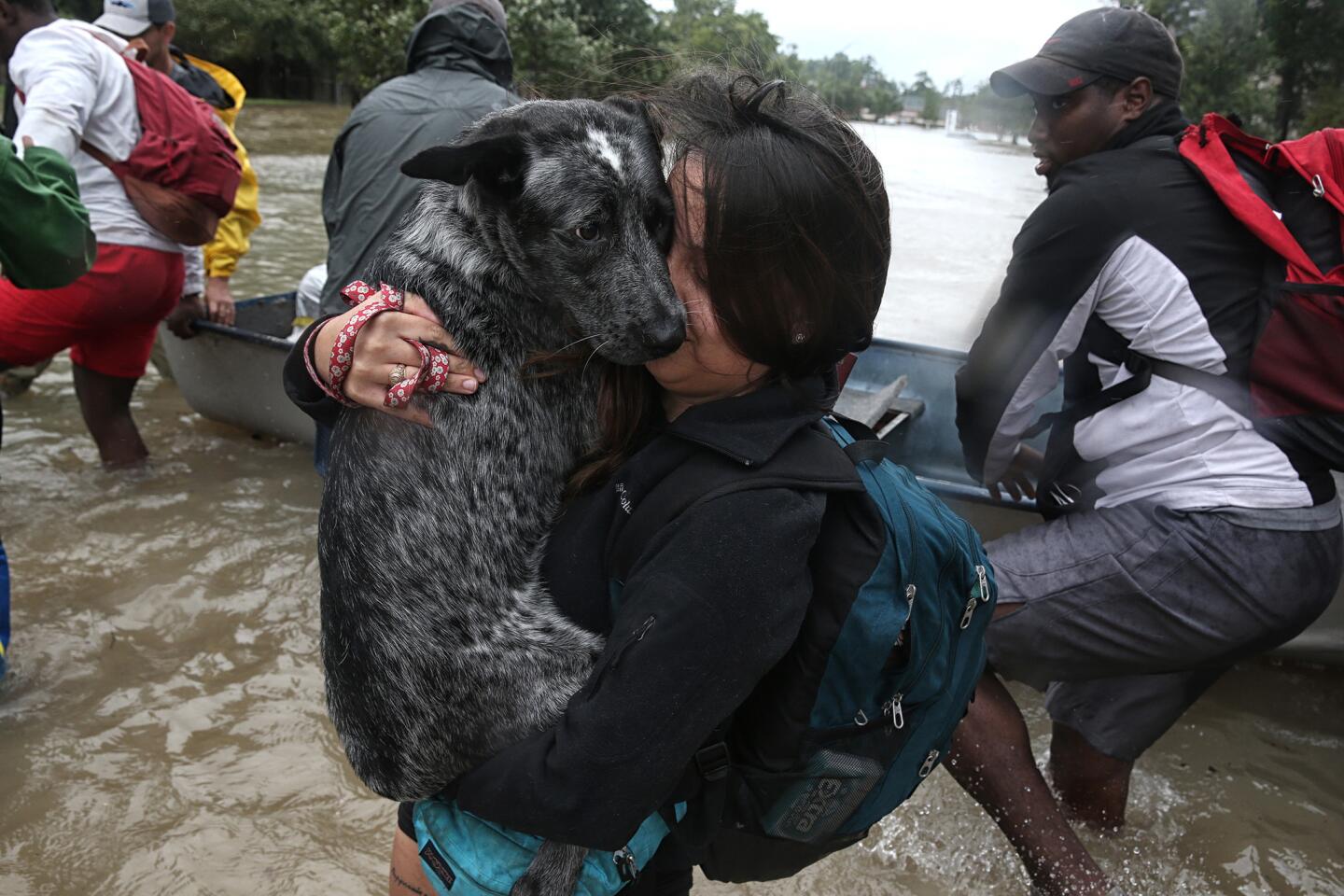
A woman carries a dog above the rising floodwaters near Addicks Reservoir.
(Robert Gauthier / Los Angeles Times)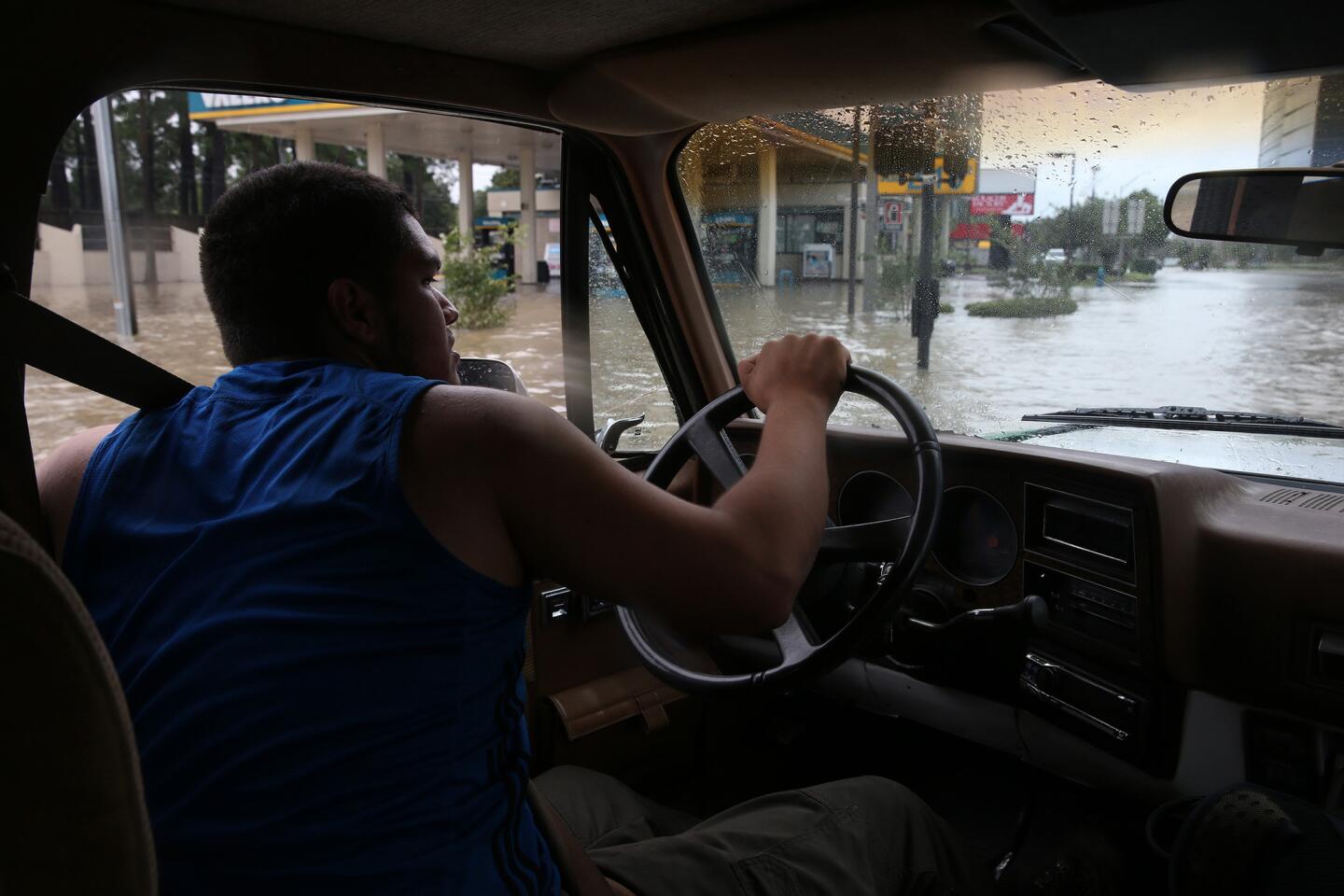
Eduardo Retiz, 21, drives his elevated pickup truck through a flooded street near Addicks Reservoir.
(Robert Gauthier / Los Angeles Times)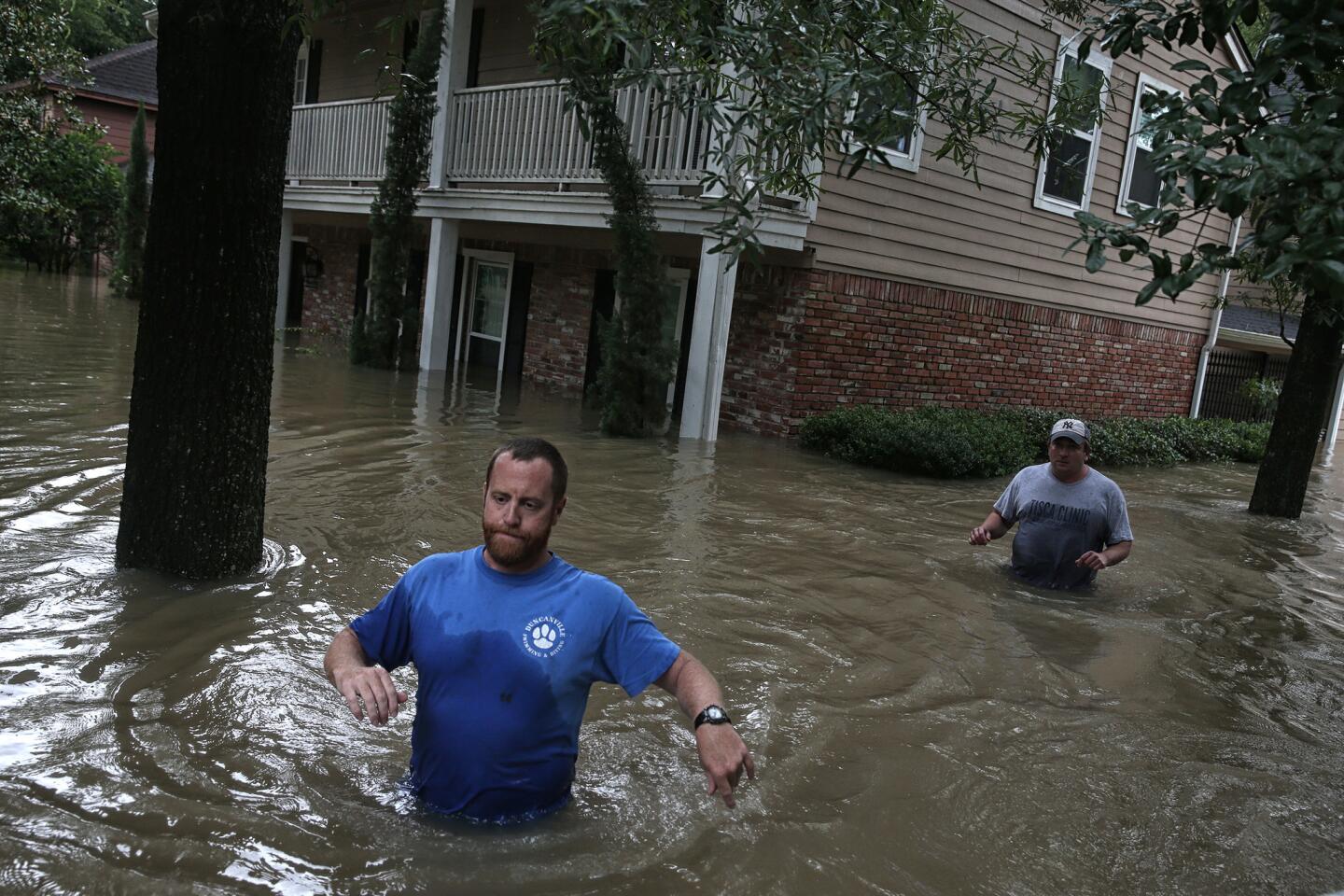
Mike Hoskovec, left, walks to a boat after helping friend Ben Berg, behind, move some photo albums to the second floor of his Nottingham Woods home.
(Robert Gauthier / Los Angeles Times)
Matthew Koser looks for important papers and heirlooms inside his grandfather’s house after it was flooded by heavy rains.
(Erich Schlegel / Getty Images)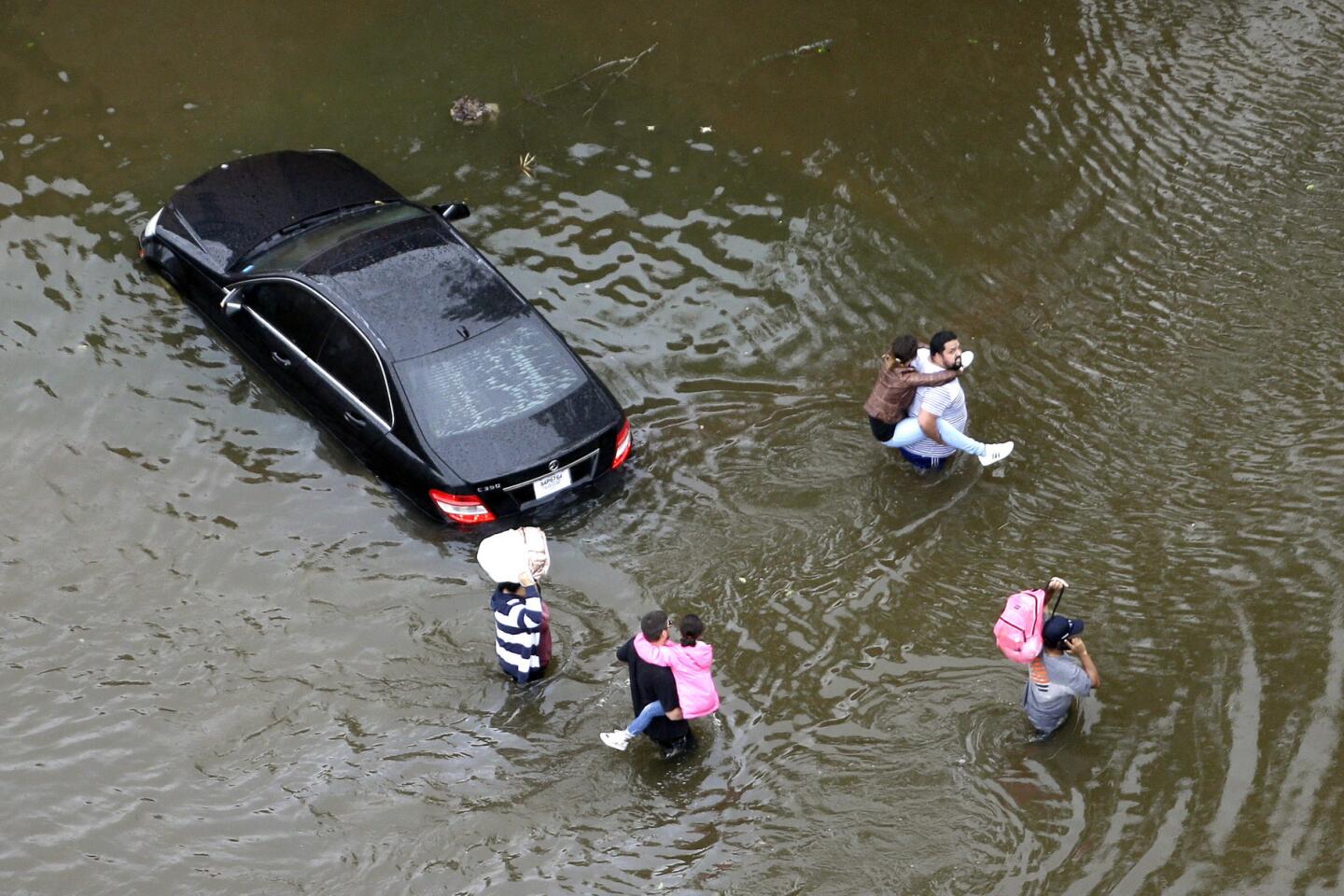
Residents wade through floodwaters as they evacuate their homes near the Addicks Reservoir Tuesday.
(David J. Phillip / Associated Press)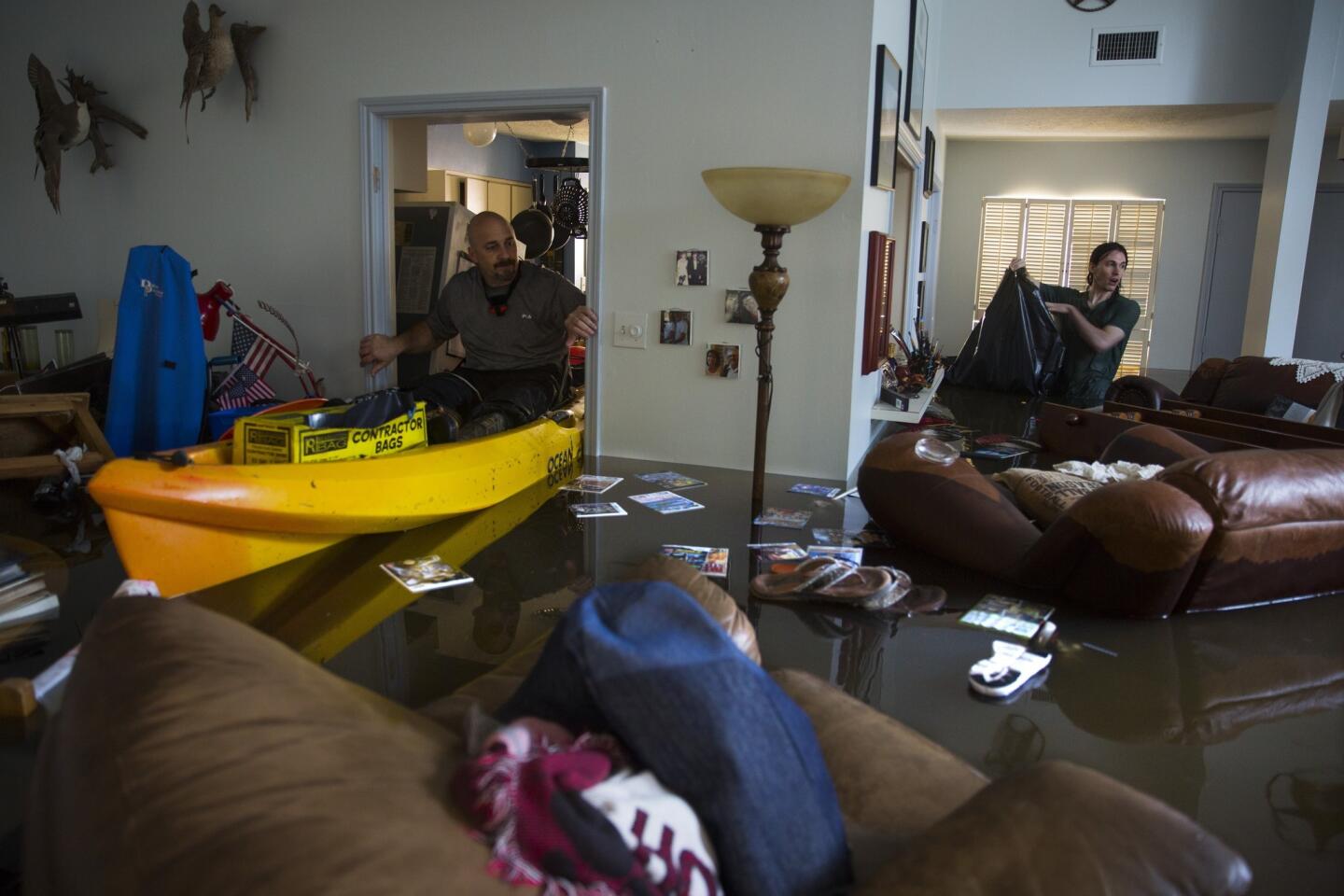
Larry Koser Jr., left and his son Matthew look for important papers and heirlooms inside Larry Koser Sr.’s house after it was flooded by heavy rains.
(Erich Schlegel / Getty Images)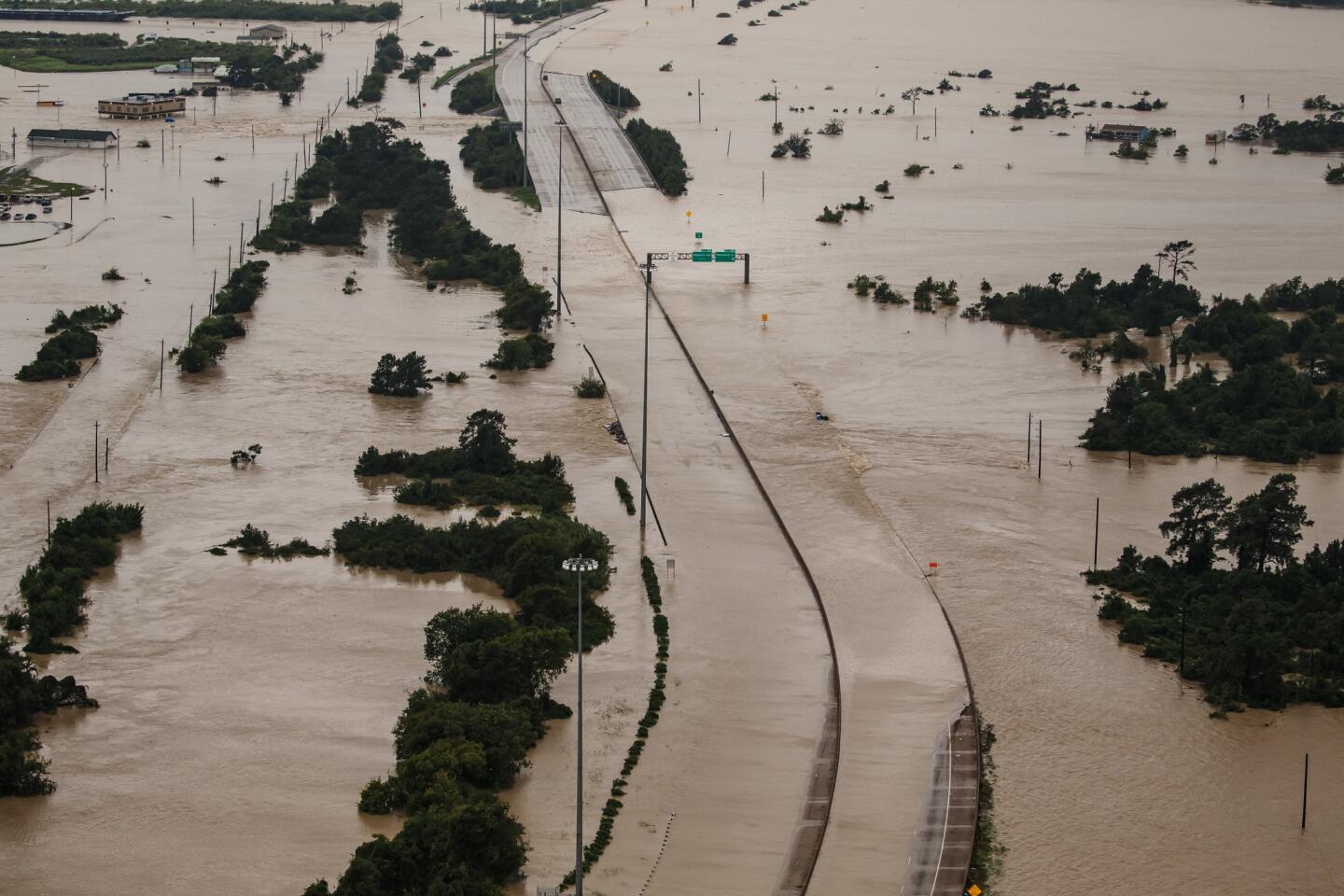
Portions of Interstate 10 remain flooded in Houston, Texas.
(Marcus Yam / Los Angeles Times)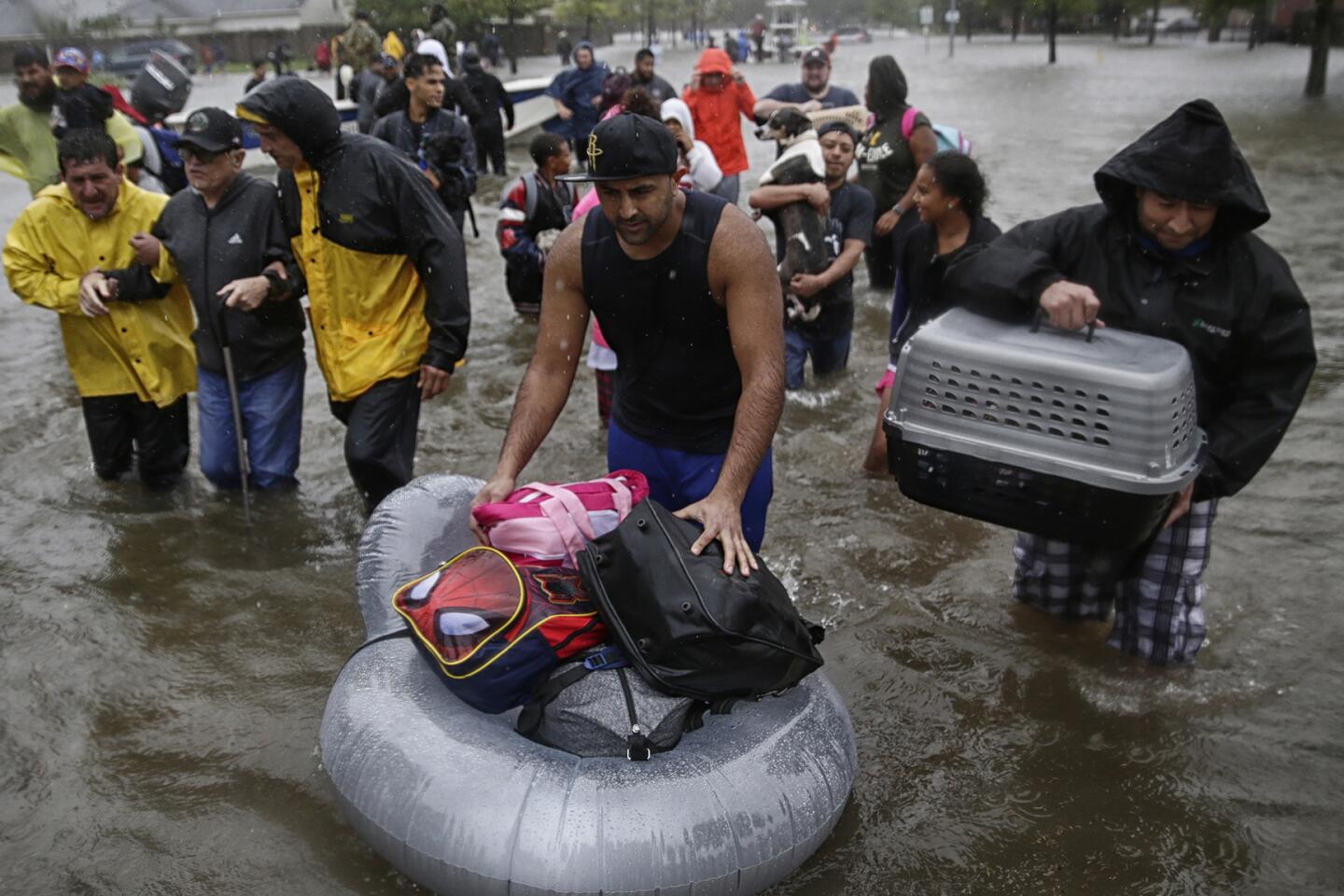
Rising flood waters stranded hundreds of residents of Twin Oaks Village in Clodine.
(Robert Gauthier / Los Angeles Times)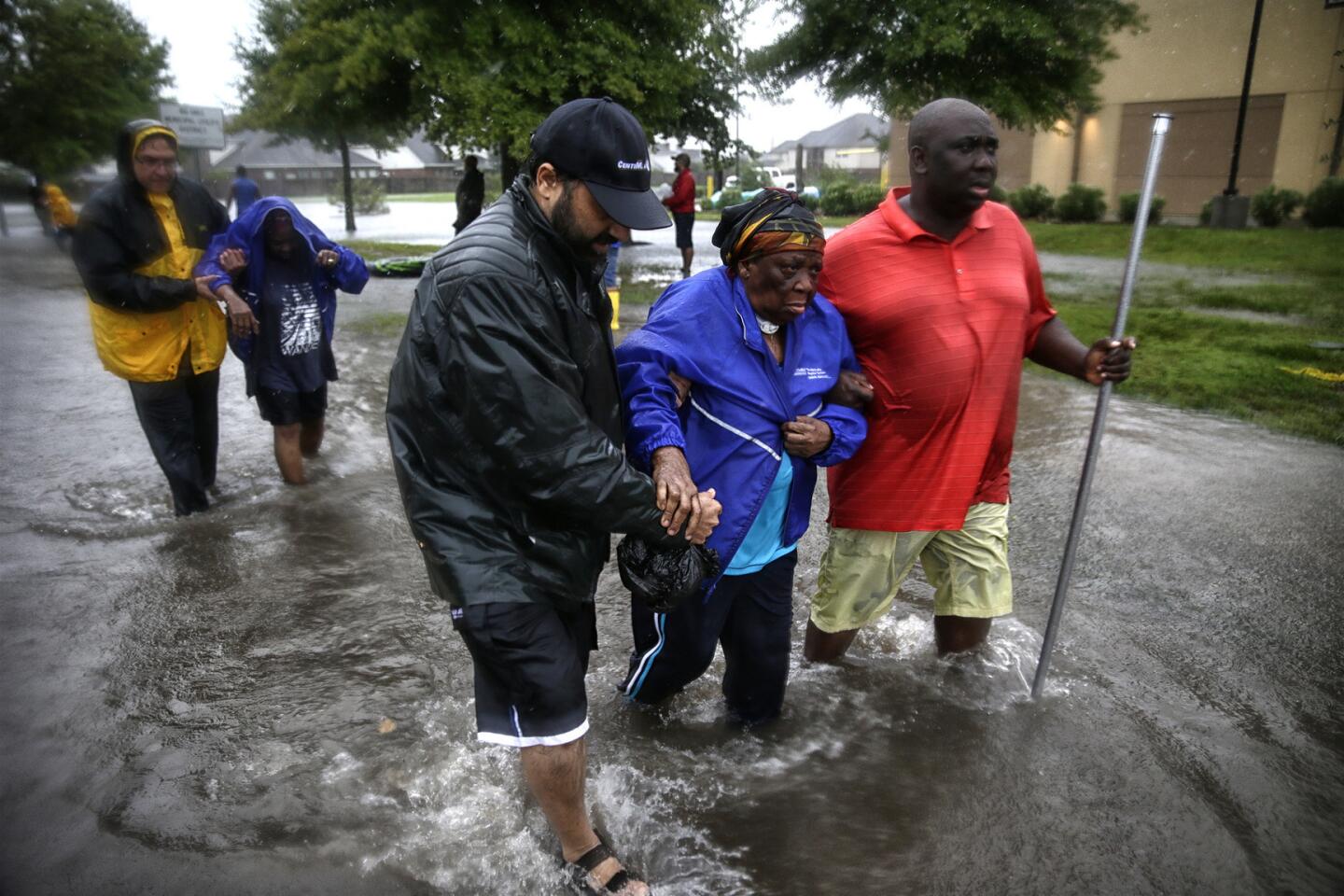
Comfort Morgan is helped to dry land after being rescued from her flooded home in Twin Oaks Village in Clodine.
(Robert Gauthier / Los Angeles Times)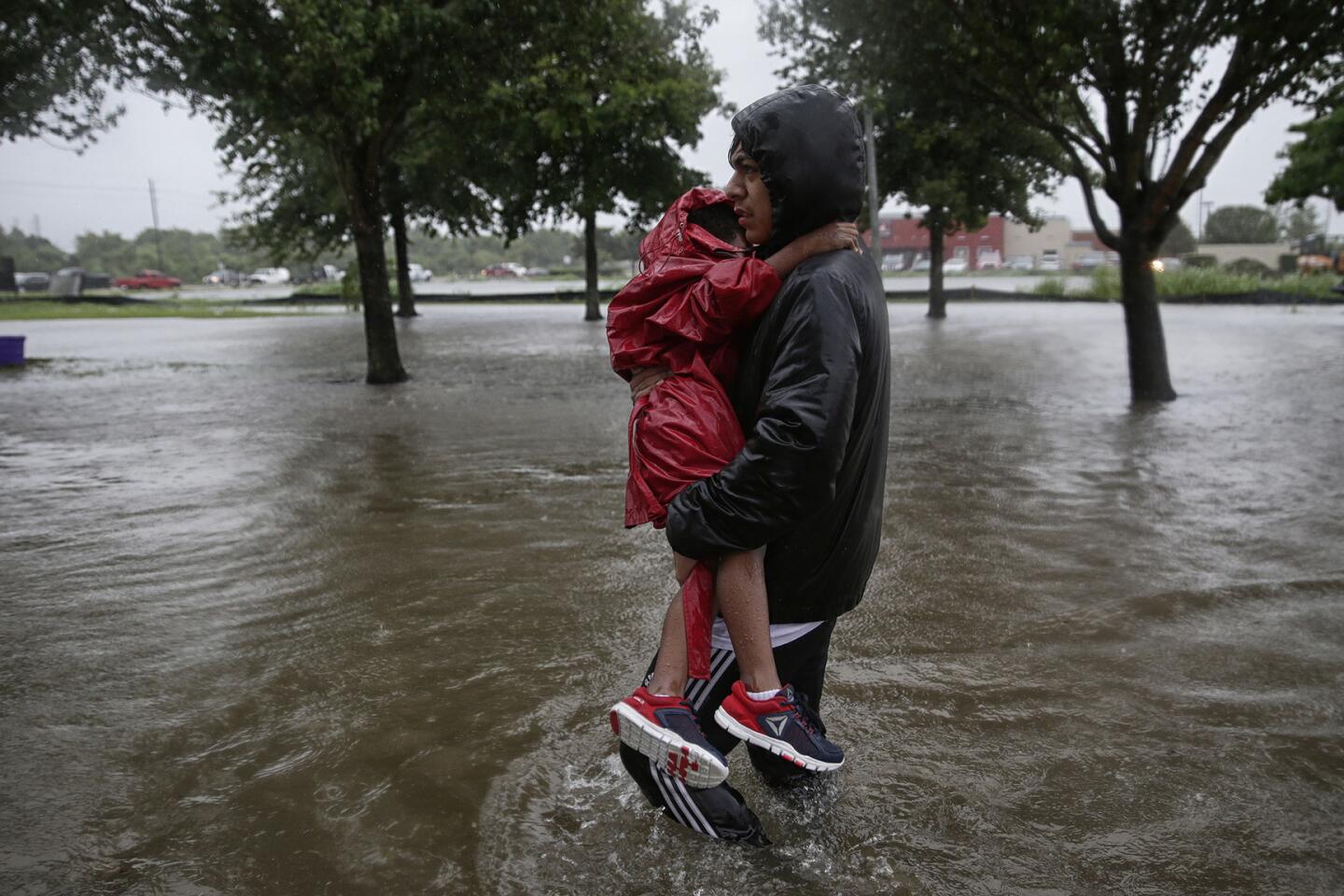
Rising flood waters stranded hundreds of residents of Twin Oaks Village in Clodine, where a collection of small boat owners, including some with pool toys, coordinated to bring most to dry ground.
(Robert Gauthier / Los Angeles Times)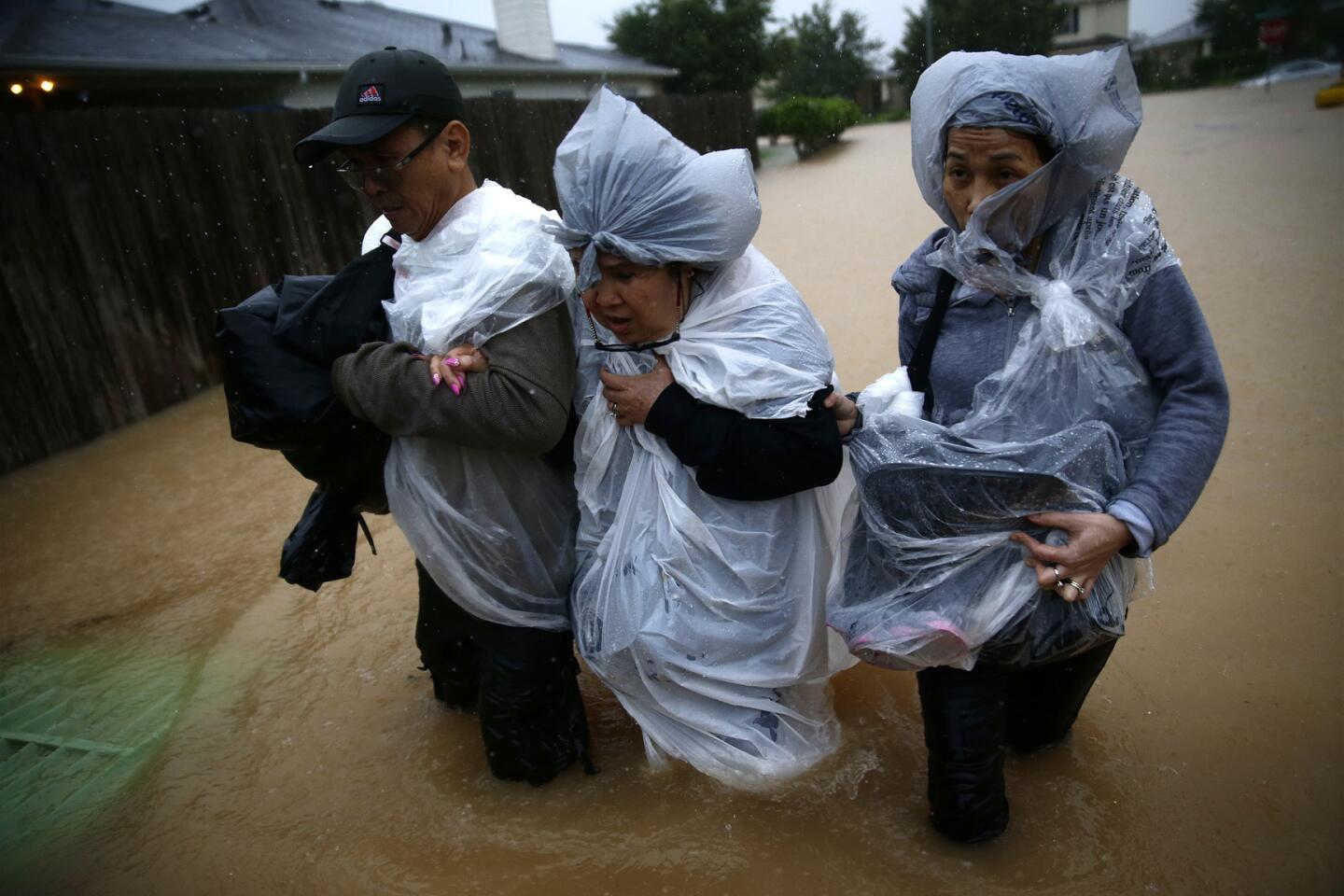
Rising flood waters stranded hundreds of residents of Twin Oaks Village in Clodine, where an collection of small boat owners coordinated to bring most to dry ground.
(Robert Gauthier / Los Angeles Times)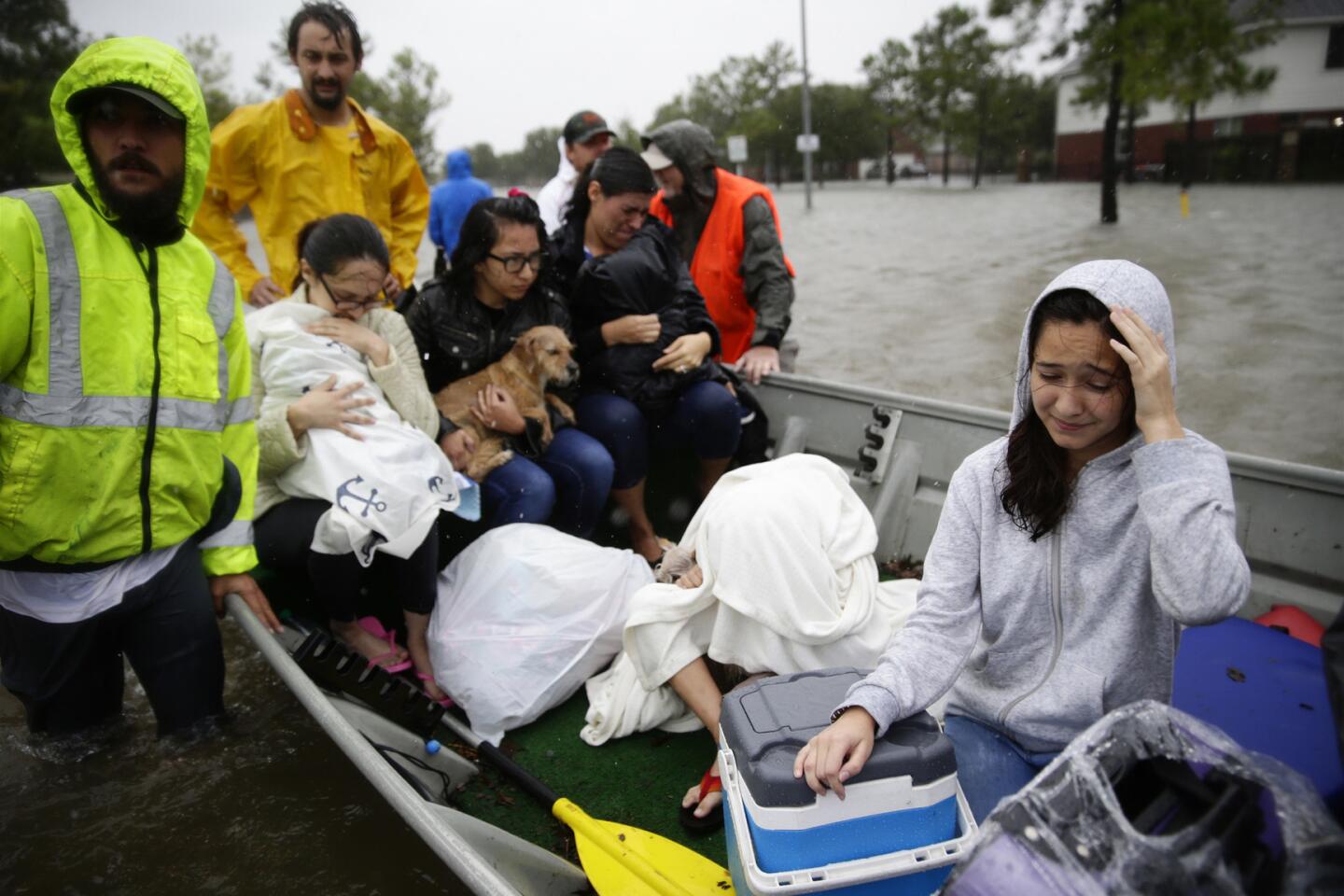
Hundreds of residents of Twin Oaks Village are evacuated in Clodine Monday.
(Robert Gauthier / Los Angeles Times)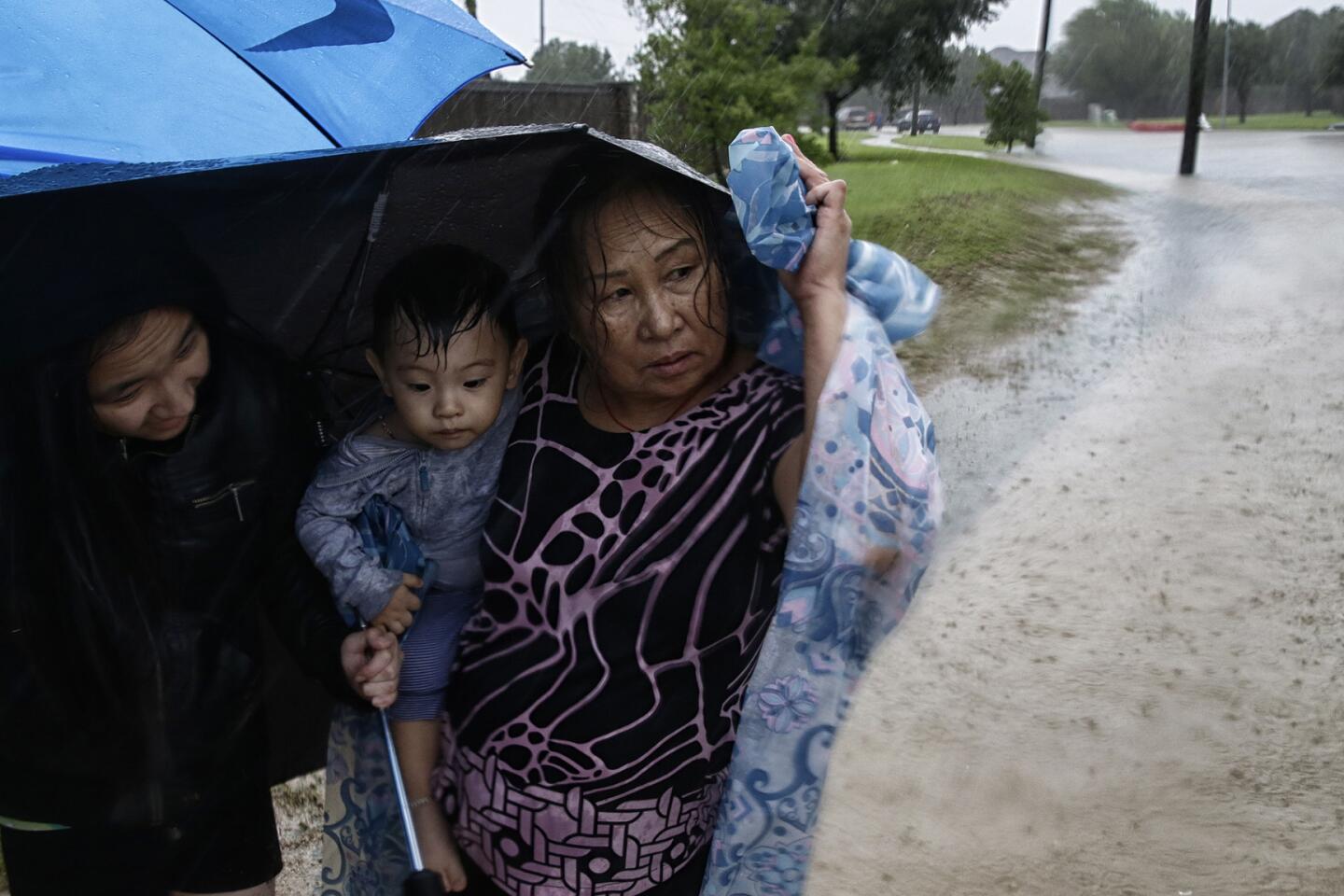
Residents are stranded at Twin Oaks Village in Clodine due to rising flood water.
(Robert Gauthier / Los Angeles Times)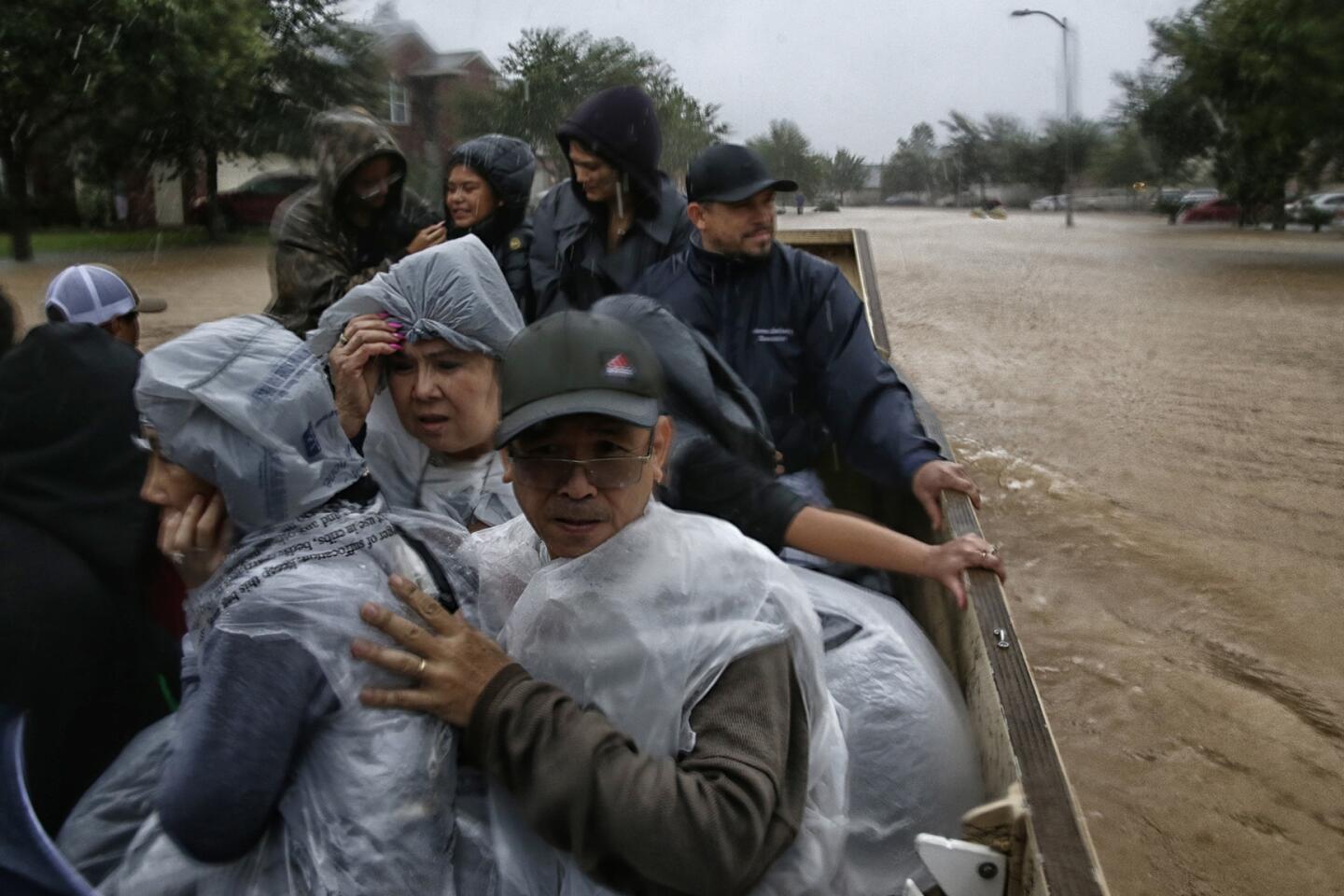
Stranded residents of Twin Oaks Village in Clodine are evacuated from the rising flood water.
(Robert Gauthier / Los Angeles Times)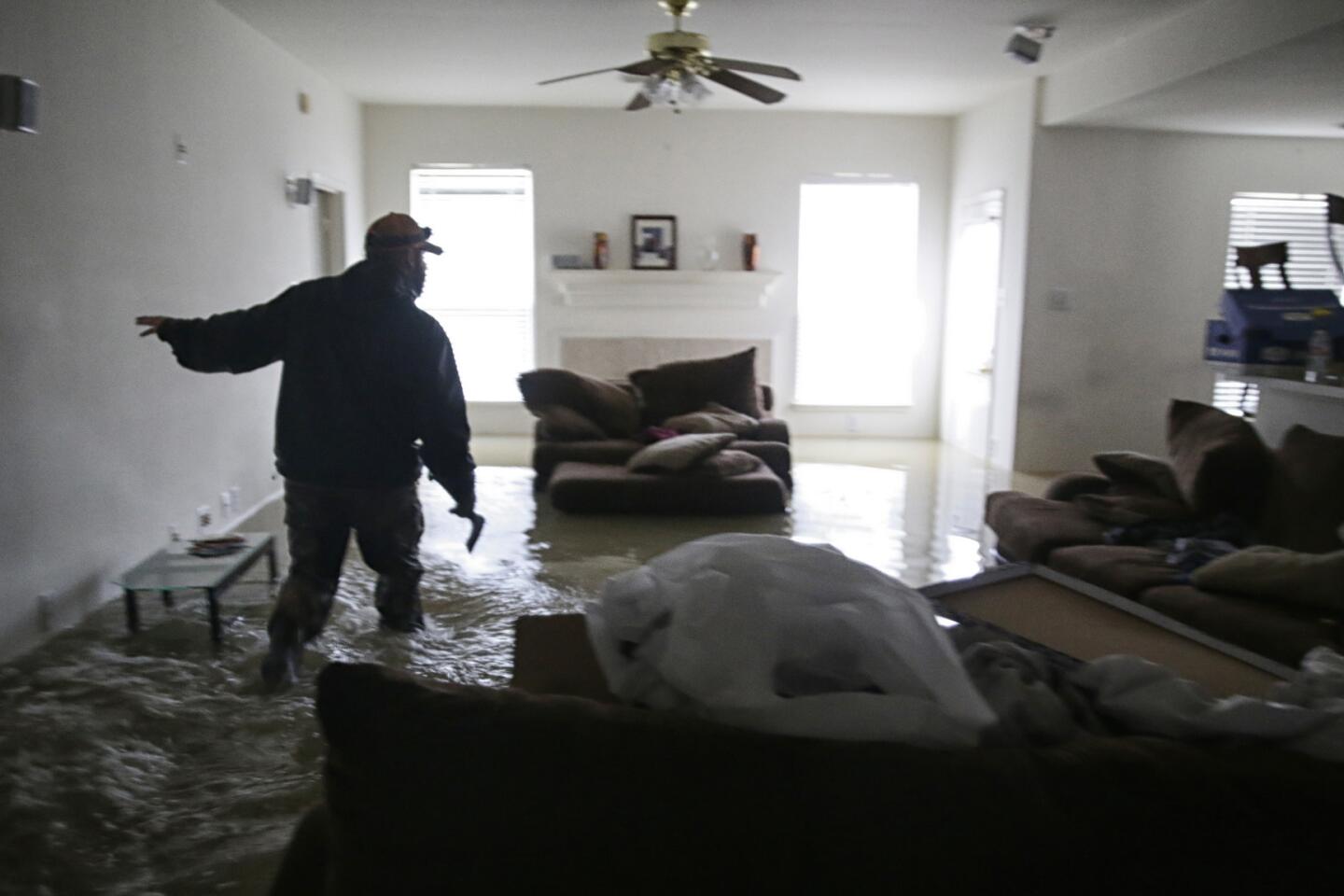
Jan Tullos, 32, searches a flooded home for an injured woman who was reportedly stranded inside in Clodine, Texas. The home was empty.
(Robert Gauthier / Los Angeles Times)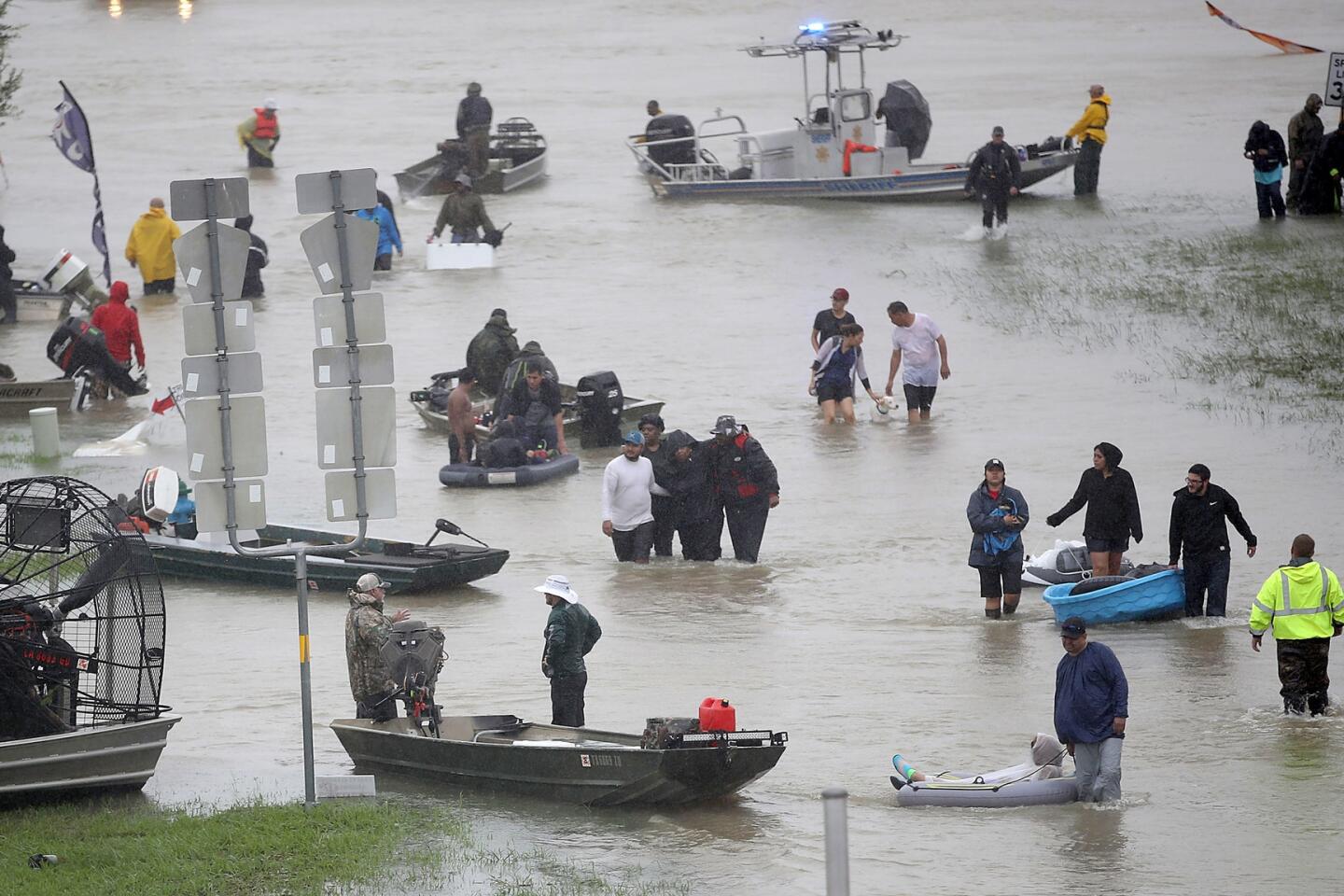
People walk down a flooded Houston street as they evacuate their homes after the area was inundated with rains from Tropical Storm Harvey.
(Joe Raedle / Getty Images)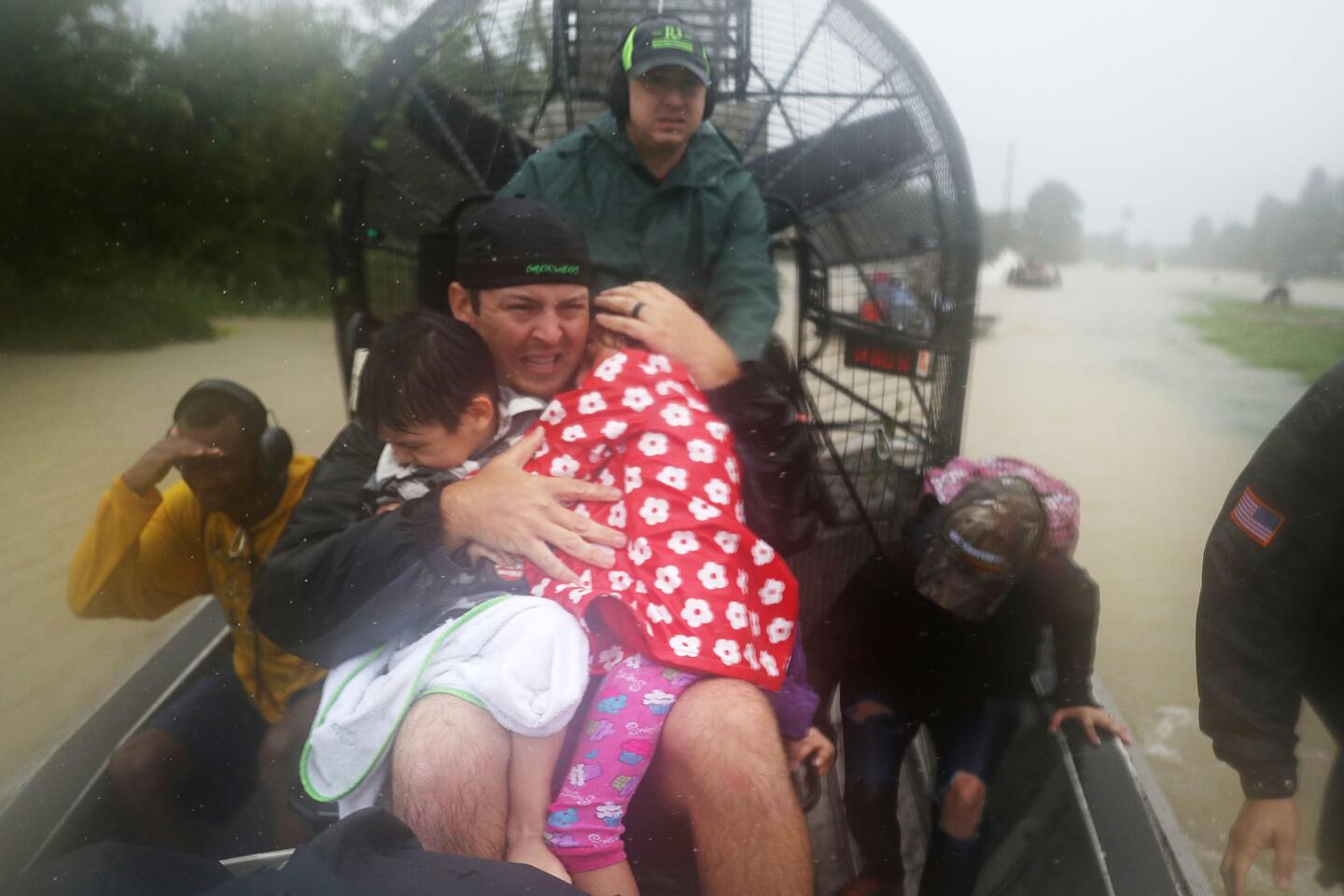
Dean Mize holds children as he and Jason Legnon use an airboat to rescue people from flooded homes in Houston on Monday.
(Joe Raedle / Getty Images)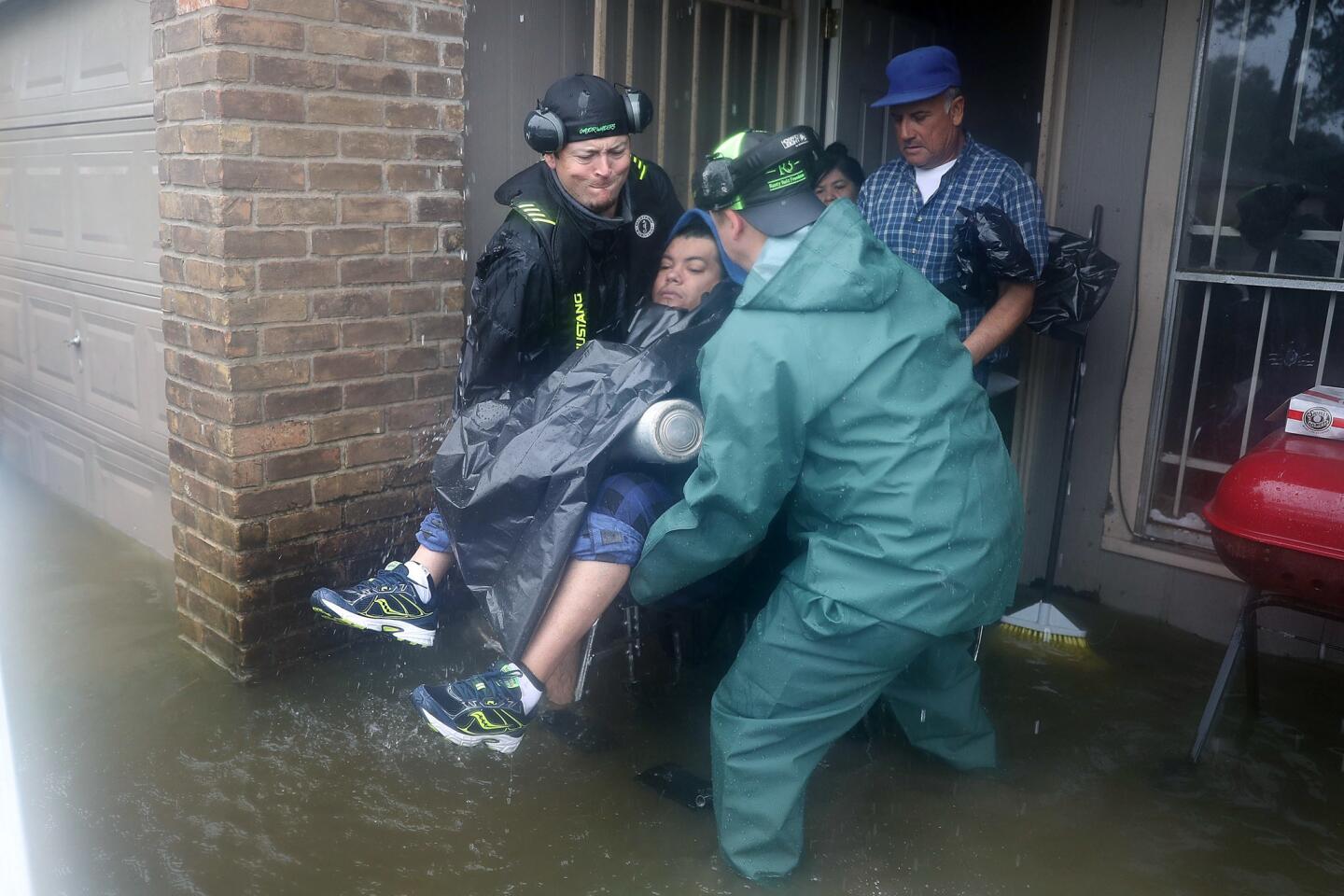
Dean Mize, left and Jason Legnon carry a person to an airboat as they rescue people in Houston.
(Joe Raedle / Getty Images)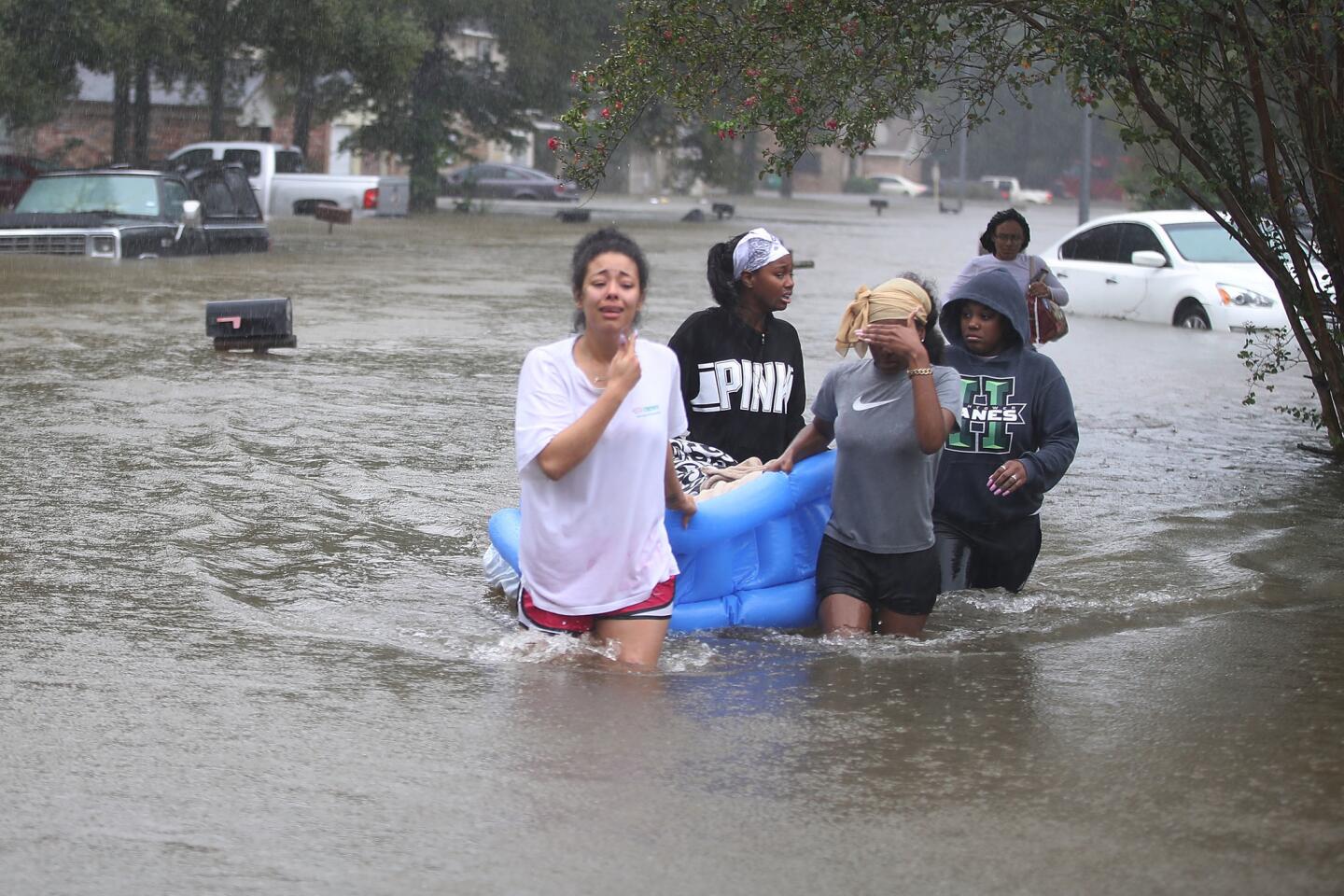
Evacuees walk down a flooded street after leaaving their homes Monday in Houston.
(Joe Raedle / Getty Images)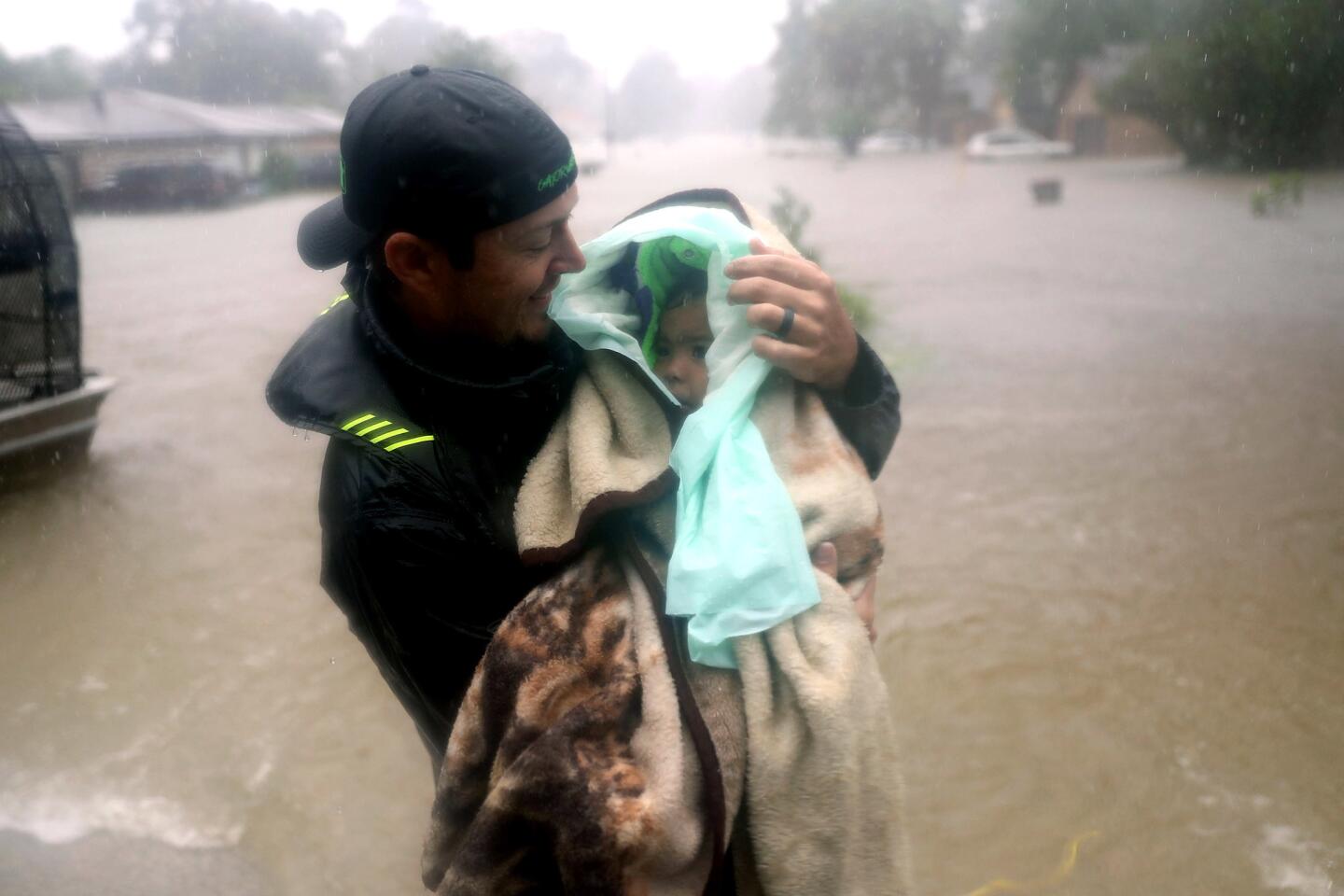
Dean Mize holds a child as he helps evacuate people in Houston as Tropical Storm Harvey continues to drench southeastern Texas and Louisiana with heavy rains and surging floodwaters.
(Joe Raedle / Getty Images)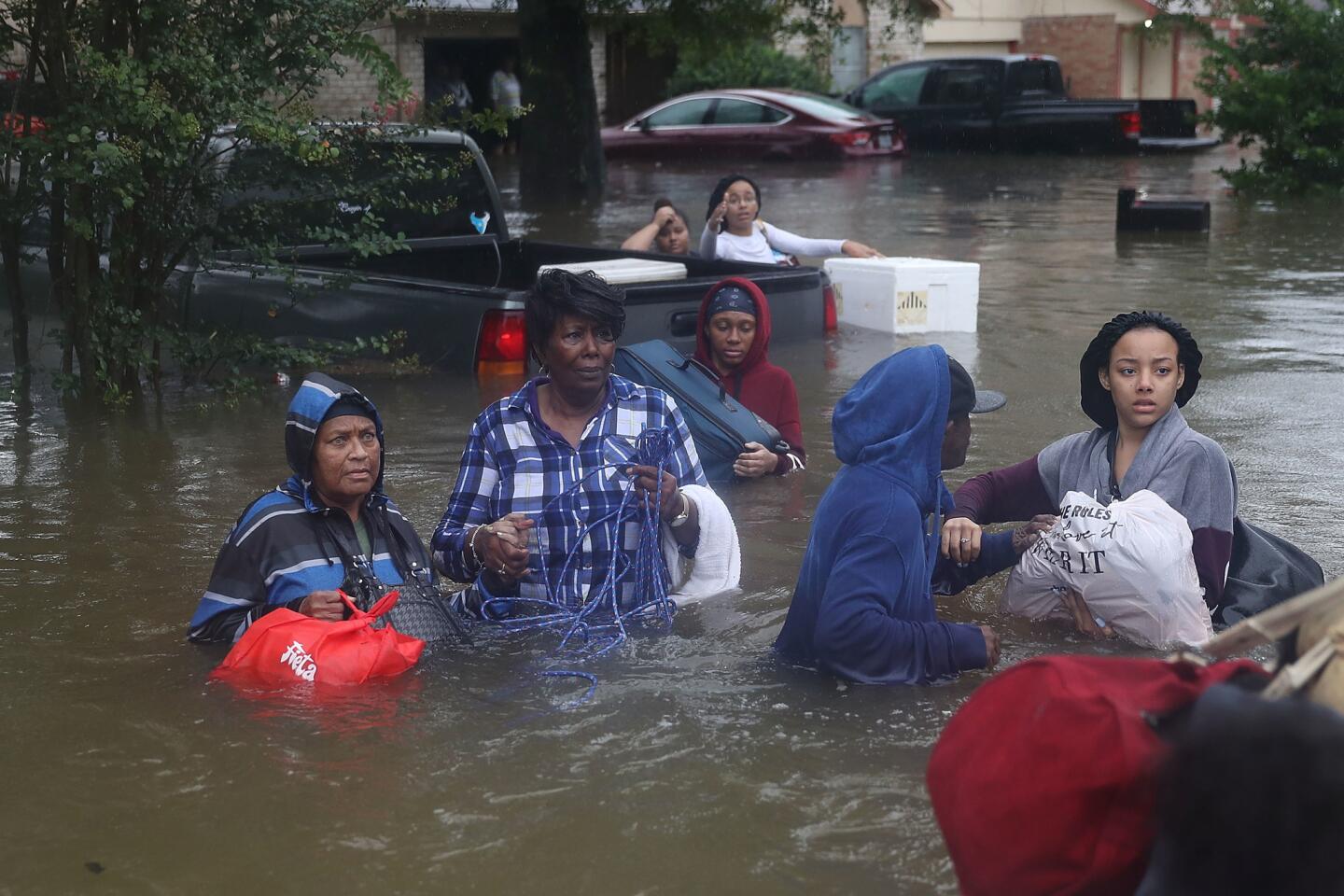
People evacuate their flooded homes on Monday in Houston. By Monday morning, 911 operators had received 56,000 calls, city officials said.
(Joe Raedle / Getty Images)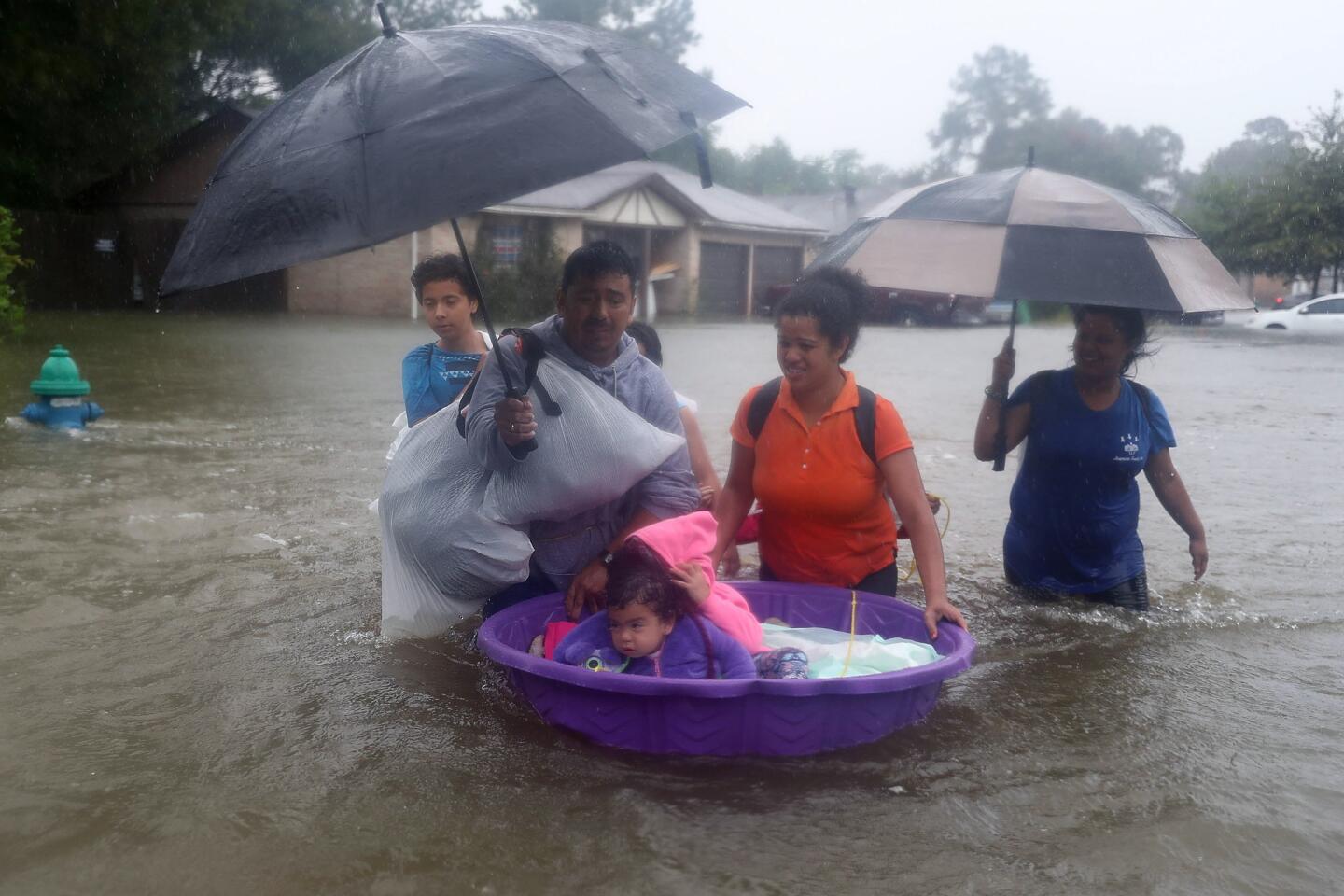
Adults use a kiddie pool to transport children as they evacuate on Monday.
(Joe Raedle / Getty Images)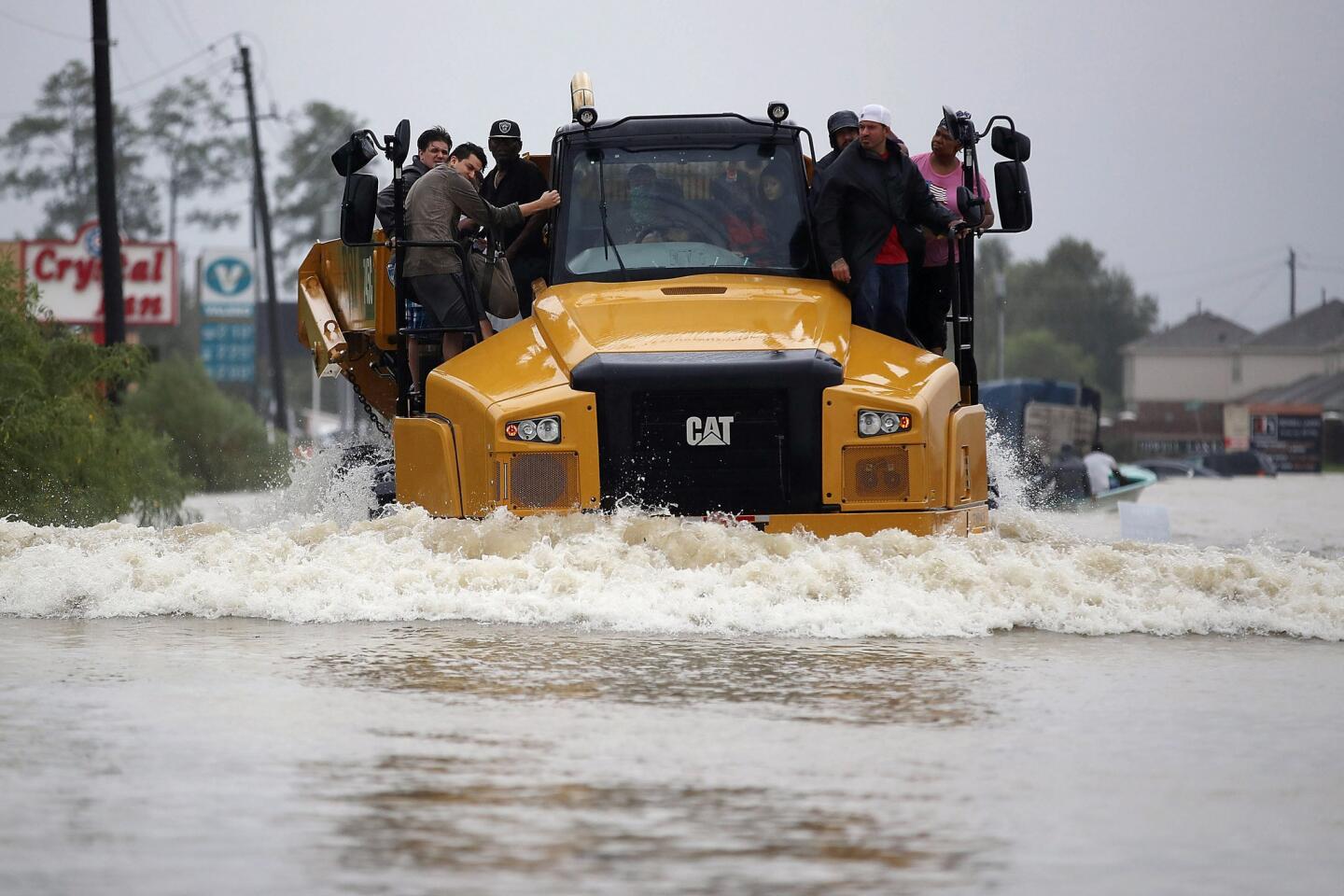
People catch a ride on a construction vehicle down a flooded Houston street.
(Joe Raedle / Getty Images)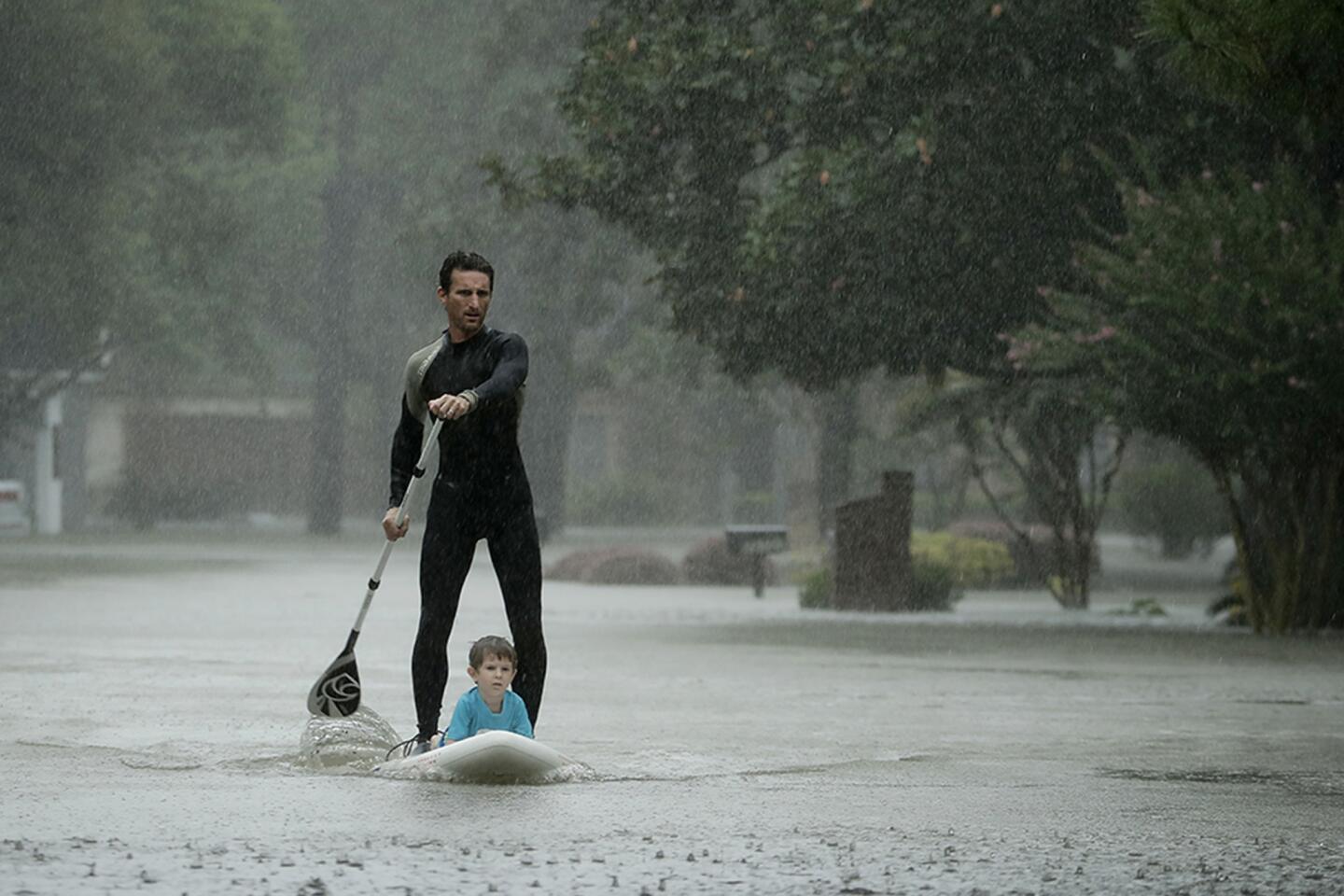
Alexendre Jorge evacuates Ethan Colman, 4, from a Houston neighborhood inundated by floodwaters from Tropical Storm Harvey.
(Charlie Riedel / AP)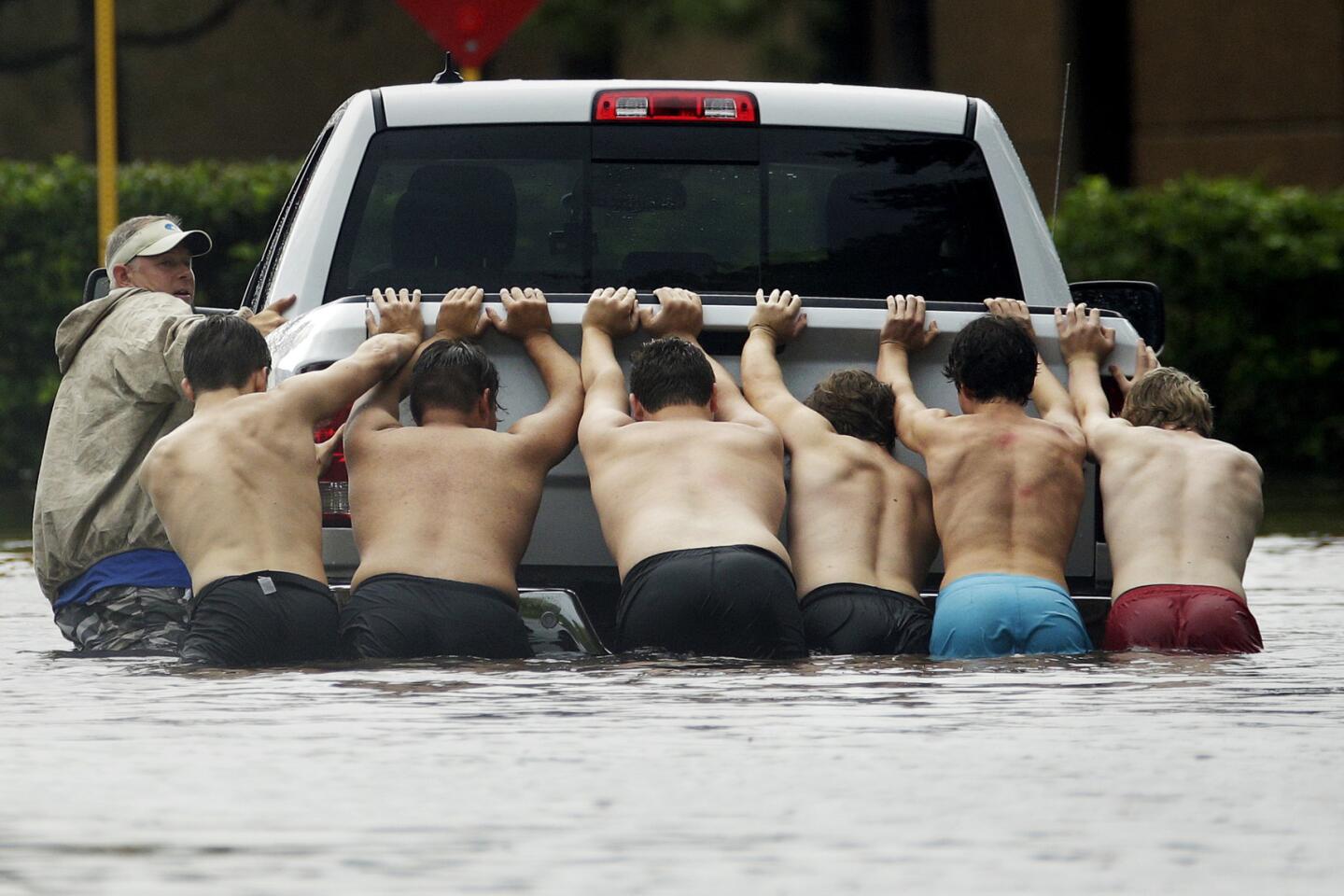
People push a stalled pickup to through a flooded street in Houston on Sunday, as Tropical Storm Harvey dumped heavy rains.
(Charlie Riedel / Associated Press)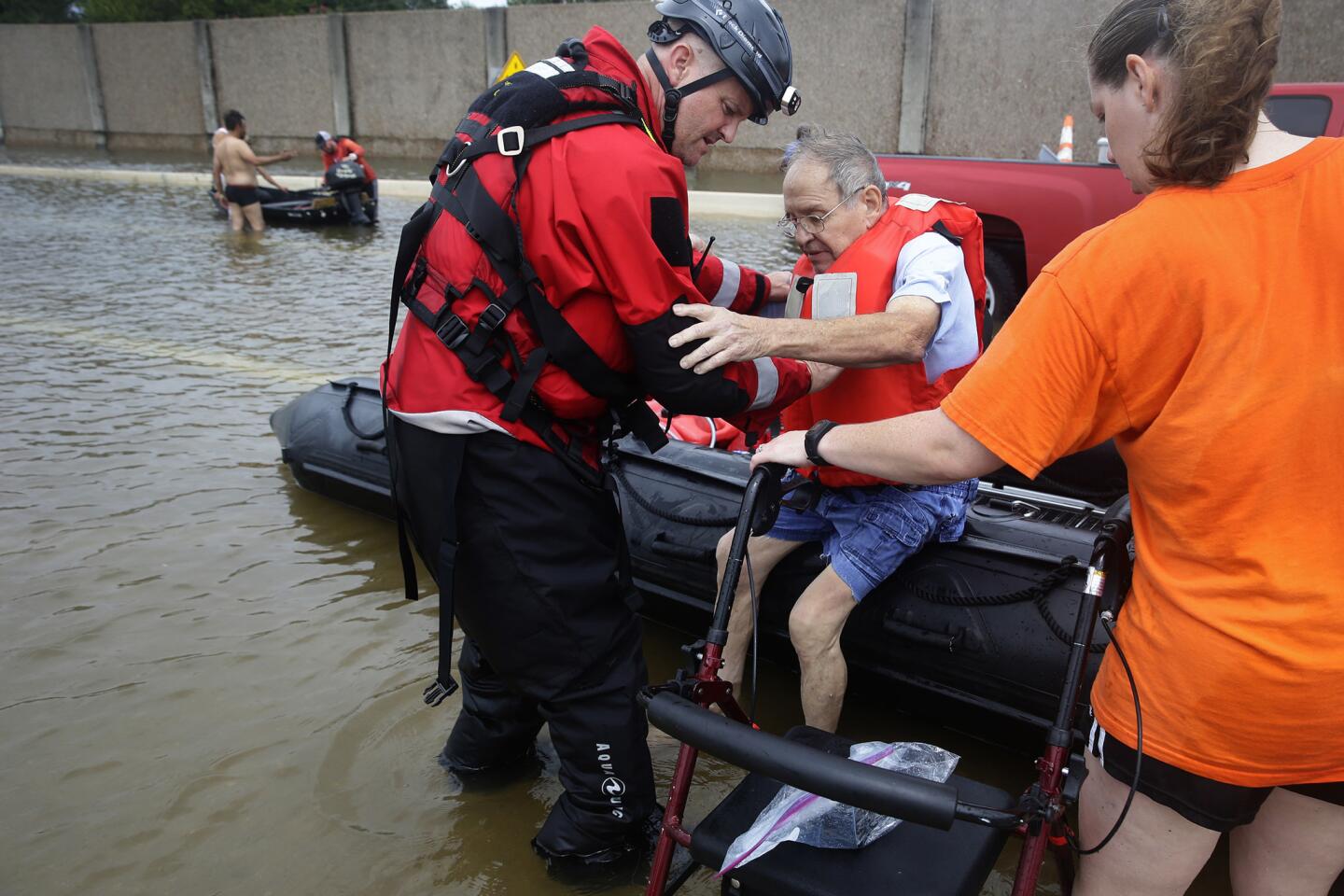
A Houston police officer helps Frank Andrews, 74, into his walking chair after rescuing him from his flooded home in the Braeswood Place neighborhood, southwest of Houston, on Sunday.
(Robert Gauthier / Los Angeles Times)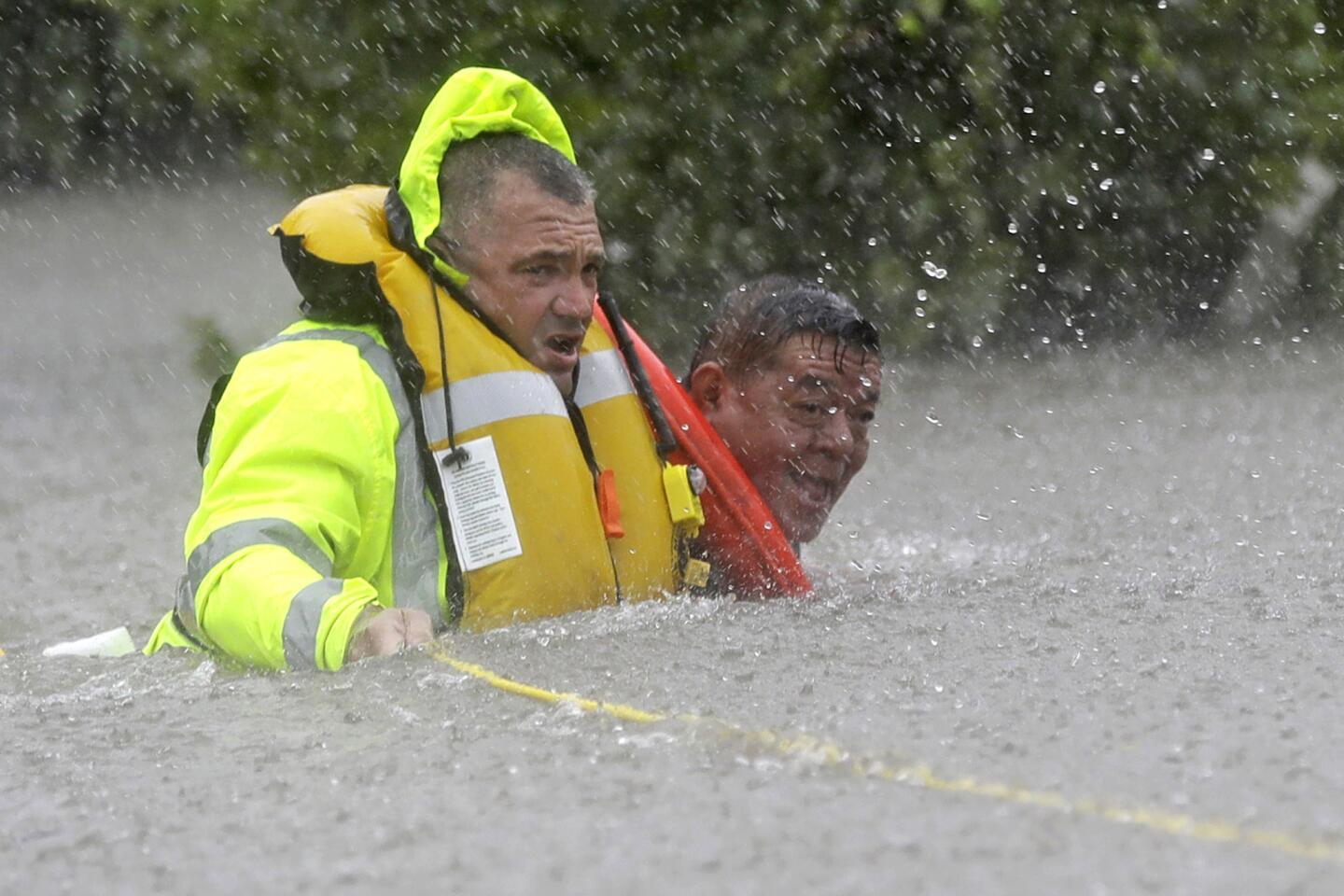
Wilford Martinez, right, is rescued from his flooded car by Harris County Sheriff’s Department Richard Wagner along Interstate 610 in Houston, Texas.
(David J. Phillip / Associated Press)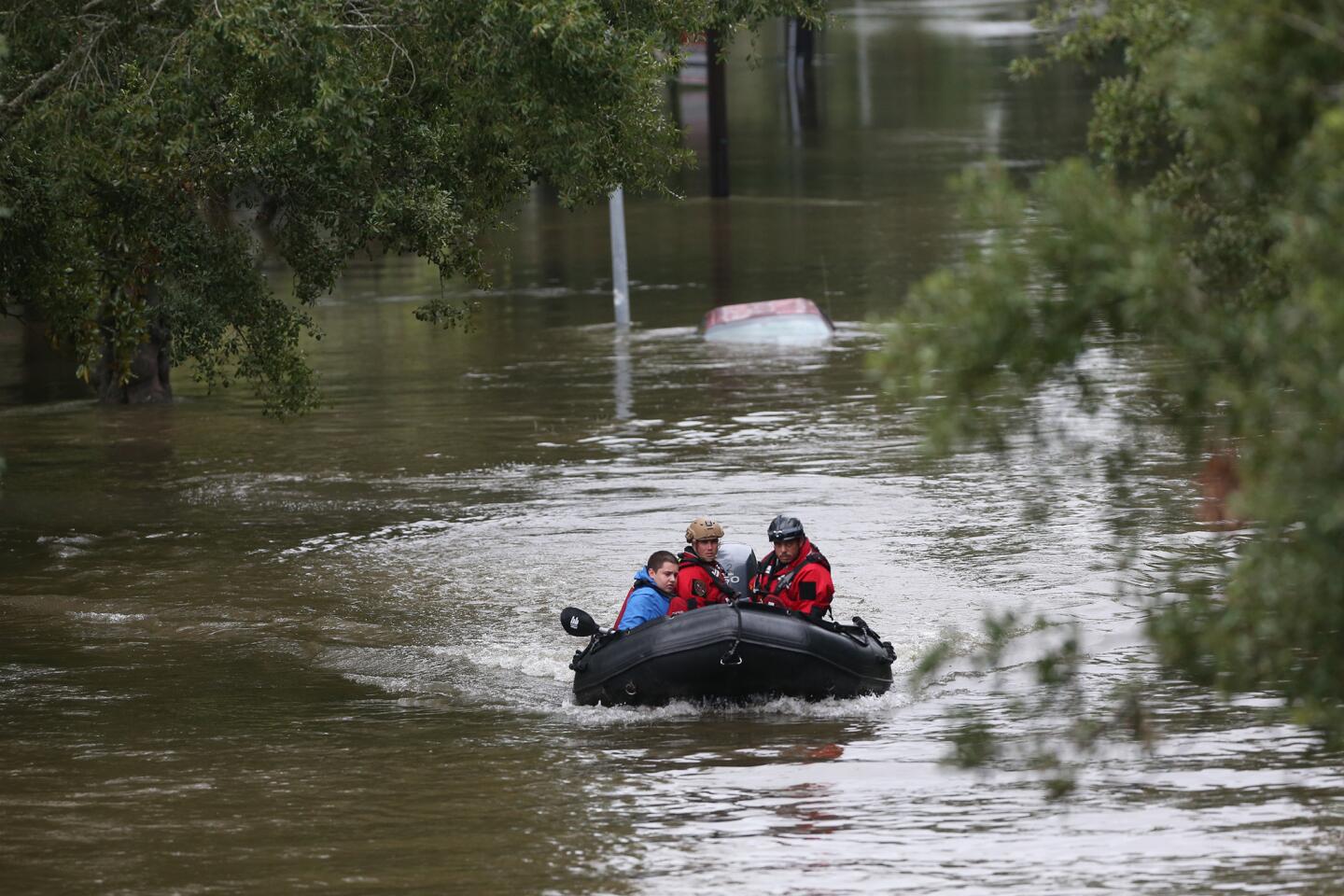
Daniel Gross, 15, is rescued by Houston police after he was stranded on top of his car in southwest Houston.
(Robert Gauthier / Los Angeles Times)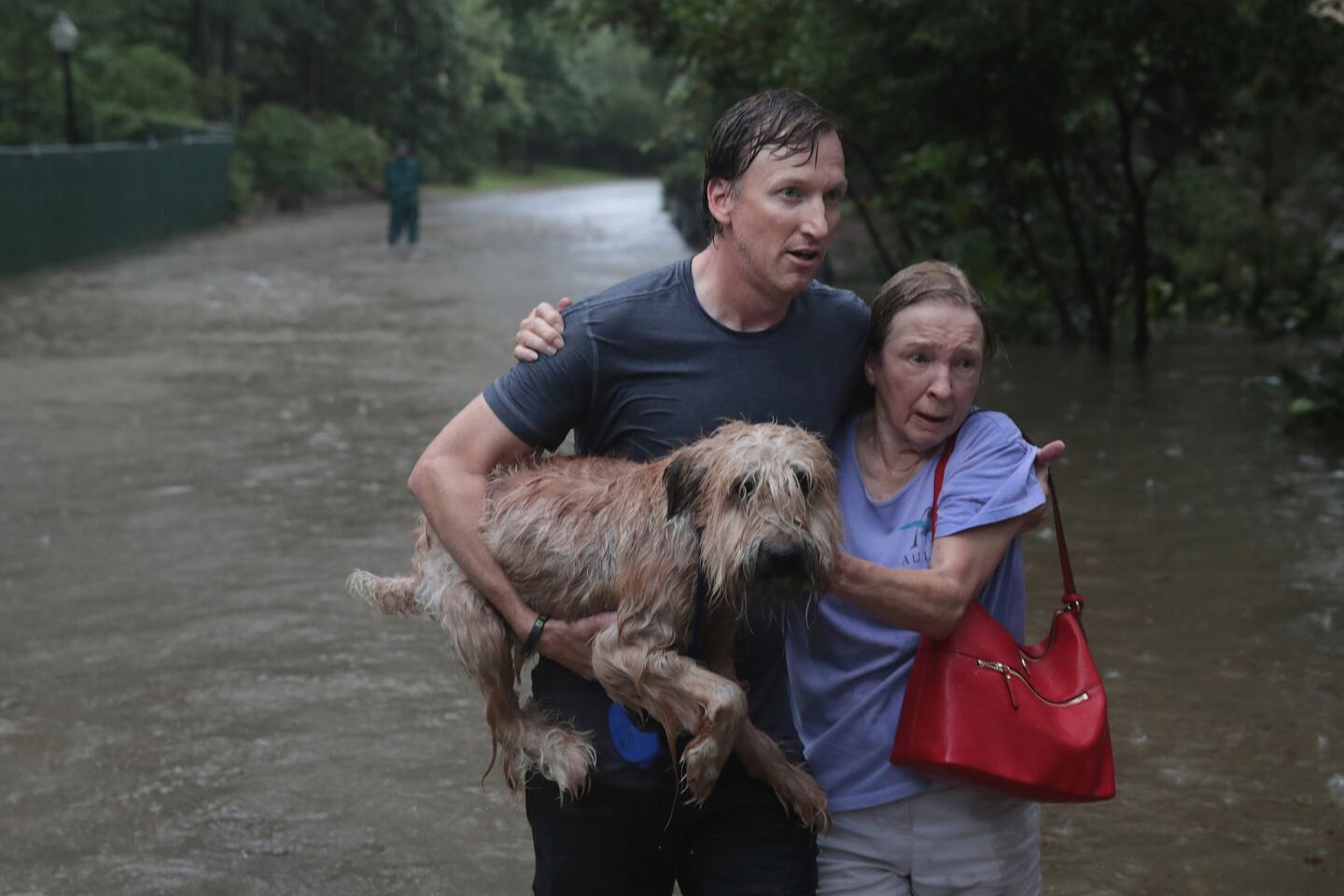
Andrew White, left, helps a neighbor down a street after rescuing her from her home in his boat in the upscale River Oaks neighborhood after it was inundated with flooding from Tropical Storm Harvey.
(Scott Olson / Getty Images)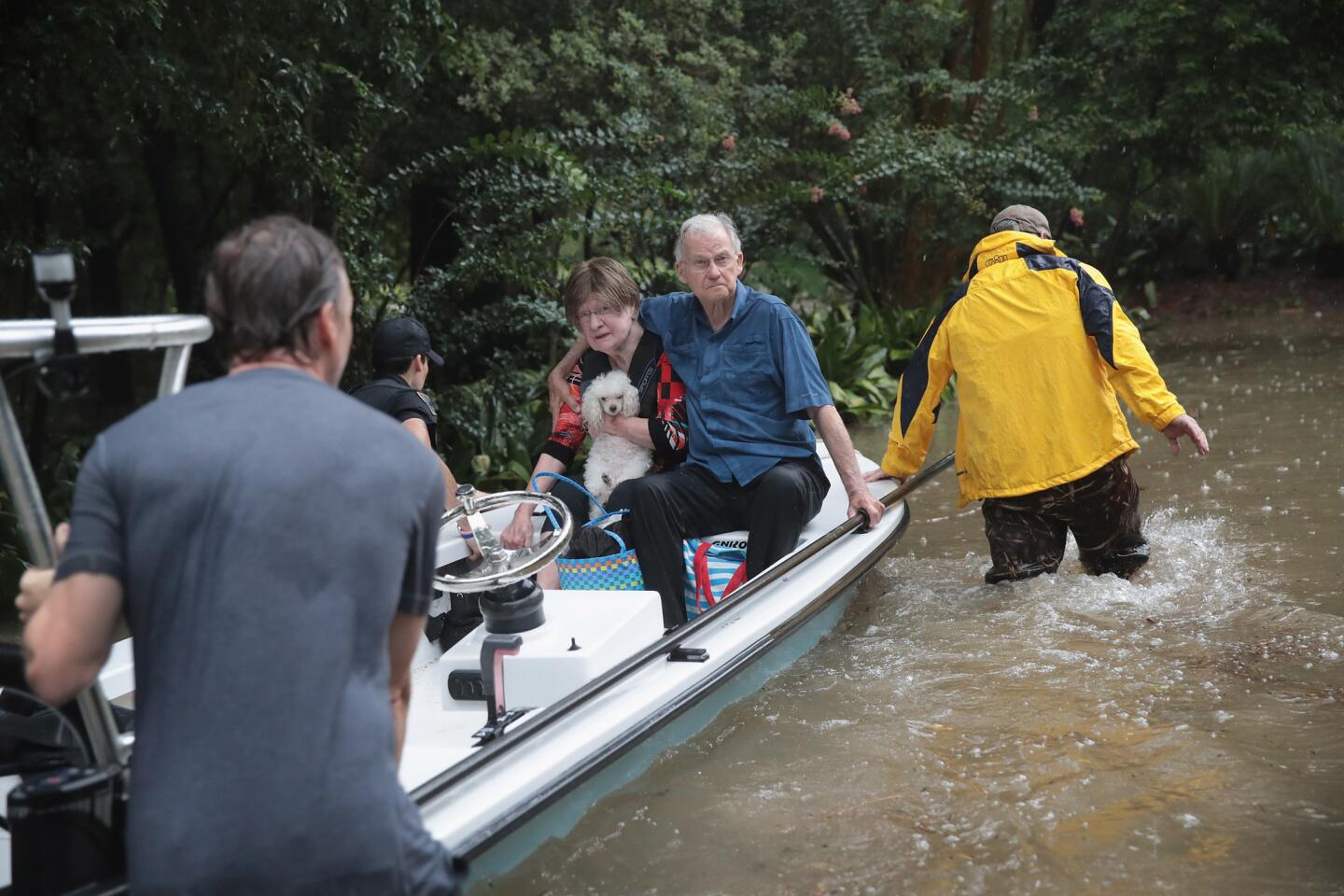
Volunteers and officers from the neighborhood security patrol help rescue residents in Houston’s River Oaks neighborhood Sunday.
(Scott Olson / Getty Images)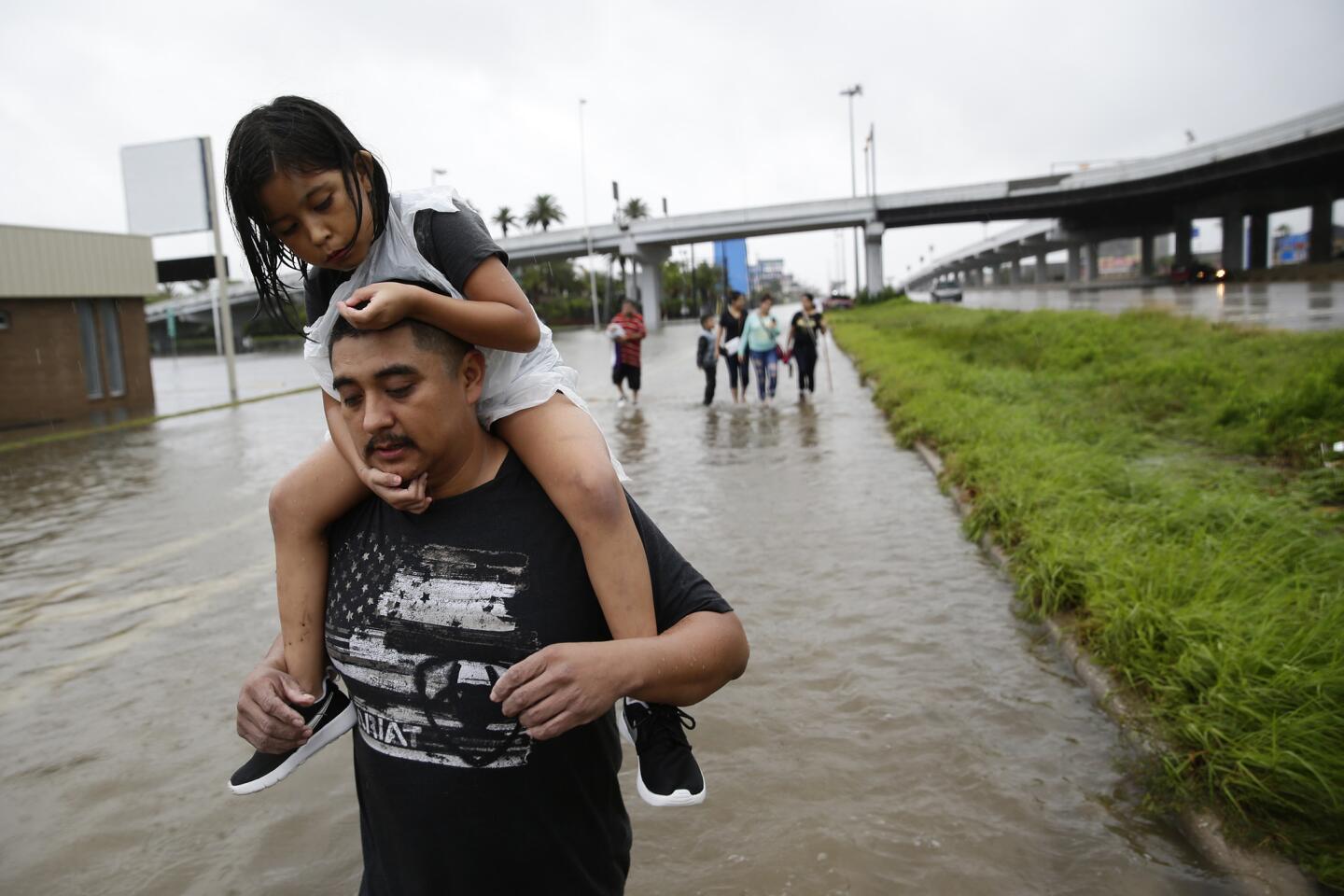
Jesus Nunez carries his daughter Genesis, 6, as he and numerous family members flee their flooded home, walking nearly four hours to the safety of a relative’s house on Sunday.
(Robert Gauthier / Los Angeles Times)Since Hurricane Harvey reached land in Texas, the ensuing flooding has forced the delay or cancellation of more than 12,000 flights across the U.S., mostly in hardest-hit Houston and nearby airports.
From Saturday through Monday morning, the storm delayed 7,547 flights across the country and forced the cancellation of 4,539 flights, according to the monitoring site FlightAware.com.
A vast majority of those delays and cancellations have been for flights in and out of George Bush Intercontinental Airport in Houston. As of Monday morning, access to the airport for travelers and airline staff has been hampered by flooded streets.
Harvey — which has dwindled into a tropical storm — has sent ripples throughout the nation’s air transport system. More than 110 flights from Hartsfield-Jackson Atlanta International Airport were canceled or delayed Monday morning, as were nearly 100 flights from Los Angeles International Airport.
The storm has ravaged a swath of the Gulf Coast, but its effect on airline service has been moderate compared with natural disasters that have hit the East Coast, which is home to the nation’s busiest airspace.
In 2012, Superstorm Sandy hit the East Coast, forcing the cancellation of more than 18,000 flights in a five-day period, with thousands of other flights delayed nationwide. Hurricane Irene forced the cancellation of about 15,000 flights, plus many delays, in August 2011.
ALSO
Harvey’s toll: 30,000 expected in Houston shelters, 450,000 may need disaster help
Houston area bookstore opens its doors to Texans battered by Tropical Storm Harvey
UPDATES:
3:25 p.m.: This story was updated to include the latest delays and cancellations caused by Tropical Storm Harvey.
This article originally posted at 11:35 a.m.
Inside the business of entertainment
The Wide Shot brings you news, analysis and insights on everything from streaming wars to production — and what it all means for the future.
You may occasionally receive promotional content from the Los Angeles Times.
Hugo Martín is an assistant editor on the Fast Break Desk, the Los Angeles Times’ breaking news team. He has been a journalist with the Los Angeles Times for more than 30 years, covering politics, transportation, travel, business and the outdoors. A native Californian, Martín was part of the Metro staff that won Pulitzer Prizes in 1993, 1995 and 1998. He is an avid outdoorsman, a proud father and die-hard Lakers fan.

